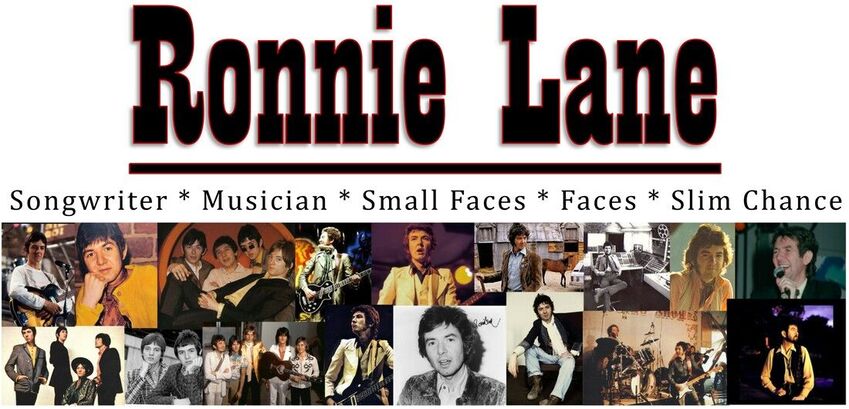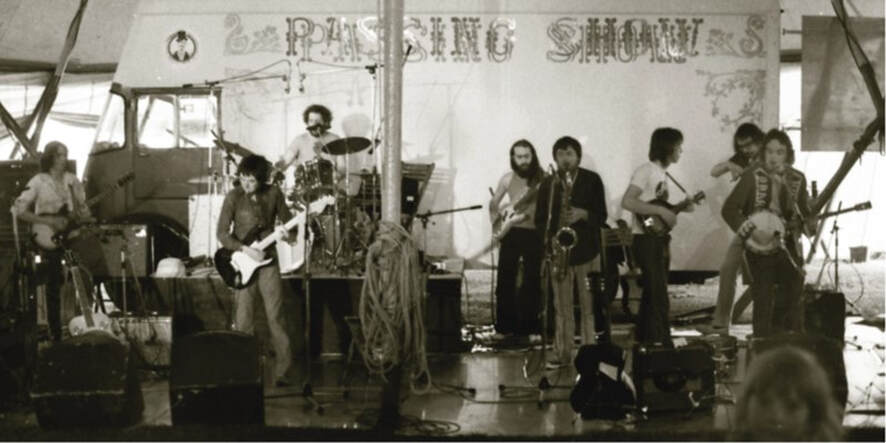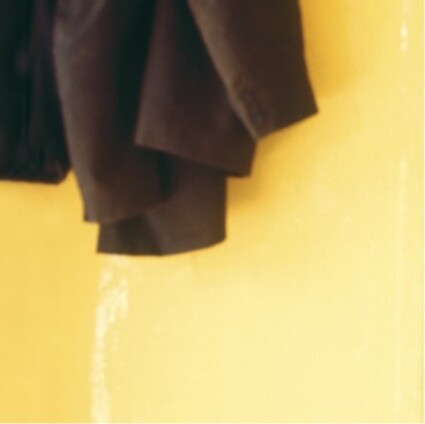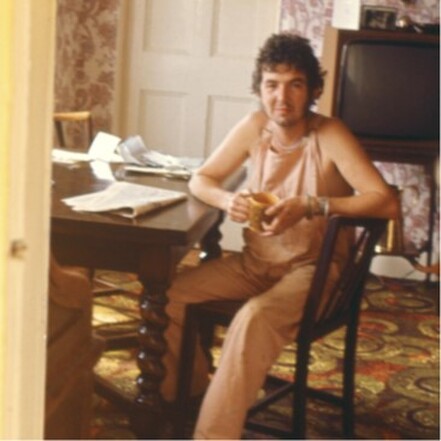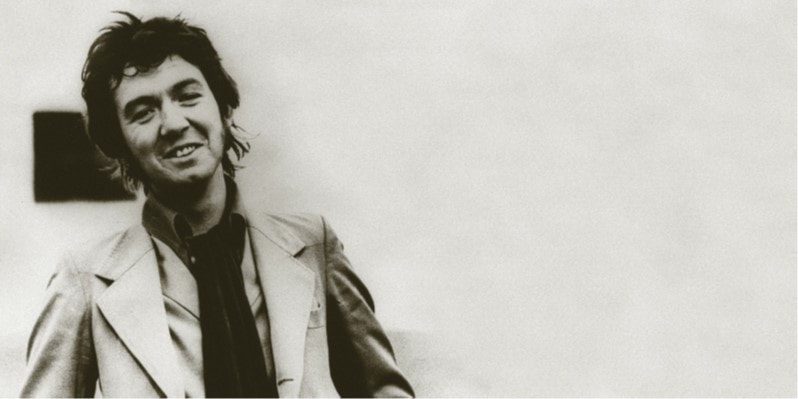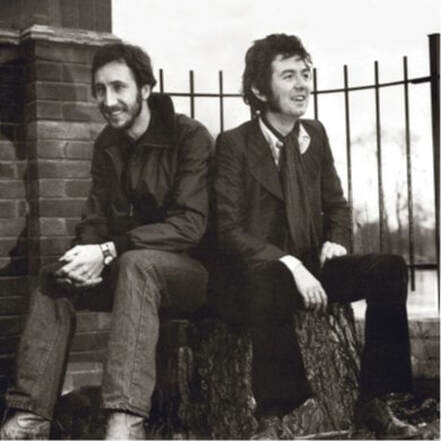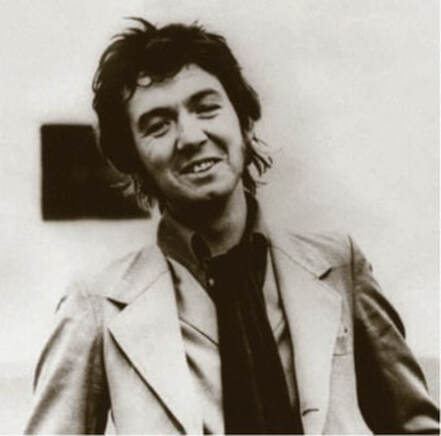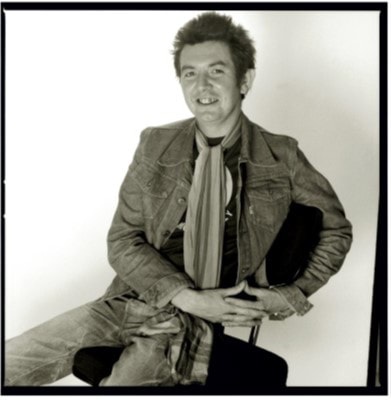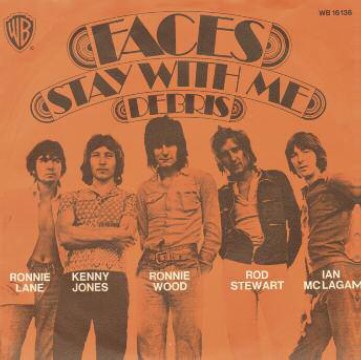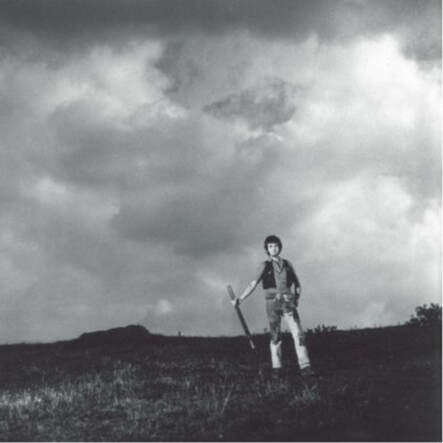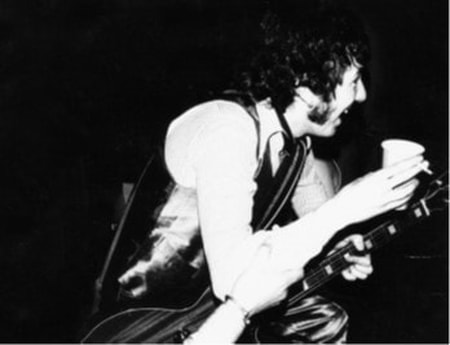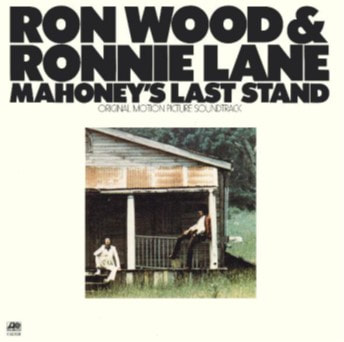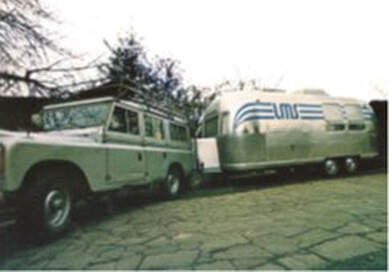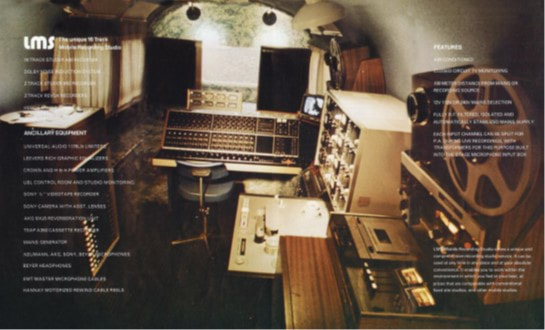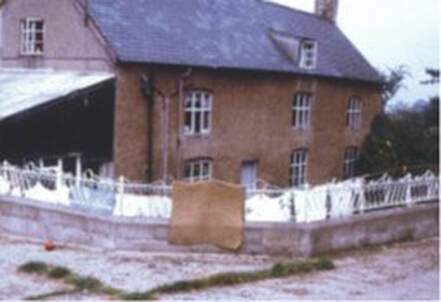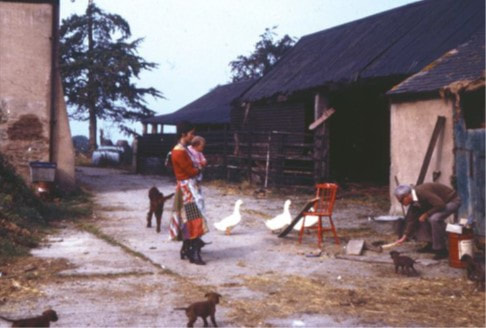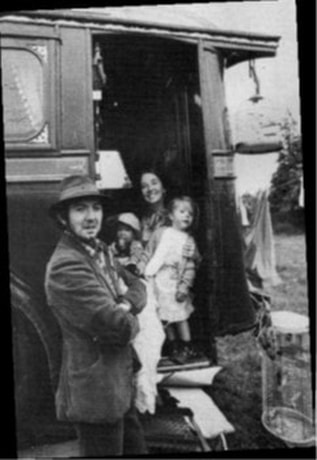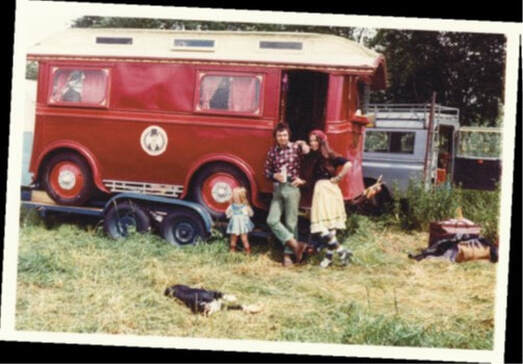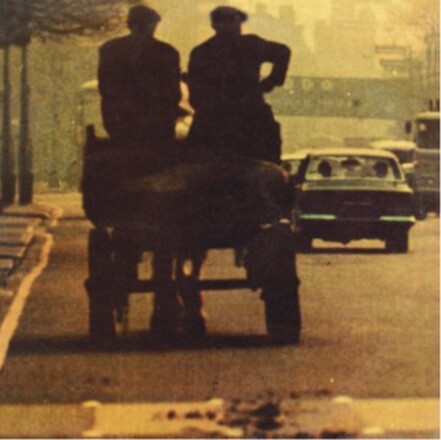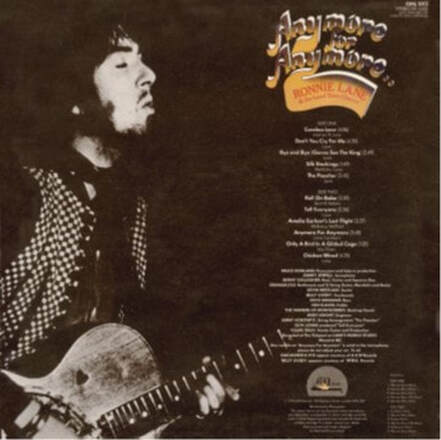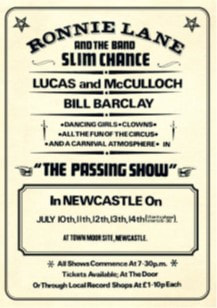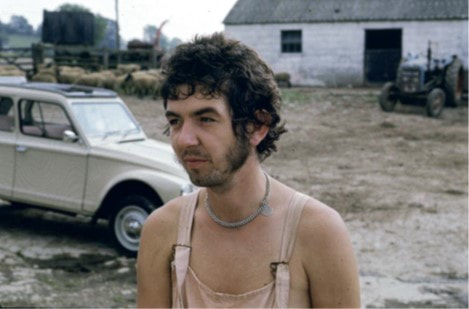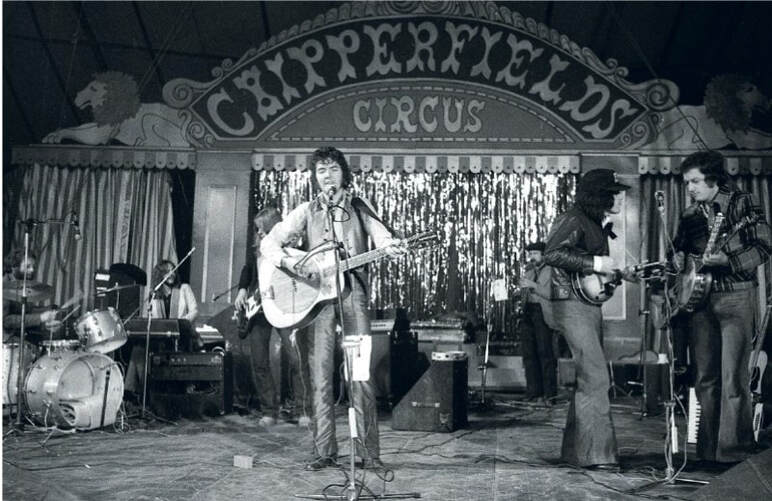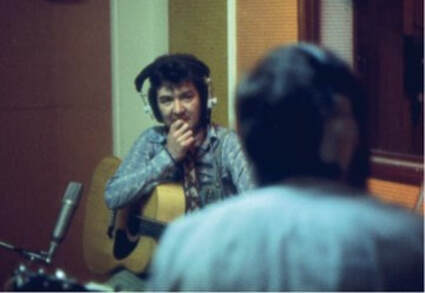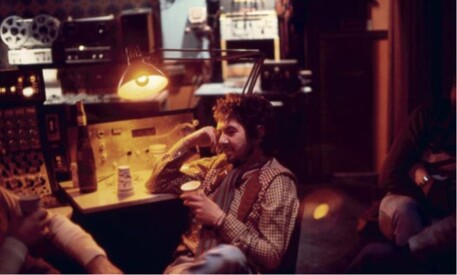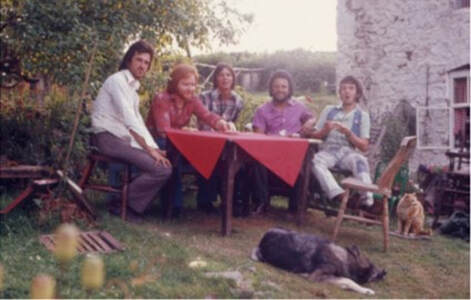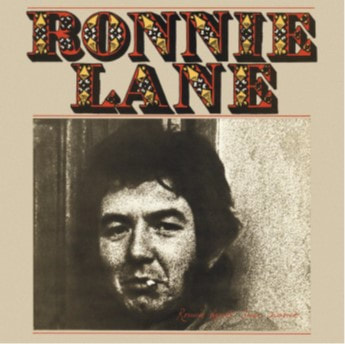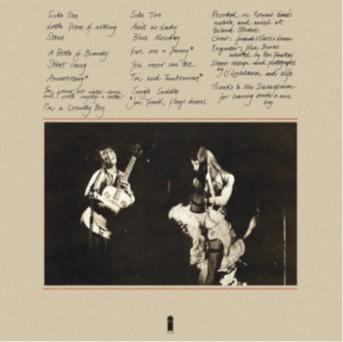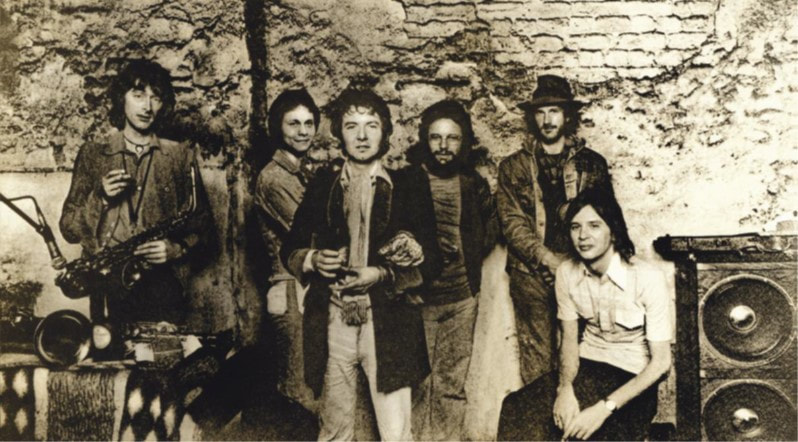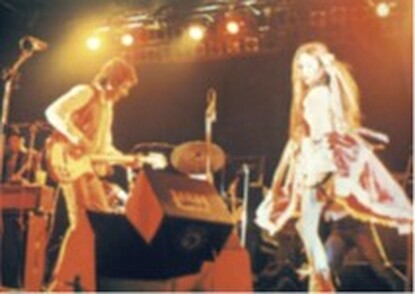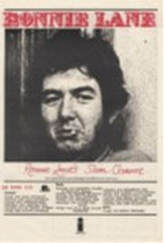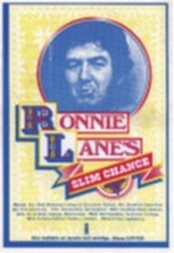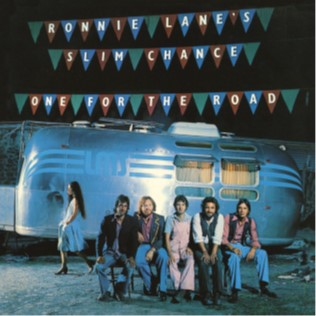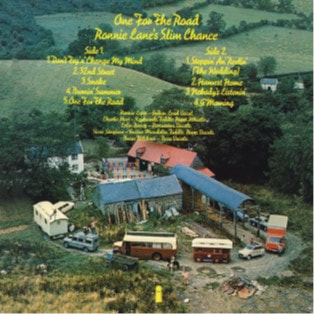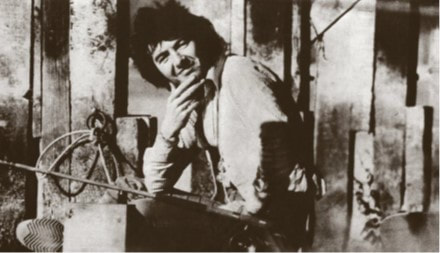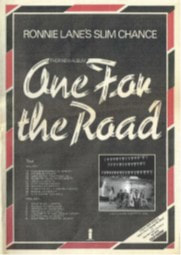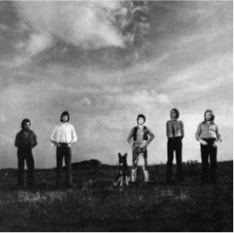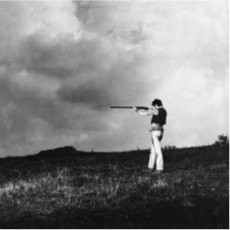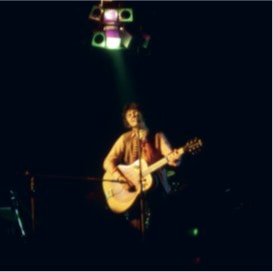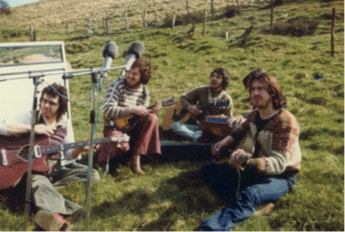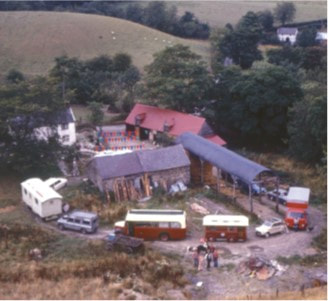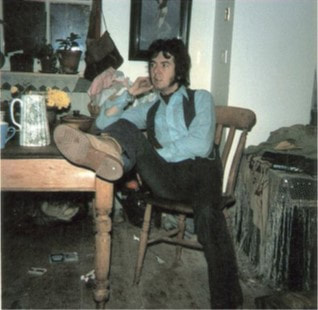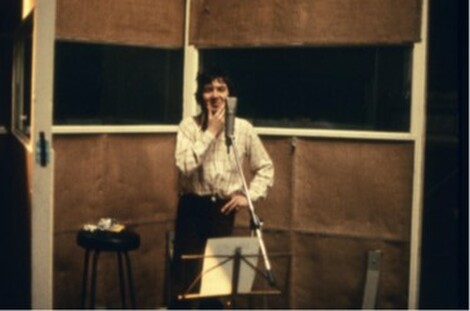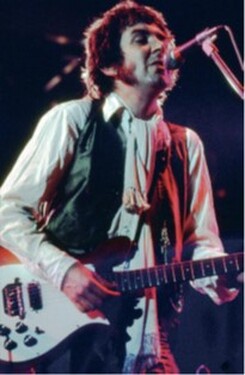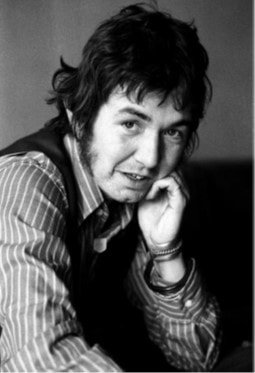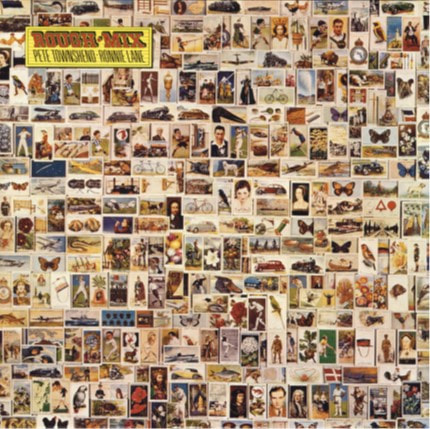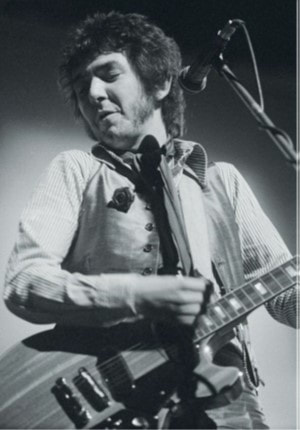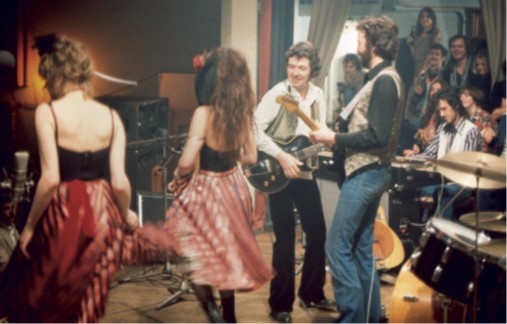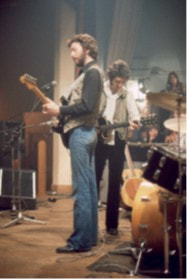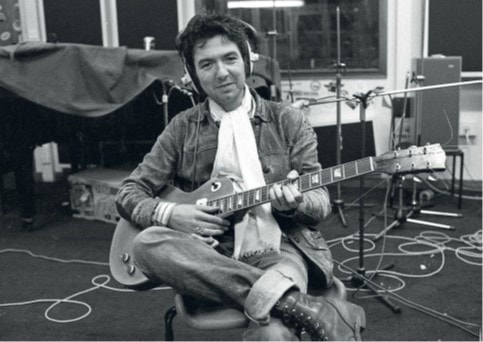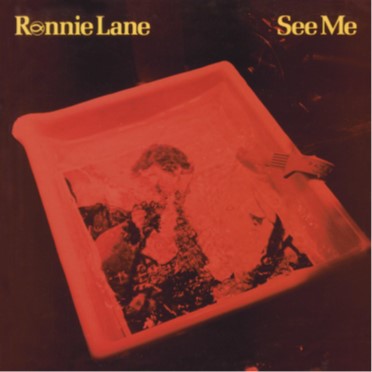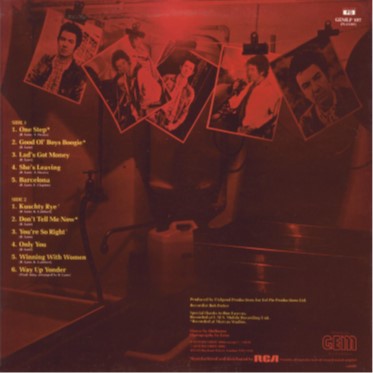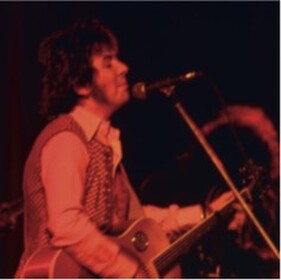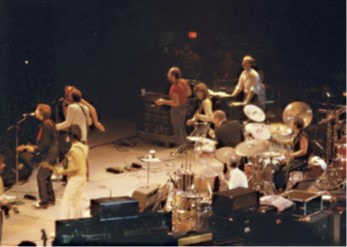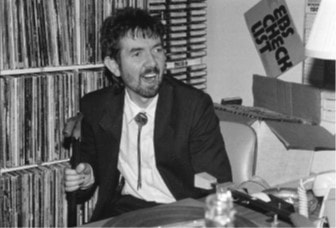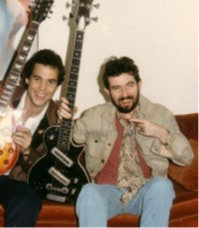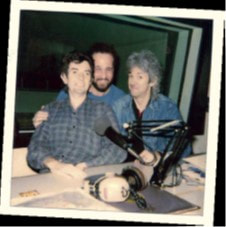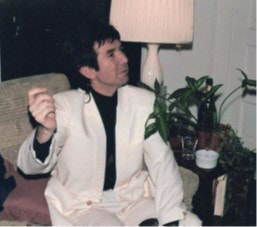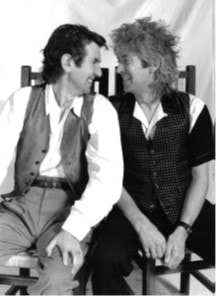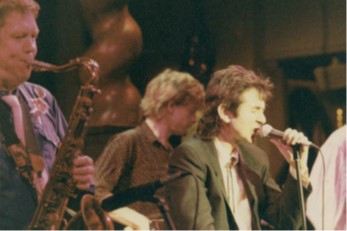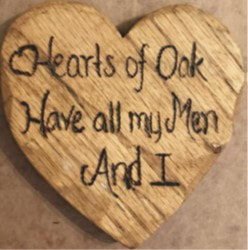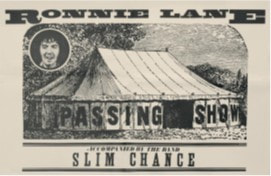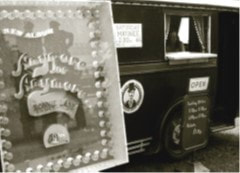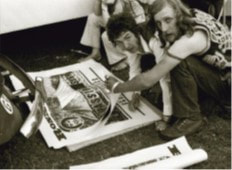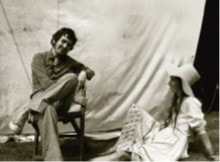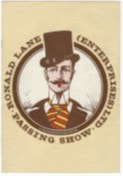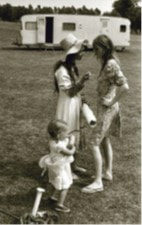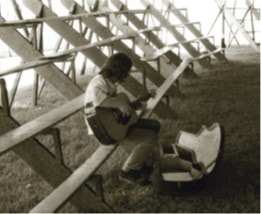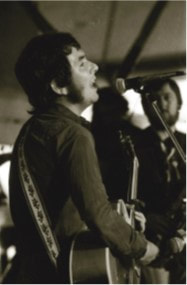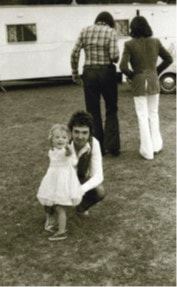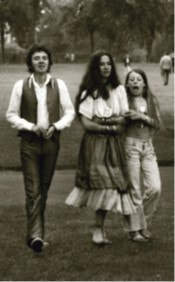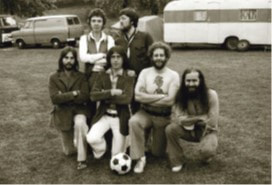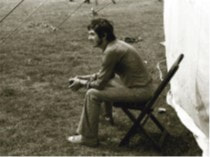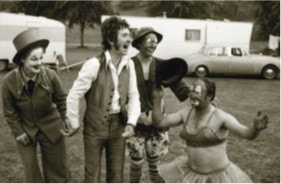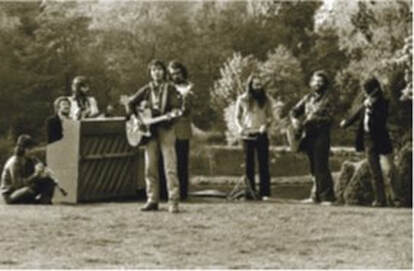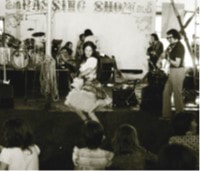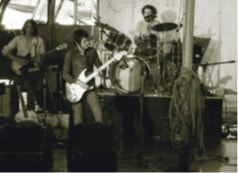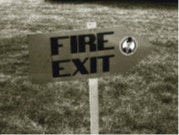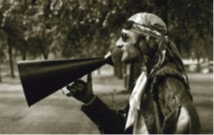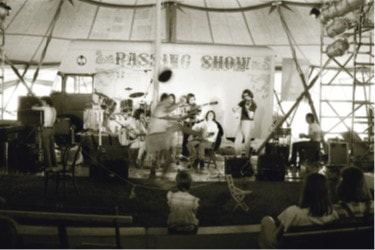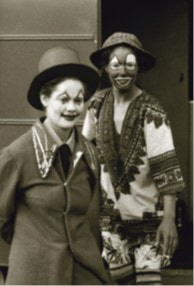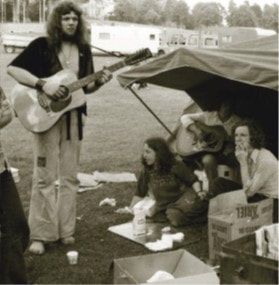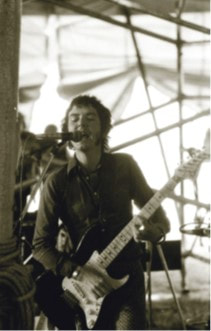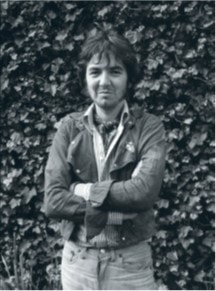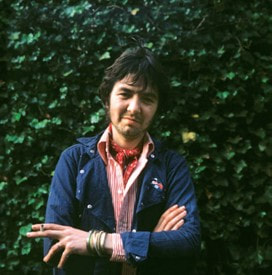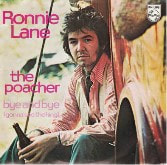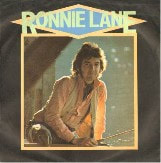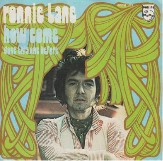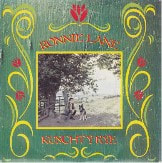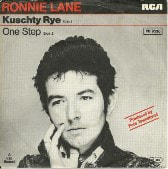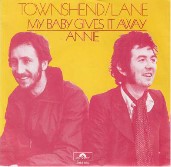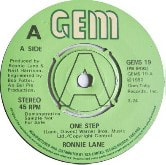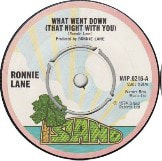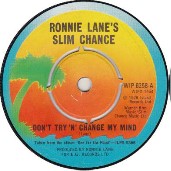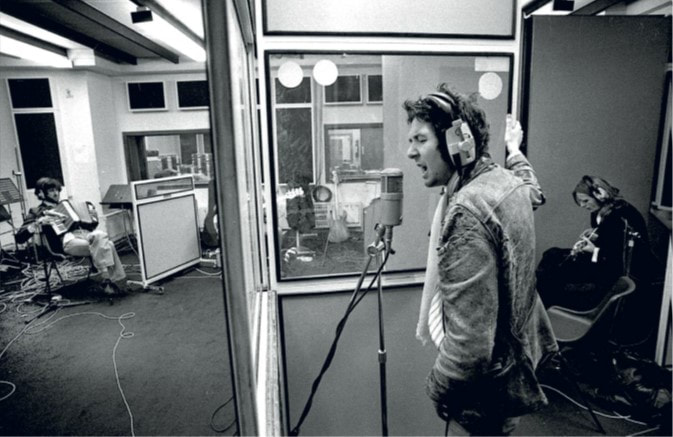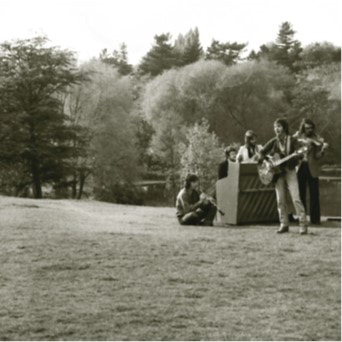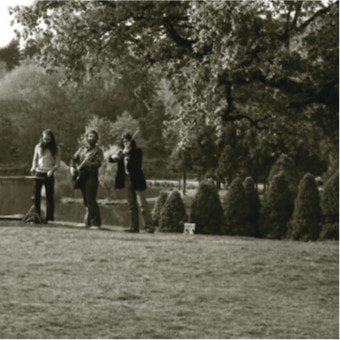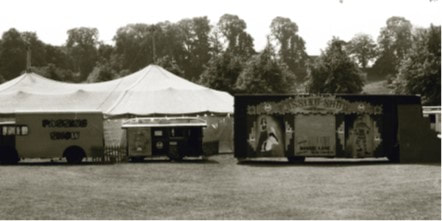JFAM Box Set Text and Photos
Just For A Moment ~ Music 1973-1997
FOREWORD BY PETE TOWNSHEND
Ronnie Lane was my best friend for many years. He’s one of the few people I have
ever been able to work with in a studio without the need to take charge. His
songs, his voice, his laughter and his courage (he was always willing to call me out
if I was being a twat) still ring out for me.
ever been able to work with in a studio without the need to take charge. His
songs, his voice, his laughter and his courage (he was always willing to call me out
if I was being a twat) still ring out for me.
He was one of those who was ‘lost’ too soon when his M.S. got really bad and he
went off in search of a cure, and never came back.
went off in search of a cure, and never came back.
Here, in these songs, collected with such love and care, he is found again. Probably
at the height of his rebellious and chaotic powers, where music had to be immediate
and uplifting, or else heartbreaking – but always real.
at the height of his rebellious and chaotic powers, where music had to be immediate
and uplifting, or else heartbreaking – but always real.
Ronnie’s voice is very much like Bob Dylan’s sometimes, but his music with his
musicians has the immediacy of Neil Young’s Crazy Horse. It feels as though it all
spills out without effort, joyfully, and like a soothing balm.
musicians has the immediacy of Neil Young’s Crazy Horse. It feels as though it all
spills out without effort, joyfully, and like a soothing balm.
The Small Faces and The Faces made some amazing music, and Ronnie was at
the creative heart of both bands, always collaborating, always throwing ideas back
and forth, never precious (the way I was).
the creative heart of both bands, always collaborating, always throwing ideas back
and forth, never precious (the way I was).
But in this collection we get to hear Ronnie Lane completely in charge, partly because
the musicians around him held him in such high regard and loved the way
he worked so much. Throwing music around like garlands, sometimes tight,
sometimes lazy, always smoky.
the musicians around him held him in such high regard and loved the way
he worked so much. Throwing music around like garlands, sometimes tight,
sometimes lazy, always smoky.
For me the music here brings a joyful tear. How wonderful to get a sense of the
entire arc of Ronnie’s work, rough and smooth, lost and found.
entire arc of Ronnie’s work, rough and smooth, lost and found.
INTRODUCTION
RONALD FREDERICK LANE was born on April 1st 1946 to Stan
and Elsie Lane. He has an elder brother, Stan. His father Stan
worked as a lorry driver whilst Elsie suffered from multiple sclerosis,
the disease which would later kill her son.
and Elsie Lane. He has an elder brother, Stan. His father Stan
worked as a lorry driver whilst Elsie suffered from multiple sclerosis,
the disease which would later kill her son.
Lane grew up in Forest Gate in the East End of London. At age seven,
his father gave him a child’s banjo which Ronnie mastered. He would
then dress up as his favourite cowboy, Roy Rogers, and entertain the
bus drivers at the local garage. They in turn would give him their small
change.
his father gave him a child’s banjo which Ronnie mastered. He would
then dress up as his favourite cowboy, Roy Rogers, and entertain the
bus drivers at the local garage. They in turn would give him their small
change.
Ronnie left school, Lister Technical College, in 1962. By this time he
was besotted with acts such as Elvis Presley, Frankie Laine, Lonnie
Donegan, Joe Brown, Johnny Kidd and the Pirates and the Shadows.
was besotted with acts such as Elvis Presley, Frankie Laine, Lonnie
Donegan, Joe Brown, Johnny Kidd and the Pirates and the Shadows.
He played guitar in a couple of local bands but soon changed to bass.
His early groups include The Muleskinners and The Outcasts. It was
in the latter band that the young Kenney Jones played drums.
His early groups include The Muleskinners and The Outcasts. It was
in the latter band that the young Kenney Jones played drums.
In 1965, Lane met Steve Marriott at the J60 music shop in Manor Park.
By this time, Ronnie was obsessed with American r’n’b music,
particularly the groups Booker T and the MG’s and Junior Walker and
the All-Stars.
By this time, Ronnie was obsessed with American r’n’b music,
particularly the groups Booker T and the MG’s and Junior Walker and
the All-Stars.
He was also a mod as was Marriott. Together, along with drummer
Kenney Jones and organist, Jimmy Winston, they formed the Small
Faces and in 1965 had their first chart hit with Whatcha Gonna Do
About It? Under the Marriott and Lane song-writing partnership, the
band would now become a mainstay of the singles and album charts
for four years.
Kenney Jones and organist, Jimmy Winston, they formed the Small
Faces and in 1965 had their first chart hit with Whatcha Gonna Do
About It? Under the Marriott and Lane song-writing partnership, the
band would now become a mainstay of the singles and album charts
for four years.
Jimmy Winston left very early on and was replaced by Ian McLagan.
The band recorded for both Decca and Immediate Records.
The band recorded for both Decca and Immediate Records.
However, as the years passed, severe disputes within the band served
to tear them apart and in 1969 the band folded. Lane now sought to
put together another group with the remaining two members, Jones
and McLagan.
to tear them apart and in 1969 the band folded. Lane now sought to
put together another group with the remaining two members, Jones
and McLagan.
Guitarist Ronnie Wood, a huge Small Faces fan, began rehearsing with
the band. He in turn brought along vocalist Rod Stewart and thus The
Faces were born. It was after two well received but low selling albums
that Rod’s solo career took off. His 1971 single Maggie May established
the vocalist as a major name both in the UK and in America.
the band. He in turn brought along vocalist Rod Stewart and thus The
Faces were born. It was after two well received but low selling albums
that Rod’s solo career took off. His 1971 single Maggie May established
the vocalist as a major name both in the UK and in America.
Stewart’s massive success now laid the seeds for great tensions.
However, the band’s third album, A Nod’s As Good As A Wink, gave
the group huge commercial success. They were quickly categorised as
a good time band whose penchant for alcohol, loud clothes and fast
women, was often reflected
in their music. However,
the songs which carried
more depth – Stone, Debris,
Love Lived Here, Flags and
Banners - were invariably
written by Lane.
However, the band’s third album, A Nod’s As Good As A Wink, gave
the group huge commercial success. They were quickly categorised as
a good time band whose penchant for alcohol, loud clothes and fast
women, was often reflected
in their music. However,
the songs which carried
more depth – Stone, Debris,
Love Lived Here, Flags and
Banners - were invariably
written by Lane.
In 1973, the growing
tensions within the band
surfaced during and after
the recording of their
fourth solo album, Ooh La
La. For the most part, Rod
stayed away from the sessions and yet on the album’s release called it a
shambles in the press.
tensions within the band
surfaced during and after
the recording of their
fourth solo album, Ooh La
La. For the most part, Rod
stayed away from the sessions and yet on the album’s release called it a
shambles in the press.
For Lane the experience of the album convinced him that Stewart was
saving his best material for his solo career. Moreover, Lane had been
highly frustrated by the band’s refusal to play his songs live for fear
they would interfere with their raucous rock’n’roll image. On tour in
America, Lane informed the band that he was quitting. His last
appearance with the Faces took place at the Edmonton Sundown
Theatre on June 4th 1973.
saving his best material for his solo career. Moreover, Lane had been
highly frustrated by the band’s refusal to play his songs live for fear
they would interfere with their raucous rock’n’roll image. On tour in
America, Lane informed the band that he was quitting. His last
appearance with the Faces took place at the Edmonton Sundown
Theatre on June 4th 1973.
Now read on.....
Act 1
AT FIRST there was a holiday in the south of France, a chance
to grab some much needed time to gather thoughts, to take
stock and to make plans. He travelled there with his then deep love,
Kate McInnerney.
to grab some much needed time to gather thoughts, to take
stock and to make plans. He travelled there with his then deep love,
Kate McInnerney.
When they first met, Ronnie and Kate were both married, but such was
the fierce and strong spark between them, they were soon packing their
suitcases and instigating divorces. Kate had a fondness for the Romany
lifestyle, the spirit of freedom, and Ronnie responded heavily to her
ways. Freedom was what he now sought with all his heart. He began
divesting himself of the old Ronnie.
the fierce and strong spark between them, they were soon packing their
suitcases and instigating divorces. Kate had a fondness for the Romany
lifestyle, the spirit of freedom, and Ronnie responded heavily to her
ways. Freedom was what he now sought with all his heart. He began
divesting himself of the old Ronnie.
The man nicknamed ‘Three Piece’ for his continual wearing of
immaculate suits now opted for waistcoats and scarves and sandals. It
was part hippy and part costermonger, (Costermongers were Victorian
streets sellers. Ronnie was the first to jump onto their look.)
immaculate suits now opted for waistcoats and scarves and sandals. It
was part hippy and part costermonger, (Costermongers were Victorian
streets sellers. Ronnie was the first to jump onto their look.)
The Faces keyboardist, Ian McLagan (RIP) remembered Kate as a
hippie, a middle class drop out with brains and beauty. “Since Ronnie
had been living with her he had become scruffy. His attire was an
embarrassment to the group really and he had stopped travelling with
us.... We had always been five guys touring and now suddenly we were
four guys and a shabby, grubby guy with his even more shabby and
grubby girlfriend.”
hippie, a middle class drop out with brains and beauty. “Since Ronnie
had been living with her he had become scruffy. His attire was an
embarrassment to the group really and he had stopped travelling with
us.... We had always been five guys touring and now suddenly we were
four guys and a shabby, grubby guy with his even more shabby and
grubby girlfriend.”
In France, Lane pondered on his future and as he did so he slowly
became aware of what was required of him, in fact, could see what was
coming: That he, Ronald Frederick Lane, was about to step up a level,
become the quality songwriter he had threatened to be all along.
Evidence had been planted in The Small Faces – ‘Show Me The
Way’, ‘Song Of A Baker’, ‘Itchychoo Park’. It had taken fine shape
and developed in the Faces. Now in 1973 he was ready to roll.
became aware of what was required of him, in fact, could see what was
coming: That he, Ronald Frederick Lane, was about to step up a level,
become the quality songwriter he had threatened to be all along.
Evidence had been planted in The Small Faces – ‘Show Me The
Way’, ‘Song Of A Baker’, ‘Itchychoo Park’. It had taken fine shape
and developed in the Faces. Now in 1973 he was ready to roll.
Charlie Hart, who knew him and worked with him, and drank and
laughed with him, and loved him, always and to this day, like a brother,
is at pains to state, “He was a dedicated songwriter and that is the big
thing about Ronnie. He was a songwriter. He was a great singer and a
great performer but primarily he was a songwriter and that is what really
endures.”
laughed with him, and loved him, always and to this day, like a brother,
is at pains to state, “He was a dedicated songwriter and that is the big
thing about Ronnie. He was a songwriter. He was a great singer and a
great performer but primarily he was a songwriter and that is what really
endures.”
Back up arrives from Steve Bingham, bass player with Ronnie during
the early part of his solo career. “I think Ronnie Lane is very underrated
as a songwriter. Playing with Ronnie Lane and later on joining up with
Charlie (Hart) and Steve (Simpson) who introduced me to material I
had not heard before, I came to see what a supremely talented songwriter
he is. That is the thing for me – his song-writing talent.”
as a songwriter. Playing with Ronnie Lane and later on joining up with
Charlie (Hart) and Steve (Simpson) who introduced me to material I
had not heard before, I came to see what a supremely talented songwriter
he is. That is the thing for me – his song-writing talent.”
If Lane was now driven to showcase his deep and wonderful songwriting
talents, that ambition was also accompanied by a huge desire
to operate totally outside of the music business. His disillusionment
with record companies and managers and PR’s and promoters was now
writ large across his soul. His experiences with The Small Faces and
The Faces, the taking of money, the growing of egos, burnt him badly.
“It was all an industry and it nauseated me,” he stated.
talents, that ambition was also accompanied by a huge desire
to operate totally outside of the music business. His disillusionment
with record companies and managers and PR’s and promoters was now
writ large across his soul. His experiences with The Small Faces and
The Faces, the taking of money, the growing of egos, burnt him badly.
“It was all an industry and it nauseated me,” he stated.
His need now was to create a life that contained both making music
and going his own way in all matters, come what may. He and Kate had
sealed their affair on a trip to Ireland and it was there that Ronnie heard
and fell for the call of the rural lifestyle. He later said, “It is what I had
been looking for all my life.”
and going his own way in all matters, come what may. He and Kate had
sealed their affair on a trip to Ireland and it was there that Ronnie heard
and fell for the call of the rural lifestyle. He later said, “It is what I had
been looking for all my life.”
His music would now reflect this environment. It would seek the
beauty and wonder of nature. It would reflect its gentle seasons but also
its angry nature. It would not be dominated by loud guitars but find
its place in acoustic settings. The sound of the city had no allure for
beauty and wonder of nature. It would reflect its gentle seasons but also
its angry nature. It would not be dominated by loud guitars but find
its place in acoustic settings. The sound of the city had no allure for
him. He had played high octane pop, soul and rock for ten years. Now
he heard a new calling and he could not – more to the point would not
- fight its demands.
he heard a new calling and he could not – more to the point would not
- fight its demands.
Accordion, mandolin, acoustic guitars and fiddles would often be
placed centre stage, and thus his music would joyfully and bravely go
against the grain of the time.
placed centre stage, and thus his music would joyfully and bravely go
against the grain of the time.
In 1973 Glam Rock gripped the album and single charts, and prog rock
hovered on the horizon. Lane’s music would act as a counterpart. It
would not seek to operate within the mainstream but to live and
breathe elsewhere. He would plant his flag on new land and hope that
people would find him there.
hovered on the horizon. Lane’s music would act as a counterpart. It
would not seek to operate within the mainstream but to live and
breathe elsewhere. He would plant his flag on new land and hope that
people would find him there.
He would create a sound and a style that no one at that time was
attempting. He would stride out on his own and see where his muse
took him. He would incorporate all kinds of influences (just as he had
done in the Small Faces) to create a remarkable and unique body of
work. The music hall would meet American blues, soul and gospel
would be transmuted into the sound of fiddles and mandolins. His
songs would be deep but deceptively simple. His words would be
honest and open and sometimes look towards a tradition of wisdom
hewn from his London working class culture. And in this way he would
write songs that remain unique to his talent. No one wrote songs like
Ronnie Lane.
attempting. He would stride out on his own and see where his muse
took him. He would incorporate all kinds of influences (just as he had
done in the Small Faces) to create a remarkable and unique body of
work. The music hall would meet American blues, soul and gospel
would be transmuted into the sound of fiddles and mandolins. His
songs would be deep but deceptively simple. His words would be
honest and open and sometimes look towards a tradition of wisdom
hewn from his London working class culture. And in this way he would
write songs that remain unique to his talent. No one wrote songs like
Ronnie Lane.
He had already made a marker a year previously when he and the then
Faces guitarist, Ron Wood, began recording a soundtrack album for a
film entitled Mahoney’s Last Stand. The film was the brainwave of one
Alexis Kanner, a young actor known for his rebellious persona. This
idea of Kanner as a maverick had especially taken hold through his
work on the Patrick McGoohan driven TV series, The Prisoner which
was first aired in the UK in September of 1967. The series follows a
former British spy who is abducted and imprisoned in a mysterious
coastal resort. Kanner’s character appeared in the final four episodes
and symbolised the hippie generation, the young, the rebellious. Later
on, in 1968, he shot a video for the Small Faces final single, The
Universal. He and Lane struck a friendship culminating in his request
for the bassist to provide music for his film. The album is filled with
blues, and moody instrumentals, with many of the songs characterised
by Wood’s burning guitar sound, an aural colour which had given The
Faces such a vivid identity.
Faces guitarist, Ron Wood, began recording a soundtrack album for a
film entitled Mahoney’s Last Stand. The film was the brainwave of one
Alexis Kanner, a young actor known for his rebellious persona. This
idea of Kanner as a maverick had especially taken hold through his
work on the Patrick McGoohan driven TV series, The Prisoner which
was first aired in the UK in September of 1967. The series follows a
former British spy who is abducted and imprisoned in a mysterious
coastal resort. Kanner’s character appeared in the final four episodes
and symbolised the hippie generation, the young, the rebellious. Later
on, in 1968, he shot a video for the Small Faces final single, The
Universal. He and Lane struck a friendship culminating in his request
for the bassist to provide music for his film. The album is filled with
blues, and moody instrumentals, with many of the songs characterised
by Wood’s burning guitar sound, an aural colour which had given The
Faces such a vivid identity.
Two songs – ‘Just For A Moment’ and ‘From The Late To The Early ‘–
stand out on the album as songs whose templates – the deep and
reflective nature of Moment and the simple and ramshackle feel of Late
– Lane would later on explore in much more detail.
stand out on the album as songs whose templates – the deep and
reflective nature of Moment and the simple and ramshackle feel of Late
– Lane would later on explore in much more detail.
According to his brother Stan, the achingly beautiful ‘Just For A
Moment’ concerned a near death experience of Ronnie’s from years
before when he had nearly accidentally drowned. The lyrics about
feeling at peace just for a moment refer the glistening serenity he
experienced as death approached him. Lane would always remember
that moment, the seconds when he inhabited the space between life
and death, and such was its effect, he dug deep to produce a song of
such rare beauty, recorded with such simplicity, that it marks itself out
as wonderful Lane original.
before when he had nearly accidentally drowned. The lyrics about
feeling at peace just for a moment refer the glistening serenity he
experienced as death approached him. Lane would always remember
that moment, the seconds when he inhabited the space between life
and death, and such was its effect, he dug deep to produce a song of
such rare beauty, recorded with such simplicity, that it marks itself out
as wonderful Lane original.
Moment’ concerned a near death experience of Ronnie’s from years
before when he had nearly accidentally drowned. The lyrics about
feeling at peace just for a moment refer the glistening serenity he
experienced as death approached him. Lane would always remember
that moment, the seconds when he inhabited the space between life
and death, and such was its effect, he dug deep to produce a song of
such rare beauty, recorded with such simplicity, that it marks itself out
as wonderful Lane original.
before when he had nearly accidentally drowned. The lyrics about
feeling at peace just for a moment refer the glistening serenity he
experienced as death approached him. Lane would always remember
that moment, the seconds when he inhabited the space between life
and death, and such was its effect, he dug deep to produce a song of
such rare beauty, recorded with such simplicity, that it marks itself out
as wonderful Lane original.
The album itself never saw the light of day until four years later when
the film was finally released. “And we never got paid for it,” Lane
remarked. Back in 1973, however, money was not an issue. His earnings
from The Faces had enabled him to build a first class mobile studio
(LMS) – one of only two in the country at that time which he could
use to record on his own terms and which he could also rent out. He
also acquired a remote farm and a small holding in Shropshire known
as Fishpool. This would become the magical home, the space in which
Lane’s wonderful songs would find their shape and life. In Fishpool,
were barns, and outhouses and pigs and ducks and chickens and dogs.
But in that sweet air was the elixir he needed to embark upon his new
lifestyle.
the film was finally released. “And we never got paid for it,” Lane
remarked. Back in 1973, however, money was not an issue. His earnings
from The Faces had enabled him to build a first class mobile studio
(LMS) – one of only two in the country at that time which he could
use to record on his own terms and which he could also rent out. He
also acquired a remote farm and a small holding in Shropshire known
as Fishpool. This would become the magical home, the space in which
Lane’s wonderful songs would find their shape and life. In Fishpool,
were barns, and outhouses and pigs and ducks and chickens and dogs.
But in that sweet air was the elixir he needed to embark upon his new
lifestyle.
Charlie Hart, again. “He didn’t sell himself. He didn’t have a manager
or a PR person and he went off into the wilderness. He had another
or a PR person and he went off into the wilderness. He had another
agenda. It wasn’t a commercial agenda it was an artistic
agenda. This was music for music’s sake. To my mind he
was a very artistic man. That is why this phase of his music
was brilliant.”
agenda. This was music for music’s sake. To my mind he
was a very artistic man. That is why this phase of his music
was brilliant.”
Ironically, the music that danced in Lane’s head had been
inspired in part by Rod Stewart’s first two solo albums, An
Old Raincoat and Gasoline Alley. The singer’s use of folk,
and country music on these works had set him apart from
his contemporaries but it was the warmth of these records
that truly caught Lane’s attention. That is what he began to
search for in his own recordings. These songs would also be
marked by their fresh and wonderful melodies, their
imaginative arrangements. Although they would eschew any
kind of overthinking or playing, there would be a
meticulousness about each song which would be disguised
by their immediacy and musically compassionate spirit.
One of Ronnie’s great qualities as a songwriter was to make
the hard look very easy indeed.
inspired in part by Rod Stewart’s first two solo albums, An
Old Raincoat and Gasoline Alley. The singer’s use of folk,
and country music on these works had set him apart from
his contemporaries but it was the warmth of these records
that truly caught Lane’s attention. That is what he began to
search for in his own recordings. These songs would also be
marked by their fresh and wonderful melodies, their
imaginative arrangements. Although they would eschew any
kind of overthinking or playing, there would be a
meticulousness about each song which would be disguised
by their immediacy and musically compassionate spirit.
One of Ronnie’s great qualities as a songwriter was to make
the hard look very easy indeed.
After a much need holiday in France, Lane returned
to London and an open ended future. The producer
Glyn Johns now called him and asked of his plans, if
there were songs he had that needed recording. Lane
answered in the affirmative. ‘How Come’ was co-written
with guitarist Kevin Westlake and featured amongst
others Gallagher and Lyle. In early 1974, it peaked at
11 in the charts. By then Ronnie Lane’s Slim Chance
band were up and running. The first line up consisted
of Bruce Rowland (drums) Chrissie Stewart (bass),
Jimmy Jewell (sax), Billy Livesey (keyboards), Kevin
Westlake (guitar), Benny Gallagher (guitar and
accordion) and Graham Lyle (guitar, mandolin and
banjo).
to London and an open ended future. The producer
Glyn Johns now called him and asked of his plans, if
there were songs he had that needed recording. Lane
answered in the affirmative. ‘How Come’ was co-written
with guitarist Kevin Westlake and featured amongst
others Gallagher and Lyle. In early 1974, it peaked at
11 in the charts. By then Ronnie Lane’s Slim Chance
band were up and running. The first line up consisted
of Bruce Rowland (drums) Chrissie Stewart (bass),
Jimmy Jewell (sax), Billy Livesey (keyboards), Kevin
Westlake (guitar), Benny Gallagher (guitar and
accordion) and Graham Lyle (guitar, mandolin and
banjo).
Here is Graham. “The first time I met Ronnie was at
Top Of The Pops. We were sitting in our dressing room
(Graham was in the band McGuiness Flint at the time),
and The Faces arrived and took the dressing room next
to us. We thought a fight had broken out. But it was
them partying. Great band, worked together
terrifically.”
Top Of The Pops. We were sitting in our dressing room
(Graham was in the band McGuiness Flint at the time),
and The Faces arrived and took the dressing room next
to us. We thought a fight had broken out. But it was
them partying. Great band, worked together
terrifically.”
Let us now look back at those listed instruments - accordion, mandolin
and banjo. Lane was about to start staking out new musical territory.
That was his triumph. His tragedy was that the accolades for doing so
would be a long time coming.
and banjo. Lane was about to start staking out new musical territory.
That was his triumph. His tragedy was that the accolades for doing so
would be a long time coming.
“The thing about Ronnie is that he generated respect,’ says Steve
Simpson who played fiddle on How Come (not used) and would join
the band. ‘He used his musicians wisely. Music was really important to
him, obviously. He wasn’t a lightweight ex pop star, ex Rod Stewart
sideman. There was so much more to him. And to bring that out of
himself he needed a bunch of good musicians around him. He had to
learn to trust you and then he would let stuff out and you would start
working together.”
the band. ‘He used his musicians wisely. Music was really important to
him, obviously. He wasn’t a lightweight ex pop star, ex Rod Stewart
sideman. There was so much more to him. And to bring that out of
himself he needed a bunch of good musicians around him. He had to
learn to trust you and then he would let stuff out and you would start
working together.”
Live, Slim Chance made their debut at the Penny For
the Guy festival on Clapham Common in November
1973. More dates followed. “Ronnie was amazing,’
Graham Lyle recalls. ‘He would come onstage and do
that little step dance of his and everyone just loved him.
He had something magic about him. He really did.”
the Guy festival on Clapham Common in November
1973. More dates followed. “Ronnie was amazing,’
Graham Lyle recalls. ‘He would come onstage and do
that little step dance of his and everyone just loved him.
He had something magic about him. He really did.”
When the live work ceased the band gathered at
Fishpool to start recording their debut album using
Ronnie’s mobile studio. At the same time, there was a
shift in personnel. Chrissie Stewart went off to play
bass with Joe Cocker. A musician named Biddy was
brought in but the situation never worked out. Which
is when Steve Bingham got the call from Bruce
Rowland the drummer. He and Bruce had played many
sessions together.
Fishpool to start recording their debut album using
Ronnie’s mobile studio. At the same time, there was a
shift in personnel. Chrissie Stewart went off to play
bass with Joe Cocker. A musician named Biddy was
brought in but the situation never worked out. Which
is when Steve Bingham got the call from Bruce
Rowland the drummer. He and Bruce had played many
sessions together.
At first, Bingham could not understand why such a
seasoned bassist as Lane would require a bass man for
the band. At Fishpool, he saw why. “It is difficult to
seasoned bassist as Lane would require a bass man for
the band. At Fishpool, he saw why. “It is difficult to
sing and play bass at the same time
especially the way in which he was
singing which was full on, with lots of
lyrics,” he states. “When you are singing
like that the last thing you want to be
doing is playing an opposing bass line.”
especially the way in which he was
singing which was full on, with lots of
lyrics,” he states. “When you are singing
like that the last thing you want to be
doing is playing an opposing bass line.”
What also caught his attention was Lane’s
absolute trust in the musicians he had
gathered around him. It is a theme echoed
again and again.
absolute trust in the musicians he had
gathered around him. It is a theme echoed
again and again.
Steve Bingham: “That is what I was
wondering when I went up there. I
thought he might say do it this way and I
would have been happy if he had. I actually
said to him after one song we had recorded,
‘Everything ok Ron?’ He said, ‘Yes just do
your own thing.’ He never told me once
what to play. And as far as I know he was
like that with everyone. I never heard him
telling people what to play.”
wondering when I went up there. I
thought he might say do it this way and I
would have been happy if he had. I actually
said to him after one song we had recorded,
‘Everything ok Ron?’ He said, ‘Yes just do
your own thing.’ He never told me once
what to play. And as far as I know he was
like that with everyone. I never heard him
telling people what to play.”
Steve Simpson: “He would show
you the sketch and then it was left
up to you. Occasionally, he would
show you a very important part that
needed to be played and he would
go over that until you got it. That
was in your lap and then you
contributed. It was a very organic
way of writing and I really
appreciated that.”
you the sketch and then it was left
up to you. Occasionally, he would
show you a very important part that
needed to be played and he would
go over that until you got it. That
was in your lap and then you
contributed. It was a very organic
way of writing and I really
appreciated that.”
Charlie Hart: “It was never “right
lads, I’ve got an idea and you do
this”. He would always share big
time. He never gave you a
direction as to what to play. He let
you find your way into it. And
along the way he would say, “Oh
that’s a good line.” It was very
organic.”
lads, I’ve got an idea and you do
this”. He would always share big
time. He never gave you a
direction as to what to play. He let
you find your way into it. And
along the way he would say, “Oh
that’s a good line.” It was very
organic.”
This giving of freedom to his
musicians helped create the air
of true inspiration that blew
through Fishpool on a daily
basis. And this air, magical and
musicians helped create the air
of true inspiration that blew
through Fishpool on a daily
basis. And this air, magical and
sweet, would push these musicians to their very
best.
best.
Steve Simpson: “It was incredibly rewarding to put
the effort in. He was sucking stuff out of you,
looking for your input. He would give you the
sketch of the song and that would change and
progress and then he would chuck something else
in. He was a proper working responsible
professional musician. I loved him for that.”
the effort in. He was sucking stuff out of you,
looking for your input. He would give you the
sketch of the song and that would change and
progress and then he would chuck something else
in. He was a proper working responsible
professional musician. I loved him for that.”
Graham Lyle: “We were recording sometimes in
the open air. He would take the mikes to the field
at the top of the farm where other farmers would
be. At the end of one of the tracks you can hear a
farmer asking if Ronnie has seen a sheep of his.”
the open air. He would take the mikes to the field
at the top of the farm where other farmers would
be. At the end of one of the tracks you can hear a
farmer asking if Ronnie has seen a sheep of his.”
This air would later draw the likes of Eric
Clapton to Ronnie, and help revitalise, help push
forward such talent. At the time of making his
debut album, Lane would gather the musicians
in the barn at Fishpool and it was in there that
the songs would be shaped and recorded. “A
duck or a dog might wander in,” Bingham
says.”‘Didn’t matter.”
Clapton to Ronnie, and help revitalise, help push
forward such talent. At the time of making his
debut album, Lane would gather the musicians
in the barn at Fishpool and it was in there that
the songs would be shaped and recorded. “A
duck or a dog might wander in,” Bingham
says.”‘Didn’t matter.”
The resulting album – Anymore For Anymore - carried seven songs with Lane as either
writer or co-writer, plus three covers. It was the blueprint for everything that was to
come, a sound and a style that people such as Sid Griffin see as a kind of new British
folk, one that encompassed blues, gospel and country, and an acoustic pastoral
direction. This was Americana, the start of it, Slim Chance delivering superb
interpretations of songs mixed in with Lane original songs that have lasted, songs
whose ripples have yet to dissolve.
writer or co-writer, plus three covers. It was the blueprint for everything that was to
come, a sound and a style that people such as Sid Griffin see as a kind of new British
folk, one that encompassed blues, gospel and country, and an acoustic pastoral
direction. This was Americana, the start of it, Slim Chance delivering superb
interpretations of songs mixed in with Lane original songs that have lasted, songs
whose ripples have yet to dissolve.
Steve Simpson: “He still had all the tools of a rock ’n’roll writer but he was
spreading out and he was discovering new territory and expressing himself in a
different way. I felt a lot of empathy. There was something he brought out of all
of us which is why the music turned out the way he did.”
spreading out and he was discovering new territory and expressing himself in a
different way. I felt a lot of empathy. There was something he brought out of all
of us which is why the music turned out the way he did.”
Charlie Hart: “He was more of a singer than people realised. They put him down
because he didn’t sound like Rod and that is why he got a reputation as not being a
great singer. Actually, if you talk to people about Ronnie’s technique, he was very
qualified and his timing subtle, very subtle.”
because he didn’t sound like Rod and that is why he got a reputation as not being a
great singer. Actually, if you talk to people about Ronnie’s technique, he was very
qualified and his timing subtle, very subtle.”
The album appeared to good reviews and respectable sales. Lane had retained Faces
manager Billy Gaff to guide him and it was he who secured a deal with GM Records.
Not that he would have gotten much gratitude from his client. Ronnie often stayed
deaf to his advice, and as Gaff also had Rod Stewart, the consistent money maker, on
his books, it was no surprise where Gaff made his bed, made his priorities. Lane hardly
listened to him anyway. He saw Gaff as part of the problem. The Music Business.
manager Billy Gaff to guide him and it was he who secured a deal with GM Records.
Not that he would have gotten much gratitude from his client. Ronnie often stayed
deaf to his advice, and as Gaff also had Rod Stewart, the consistent money maker, on
his books, it was no surprise where Gaff made his bed, made his priorities. Lane hardly
listened to him anyway. He saw Gaff as part of the problem. The Music Business.
A single, a catchy deceptive song named ‘The Poacher’, appeared. (“The type of song,”
Bingham opines, “to make the hairs on
your neck stand up.”) Top of the Pops
invited Slim Chance on to perform it.
Such exposure in those days, usually
ensured chart success. But then the
technicians went on strike and with no
exposure, the single disappeared. Lane
shrugged his shoulders and moved on.
He had eyes on a bigger prize, the
chance to make one of his dreams a
reality.
Bingham opines, “to make the hairs on
your neck stand up.”) Top of the Pops
invited Slim Chance on to perform it.
Such exposure in those days, usually
ensured chart success. But then the
technicians went on strike and with no
exposure, the single disappeared. Lane
shrugged his shoulders and moved on.
He had eyes on a bigger prize, the
chance to make one of his dreams a
reality.
The Passing Show (which is how
Lane’s Indian guru Meher Baba
described life,) is one of the most
famous tours ever undertaken in this
country. Ronnie hired a circus tent,
some circus acts, and vans for
transportation and hit the road. The
idea was simple. Pitch up where they
fancied, put up the tent, perform and
then move on.
Lane’s Indian guru Meher Baba
described life,) is one of the most
famous tours ever undertaken in this
country. Ronnie hired a circus tent,
some circus acts, and vans for
transportation and hit the road. The
idea was simple. Pitch up where they
fancied, put up the tent, perform and
then move on.
It was a beautiful dream and played upon Ronnie’s love of the open
road, and the lack of restriction that touring places upon you (Hotel,
gig, hotel, plane, hotel, gig, hotel, plane, hotel...) Only it turned into a
catastrophe. The vans hired were ancient. The planning at every level,
highly haphazard.
road, and the lack of restriction that touring places upon you (Hotel,
gig, hotel, plane, hotel, gig, hotel, plane, hotel...) Only it turned into a
catastrophe. The vans hired were ancient. The planning at every level,
highly haphazard.
Steve Bingham: “It was obvious he was losing money because
sometimes there were just a few people in the tent. No one put into
operation a PR campaign for the tour. We would arrive places and you
would see one poster on a lamp post and he had this huge entourage
setting up in the field. Not that he minded. For Ronnie, it was a dream
come true to do it. He was on the road with his missus and kids living
the dream. And I never saw him anything but happy. Plus he was
fantastic on stage. He was brilliant. There are very few people who can
just be themselves in front of an audience and capture that audience’s
attention in a natural way. He wasn’t trying to do it - he was just being
himself and because he was such a likeable person the audiences loved
him. He cared about his people. He engaged with people and audiences
love that.”
sometimes there were just a few people in the tent. No one put into
operation a PR campaign for the tour. We would arrive places and you
would see one poster on a lamp post and he had this huge entourage
setting up in the field. Not that he minded. For Ronnie, it was a dream
come true to do it. He was on the road with his missus and kids living
the dream. And I never saw him anything but happy. Plus he was
fantastic on stage. He was brilliant. There are very few people who can
just be themselves in front of an audience and capture that audience’s
attention in a natural way. He wasn’t trying to do it - he was just being
himself and because he was such a likeable person the audiences loved
him. He cared about his people. He engaged with people and audiences
love that.”
Even so, off stage reality kept throwing problems at Lane. Jimmy Jewel
left half way through the tour. Gallagher and Lyle had already jumped
ship to follow their own star. Viv Stanshall the MC was fired after the
first night. And so it went. The tour managed seven dates before it
collapsed in Newcastle.
left half way through the tour. Gallagher and Lyle had already jumped
ship to follow their own star. Viv Stanshall the MC was fired after the
first night. And so it went. The tour managed seven dates before it
collapsed in Newcastle.
Lane returned to Fishpool. He had been bloodied but not beaten. He
began putting together a new Slim Chance line up together. Which is
how Charlie Hart fell into the picture.
began putting together a new Slim Chance line up together. Which is
how Charlie Hart fell into the picture.
“It was 1973,’ Hart recalls, ‘and I was in a band called St. James’ Gate
with Ruan O’Lochlainn (founder of Bees Make Honey), Steve Simpson
and the fine singer Johnny Duhan. We recorded an album but Johnny
left the band before it was released. We needed a singer. Ruan realized
that Ronnie needed a band following the disintegration
of the Passing Show, and persuaded Ronnie to check us
out. We went to Shepperton where Ronnie had his
mobile. Ronnie liked what he heard and as he wanted
to move forward hired us on the spot. Ronnie was never
impressed by a musician’s mere technical ability but was
looking for something more.
with Ruan O’Lochlainn (founder of Bees Make Honey), Steve Simpson
and the fine singer Johnny Duhan. We recorded an album but Johnny
left the band before it was released. We needed a singer. Ruan realized
that Ronnie needed a band following the disintegration
of the Passing Show, and persuaded Ronnie to check us
out. We went to Shepperton where Ronnie had his
mobile. Ronnie liked what he heard and as he wanted
to move forward hired us on the spot. Ronnie was never
impressed by a musician’s mere technical ability but was
looking for something more.
“I had been playing bass in St. James’ Gate but as
Ronnie already had a bassist, Brian Belshaw, he got me
to play fiddle, some keyboards and also accordion
(which I’d never played before, but was willing to have
a go at). I’ve played it ever since! Ruan initially was in
practice the MD, Steve Simpson played great mandolin,
guitar and fiddle and I filled in the gaps. One of the first
things we did was to go to Mick Jagger’s country house,
Stargrove, and record the album Ronnie Lane’s Slim
Chance. I was entranced by Ronnie’s approach: lyrical,
spontaneous, unpretentious and highly melodic, it
suited me down to the ground.”
Ronnie already had a bassist, Brian Belshaw, he got me
to play fiddle, some keyboards and also accordion
(which I’d never played before, but was willing to have
a go at). I’ve played it ever since! Ruan initially was in
practice the MD, Steve Simpson played great mandolin,
guitar and fiddle and I filled in the gaps. One of the first
things we did was to go to Mick Jagger’s country house,
Stargrove, and record the album Ronnie Lane’s Slim
Chance. I was entranced by Ronnie’s approach: lyrical,
spontaneous, unpretentious and highly melodic, it
suited me down to the ground.”
What is interesting about the Lane – Hart dynamic is that it throws a
good light onto the evolvement of Lane’s outlook. Both men hailed
from very different backgrounds - Ronnie, East End. Hart, Oxford, a
university graduate raised by a father who was a professor of philosophy
– yet they strongly connected.
good light onto the evolvement of Lane’s outlook. Both men hailed
from very different backgrounds - Ronnie, East End. Hart, Oxford, a
university graduate raised by a father who was a professor of philosophy
– yet they strongly connected.
“I think in a way it interested him, someone from a different
background”, muses Hart. “Ronnie had done the Small Faces, the
Faces, he wanted to do something different, go into new territory, and
have someone in the band who was philosophically minded. Ronnie
was that way as well, he was interested in what words mean, the
afterlife, spirituality, philosophical questions.”
background”, muses Hart. “Ronnie had done the Small Faces, the
Faces, he wanted to do something different, go into new territory, and
have someone in the band who was philosophically minded. Ronnie
was that way as well, he was interested in what words mean, the
afterlife, spirituality, philosophical questions.”
A second Slim Chance album was now feasible as Gaff had persuaded
Island Records to take on Lane. The company straight away asked for
an album. Through the Stones ex piano man, Ian Stewart, the band
were booked into Mick Jagger’s country house, Stargrove, and Ronnie’s
mobile was parked on the lawn at the back.
Island Records to take on Lane. The company straight away asked for
an album. Through the Stones ex piano man, Ian Stewart, the band
were booked into Mick Jagger’s country house, Stargrove, and Ronnie’s
mobile was parked on the lawn at the back.
The album was finished in two weeks.
“A lot of the songs that Ronnie wrote, and which makes him special as
a songwriter,” Hart declares, “is that virtually every song was written
from his first-hand experience. He never said, I am going to write a
song like Gershwin or Rodgers and Hammerstein, the Moon in June
stuff, it was real life and that is why the emotional content is high.”
a songwriter,” Hart declares, “is that virtually every song was written
from his first-hand experience. He never said, I am going to write a
song like Gershwin or Rodgers and Hammerstein, the Moon in June
stuff, it was real life and that is why the emotional content is high.”
The band now went out on tour, universities, ballrooms, civic halls. Yet
the work had little effect on record sales. Lane would later report a
highly frustrating Catch 22 situation with fans consistently telling him
they could not find his album. Lane would then call Island Records
who in turn would tell him that shops would only order the album if it
was in the charts.
the work had little effect on record sales. Lane would later report a
highly frustrating Catch 22 situation with fans consistently telling him
they could not find his album. Lane would then call Island Records
who in turn would tell him that shops would only order the album if it
was in the charts.
This infuriated Lane who asked, “How could the record get into the
charts if people couldn’t buy it anywhere. That was a disaster.”
charts if people couldn’t buy it anywhere. That was a disaster.”
Back at Fishpool Ronnie found the money to purchase some adjoining
land which he then rented out to the local farmers. They in turn raised
sheep on them. So Ronnie decided to follow suit. He bought sixty sheep
and took a course in sheep rearing at the local college. As you do. The
young local farmers thought this hilarious, a pop star studying sheep
rearing. So they fabricated a story that, Rastus, Lane’s cherished dog,
had attacked some sheep. Lane had Rastus put down and never
returned to college.
land which he then rented out to the local farmers. They in turn raised
sheep on them. So Ronnie decided to follow suit. He bought sixty sheep
and took a course in sheep rearing at the local college. As you do. The
young local farmers thought this hilarious, a pop star studying sheep
rearing. So they fabricated a story that, Rastus, Lane’s cherished dog,
had attacked some sheep. Lane had Rastus put down and never
returned to college.
EG Management now came in and took over from Billy Gaff. It was
they who now funded Lane’s second album for Island entitled, One For
the Road.
they who now funded Lane’s second album for Island entitled, One For
the Road.
‘They were magical times,’ Hart recalls, ‘writing and recording,
carousing in the local pubs and sitting round wood fires in the farmyard
until the break of dawn. We recorded One for The Road like that. The
songs totally reflected the country they were written in. Ronnie was
well known and loved by the local people, and they often appeared in
the songs. The ‘Snake’, ‘Annie’ and so on. Ronnie asked me to write the
instrumental, ‘Harvest Home’ with him, and we celebrated by sowing a
whole field of barley, Ronnie on the tractor, me riding on the sowing
machine behind.”
carousing in the local pubs and sitting round wood fires in the farmyard
until the break of dawn. We recorded One for The Road like that. The
songs totally reflected the country they were written in. Ronnie was
well known and loved by the local people, and they often appeared in
the songs. The ‘Snake’, ‘Annie’ and so on. Ronnie asked me to write the
instrumental, ‘Harvest Home’ with him, and we celebrated by sowing a
whole field of barley, Ronnie on the tractor, me riding on the sowing
machine behind.”
Again, the band (Colin Davey drums, Steve Simpson, fiddle, guitar,
keyboards, mandolin, harmonica, vocals. Charlie Hart, violin,
keyboards, harp and whistle and Brian Belshaw, bass,) were handed
their freedom.
keyboards, mandolin, harmonica, vocals. Charlie Hart, violin,
keyboards, harp and whistle and Brian Belshaw, bass,) were handed
their freedom.
“‘He’d sketch everything out and fill in the colours,’ Steve Simpson
recalls, ‘but if anybody else had stuff to bring to the table he wanted to
hear it…I’d often have an idea where he was going with the lyrics: he
was very, very tight with his ideas book. He would not let anyone look
in his ideas book, his lyrics book, because they were all unborn babies.”
recalls, ‘but if anybody else had stuff to bring to the table he wanted to
hear it…I’d often have an idea where he was going with the lyrics: he
was very, very tight with his ideas book. He would not let anyone look
in his ideas book, his lyrics book, because they were all unborn babies.”
Each of the albums Ronnie made after leaving The Faces had its own
characteristic style and One For The Road was no exception. Lane’s
huge melodic talent and penchant for unique instrumentation and
arrangements, had again delivered another fine work.
characteristic style and One For The Road was no exception. Lane’s
huge melodic talent and penchant for unique instrumentation and
arrangements, had again delivered another fine work.
Charlie Hart: “Each song was carefully worked over. At the time it
seemed quite slow. A song would take a month or two. It wasn’t bang
it out. They were very carefully crafted songs. At the time, it all seemed
quite slow but if you look back on it – 1973 – 1983 – there were a lot of
songs. He was a dedicated songwriter and that is the big thing about
Ronnie. He was a songwriter. He was a great singer and a great
seemed quite slow. A song would take a month or two. It wasn’t bang
it out. They were very carefully crafted songs. At the time, it all seemed
quite slow but if you look back on it – 1973 – 1983 – there were a lot of
songs. He was a dedicated songwriter and that is the big thing about
Ronnie. He was a songwriter. He was a great singer and a great
performer but primarily he was a
songwriter and that is what really
endures.”
songwriter and that is what really
endures.”
But it wasn’t enough. One For The
Road, ironically, signalled the ending
of phase one of his career. Money was
running out, fast, and his band were
not being paid.”We toured some more
with that band, in England and
sometimes in Scandinavia,’ Hart
recalls, ‘but unfortunately the album
wasn’t a great commercial success – not
a huge surprise due to Ronnie’s
disenchantment with the music
business – so he had to disband the
group. But he decided to keep hold of
me, to keep him in touch with the
music I think.”
Road, ironically, signalled the ending
of phase one of his career. Money was
running out, fast, and his band were
not being paid.”We toured some more
with that band, in England and
sometimes in Scandinavia,’ Hart
recalls, ‘but unfortunately the album
wasn’t a great commercial success – not
a huge surprise due to Ronnie’s
disenchantment with the music
business – so he had to disband the
group. But he decided to keep hold of
me, to keep him in touch with the
music I think.”
Steve Simpson believes that Lane’s
work was so individual that it hurt
people’s ability to take it out into a
wider world.
work was so individual that it hurt
people’s ability to take it out into a
wider world.
“I don’t think people knew enough about
what he was doing, the integrity of it – or
enough about what was going to happen
musically to be able to A) Hang it on a
hook, put a name on it to sell it and B)
invest in it. Which is what you need,’ he
states. ‘And much as musicians hate to be
categorised somehow it has to happen or
the powers that be they don’t know which
category to sell you in. The same goes for
investment. That is what Ronnie needed.
He needed managerial guidance and he
needed investment to explore what he was
doing. Even so, in that short period of time
he came up with some amazing stuff, stuff
that is now classic, it really is. Proper
craftsman. I take my hat off to him. I really
do. There was a strength of character that
I liked and liked being round.”
what he was doing, the integrity of it – or
enough about what was going to happen
musically to be able to A) Hang it on a
hook, put a name on it to sell it and B)
invest in it. Which is what you need,’ he
states. ‘And much as musicians hate to be
categorised somehow it has to happen or
the powers that be they don’t know which
category to sell you in. The same goes for
investment. That is what Ronnie needed.
He needed managerial guidance and he
needed investment to explore what he was
doing. Even so, in that short period of time
he came up with some amazing stuff, stuff
that is now classic, it really is. Proper
craftsman. I take my hat off to him. I really
do. There was a strength of character that
I liked and liked being round.”
Charlie Hart also points to Lane’s rabid
dislike for the business, his huge reluctance
to take any part in it, however small and
however fruitful that activity might be in
dislike for the business, his huge reluctance
to take any part in it, however small and
however fruitful that activity might be in
terms of sales and keeping the band alive. “He was always saying to me ‘Fuck the music business,
there’s no music’. He was disillusioned with it all. When he left The Faces, the music business
turned against him. They all went, oh Ronnie Lane, he is just an old hippy in a caravan. He doesn’t
play our game. Island did take him up but I don’t think they knew how to promote him. In their
defence he didn’t make it easy. In fact it used to frustrate me because I realised that with a bit more
of a push we could have had hit singles, we weren’t far off it, but you had to really play the game.
And he didn’t help. A journalist would show up and he would get him sloshed and then take the
mickey out of him all night. Well, yes get him sloshed but don’t take the mickey. I would think
come on Ronnie, we are trying to get a hit single off the ground here. And in the end it didn’t work
because the money did not come in.”
there’s no music’. He was disillusioned with it all. When he left The Faces, the music business
turned against him. They all went, oh Ronnie Lane, he is just an old hippy in a caravan. He doesn’t
play our game. Island did take him up but I don’t think they knew how to promote him. In their
defence he didn’t make it easy. In fact it used to frustrate me because I realised that with a bit more
of a push we could have had hit singles, we weren’t far off it, but you had to really play the game.
And he didn’t help. A journalist would show up and he would get him sloshed and then take the
mickey out of him all night. Well, yes get him sloshed but don’t take the mickey. I would think
come on Ronnie, we are trying to get a hit single off the ground here. And in the end it didn’t work
because the money did not come in.”
Worryingly, signs of the tragedy to come, the illness that would so cruelly take this man from us,
now started to show. Steve Simpson recalls Lane being puzzled as to why his fingers refused to do
up the buttons on his waistcoat. “I know I am not pissed,” Lane would say with a smile.
now started to show. Steve Simpson recalls Lane being puzzled as to why his fingers refused to do
up the buttons on his waistcoat. “I know I am not pissed,” Lane would say with a smile.
Ending that phase of Slim Chance was a massive hurting thing for Ronnie Lane. In fact, the
musicians were informed by letter. Lane was unable to tell them face to face that however wonderful
the music, however great the shows, however beautiful the memories, their greatest fear had been
realised - the world had stopped listening. For now.
Paolo Hewitt
musicians were informed by letter. Lane was unable to tell them face to face that however wonderful
the music, however great the shows, however beautiful the memories, their greatest fear had been
realised - the world had stopped listening. For now.
Paolo Hewitt
ACT 2
IN September 2016, the Shropshire Star carried a story that “rock
star” Ronnie Lane’s old farm was on the market for £350,000, its
three-acre plot including detached white farmhouse “in need of
modernisation”, stables, garden with orchard, paddock and outbuilding
it said once housed his studio.
star” Ronnie Lane’s old farm was on the market for £350,000, its
three-acre plot including detached white farmhouse “in need of
modernisation”, stables, garden with orchard, paddock and outbuilding
it said once housed his studio.
It’s an oddly poignant footnote to Ronnie’s life story, being the place
where he spent some of the happiest times of his 51 years. The tragically
short-lived “middle period” immediately after the Passing Show and
One For The Road and before his escalating MS forced his move back
to London in 1979 often gets overshadowed by the gypsy caravans and
circus tents but Charlie Hart, Ronnie’s close friend throughout those
years, remembers it as “a golden time” that produced one of his finest
but most overlooked albums.
where he spent some of the happiest times of his 51 years. The tragically
short-lived “middle period” immediately after the Passing Show and
One For The Road and before his escalating MS forced his move back
to London in 1979 often gets overshadowed by the gypsy caravans and
circus tents but Charlie Hart, Ronnie’s close friend throughout those
years, remembers it as “a golden time” that produced one of his finest
but most overlooked albums.
After One For The Road failed to shift huge amounts, money problems,
and probably a brief burst of nostalgia, made Ronnie agree to a Small
Faces reunion. He was unsure from the off, comparing it to visiting
and probably a brief burst of nostalgia, made Ronnie agree to a Small
Faces reunion. He was unsure from the off, comparing it to visiting
your old school and still resolutely digging in his Shropshire mudencrusted
heels about steering clear of such desperate old music biz
rituals, despite ‘Itchycoo Park’ being an unexpected recent return hit.
Ronnie just didn’t have the stomach for all that now so bailed out
during early rehearsals, returning to Fishpool Farm to work out his
next move. Charlie Hart took up Ronnie’s invitation to come too and
moved in to the cottage nearby, becoming his trusted lieutenant,
drinking buddy and creative foil for the next four years.
heels about steering clear of such desperate old music biz
rituals, despite ‘Itchycoo Park’ being an unexpected recent return hit.
Ronnie just didn’t have the stomach for all that now so bailed out
during early rehearsals, returning to Fishpool Farm to work out his
next move. Charlie Hart took up Ronnie’s invitation to come too and
moved in to the cottage nearby, becoming his trusted lieutenant,
drinking buddy and creative foil for the next four years.
After this brief dalliance with the Don Arden world confirmed that
everything Ronnie had tried to escape was still well worth avoiding, he
had time to kick back and properly appreciate the idyllic little scenario
he had built around the farm, with the Lane Mobile Studio always
ready in the yard.
everything Ronnie had tried to escape was still well worth avoiding, he
had time to kick back and properly appreciate the idyllic little scenario
he had built around the farm, with the Lane Mobile Studio always
ready in the yard.
Back then Ronnie’s farm occupied around 100 acres and he went the
whole country life hog, getting his hands dirty learning to rear sheep
(including agricultural college) and planting barley. His resolute
realisation of back-to-the-earth fantasies promised starting in the
dreamy ‘60s but rarely seen through included living in a farmhouse
that hadn’t been touched since the 1920s and possessing his own studio
at a time when the clock on the wall still ruled. While the MS that had
claimed several members of his family was still only hovering before
making its first insidious pitches, Ronnie was able to appreciate the
fruits of his labours during a period of relative calm after the Passing
Show storm.
whole country life hog, getting his hands dirty learning to rear sheep
(including agricultural college) and planting barley. His resolute
realisation of back-to-the-earth fantasies promised starting in the
dreamy ‘60s but rarely seen through included living in a farmhouse
that hadn’t been touched since the 1920s and possessing his own studio
at a time when the clock on the wall still ruled. While the MS that had
claimed several members of his family was still only hovering before
making its first insidious pitches, Ronnie was able to appreciate the
fruits of his labours during a period of relative calm after the Passing
Show storm.
“It was a fabulous time,” says Charlie Hart. “Fishpool Farm was
beautiful. Ronnie and Kate lived in the little farmhouse and I lived in
a very small cottage at the back. In many ways, it may have been the
happiest time of Ronnie’s life. Underneath there were financial
problems but overall he was very happy. In later years he would sigh
and say ‘that was a golden period.’”
beautiful. Ronnie and Kate lived in the little farmhouse and I lived in
a very small cottage at the back. In many ways, it may have been the
happiest time of Ronnie’s life. Underneath there were financial
problems but overall he was very happy. In later years he would sigh
and say ‘that was a golden period.’”
Fishpool Farm, situated a few fields into Wales off the Shrewsbury to
Bishop’s Castle Road in the hamlet of Hyssington, was cloaked in the
arcane resonance of ancient history. Nearby Corndon Hill had been a
source of stone for late Neolithic and early Bronze Age battle-axes
around 2000 BC then served as a flagstone quarry from Medieval times.
Bishop’s Castle Road in the hamlet of Hyssington, was cloaked in the
arcane resonance of ancient history. Nearby Corndon Hill had been a
source of stone for late Neolithic and early Bronze Age battle-axes
around 2000 BC then served as a flagstone quarry from Medieval times.
There were traces of Norman castles, earlier hill forts and a 13th century
motte and bailey castle in the nearby town of Montgomery. And, of
course, some old local pubs where Ronnie and Kate and then Charlie
were welcomed and clicked in as fixtures, inevitably followed by many
other friends and inquisitive rock star mates who came to sample
Ronnie’s alien country lifestyle.
motte and bailey castle in the nearby town of Montgomery. And, of
course, some old local pubs where Ronnie and Kate and then Charlie
were welcomed and clicked in as fixtures, inevitably followed by many
other friends and inquisitive rock star mates who came to sample
Ronnie’s alien country lifestyle.
“Ronnie integrated very well with the community and connected big
time with the locals,”says Charlie. “We used to hang out at the Miners
Arms, just a mile or so from the farm the other side of the hill. All the
locals drank in there. There were some amazing, hilarious characters
and Ronnie knew them already. Because it’s Shropshire border country
they’re not prejudiced or insular. They were used to working with
newcomers and just took Ronnie and us lot on board. We used to
time with the locals,”says Charlie. “We used to hang out at the Miners
Arms, just a mile or so from the farm the other side of the hill. All the
locals drank in there. There were some amazing, hilarious characters
and Ronnie knew them already. Because it’s Shropshire border country
they’re not prejudiced or insular. They were used to working with
newcomers and just took Ronnie and us lot on board. We used to
entertain them too; the after-hours lock-ins were notorious and often
involved a song or three. It was very idyllic, like Ronnie had found his
place in this beautiful part of the world.”
involved a song or three. It was very idyllic, like Ronnie had found his
place in this beautiful part of the world.”
Against this bucolic setting, Ronnie and Charlie recorded whatever
came whenever the moment was right, piling into the LMS usually
operated by Ronnie’s trusted mate Ron Fawcus. According to Charlie,
Ron “was Ronnie’s loyal engineer in the ’70s. He looked after the
mobile and was the resident engineer, meticulous and long-suffering.
He knew Ronnie and was involved in most of the records, if not all of
them. He went to India for 30 years and dropped out of the music
business entirely because he was into that spiritual thing big time but
his understanding and devotion to Ronnie’s music was something else
again.”
came whenever the moment was right, piling into the LMS usually
operated by Ronnie’s trusted mate Ron Fawcus. According to Charlie,
Ron “was Ronnie’s loyal engineer in the ’70s. He looked after the
mobile and was the resident engineer, meticulous and long-suffering.
He knew Ronnie and was involved in most of the records, if not all of
them. He went to India for 30 years and dropped out of the music
business entirely because he was into that spiritual thing big time but
his understanding and devotion to Ronnie’s music was something else
again.”
“People miss the point about the mobile. What else does that symbolise
but freedom, starting with the clock on the wall that was the thing
then? It wasn’t just as a financial cushion, it was so he could be
independent of the music business, record whenever he wanted and
develop musically the way he wanted to. Ronnie was so proud of having
his own recording studio, which cost several hundred grand even at
those days’ prices. People get all that now on laptops but in those days
having your own studio was very significant. They were high quality
recordings too.”
but freedom, starting with the clock on the wall that was the thing
then? It wasn’t just as a financial cushion, it was so he could be
independent of the music business, record whenever he wanted and
develop musically the way he wanted to. Ronnie was so proud of having
his own recording studio, which cost several hundred grand even at
those days’ prices. People get all that now on laptops but in those days
having your own studio was very significant. They were high quality
recordings too.”
This fertile creative stretch started with Ronnie and Charlie trying out
ideas during what Charlie calls ‘a period of experimentation.’
ideas during what Charlie calls ‘a period of experimentation.’
“When the One for the Road band was (being) disbanded, Ronnie
thought ‘Oh god, what am I gonna do now?’ because he didn’t even
have a record company. So we went back to Fishpool, hung out and
started doing things. The mobile was parked in the farmyard so we just
used to put down any ideas that Ronnie was working on. I recorded a
few of my own songs too, so we were basically trying things out.”
thought ‘Oh god, what am I gonna do now?’ because he didn’t even
have a record company. So we went back to Fishpool, hung out and
started doing things. The mobile was parked in the farmyard so we just
used to put down any ideas that Ronnie was working on. I recorded a
few of my own songs too, so we were basically trying things out.”
Four demos featured on this set stem from this period, starting with
‘Well Well Hello’, which is a radical new version of ‘Last Orders Please’
from the Faces’ A Nod Is As Good As A Wink…To A Blind Horse. Slowed
right down, brushed with flaring brass, Charlie’s rolling piano and
phantom bar room bustle, Ronnie’s heartfelt vocal reinvents the song
as a Stax soul ballad, full of aching regret and something Otis Redding
may well have relished.
‘Well Well Hello’, which is a radical new version of ‘Last Orders Please’
from the Faces’ A Nod Is As Good As A Wink…To A Blind Horse. Slowed
right down, brushed with flaring brass, Charlie’s rolling piano and
phantom bar room bustle, Ronnie’s heartfelt vocal reinvents the song
as a Stax soul ballad, full of aching regret and something Otis Redding
may well have relished.
“We recorded ‘Last Orders’ just for the hell of it,’ recalls Charlie. ‘I don’t
know exactly who’s playing on it, although I’m on piano. We just had
a bit of fun with it, late at night. During that period, we weren’t
thinking about releasing or not releasing anything, just doing it really.
It’s actually a slow version of a song Ronnie wrote for the Faces. He
often used it as an introduction for shows but always said to me that,
although it sounds happy-go-lucky, the lyric about meeting an old
girlfriend at a party is actually quite poignant.”
know exactly who’s playing on it, although I’m on piano. We just had
a bit of fun with it, late at night. During that period, we weren’t
thinking about releasing or not releasing anything, just doing it really.
It’s actually a slow version of a song Ronnie wrote for the Faces. He
often used it as an introduction for shows but always said to me that,
although it sounds happy-go-lucky, the lyric about meeting an old
girlfriend at a party is actually quite poignant.”
Lonely’ is another diamond miniature that slipped through the net.
Starting at a brisk strut topped with jaunty whistling-enhanced hook,
it continues the Memphis soul groove with chopping rhythm guitar
and discreet brass.
Starting at a brisk strut topped with jaunty whistling-enhanced hook,
it continues the Memphis soul groove with chopping rhythm guitar
and discreet brass.
“I like that a lot,” says Charlie. “It never got on an album but it’s a
classic Ronnie tune. What Ronnie’s doing on a musical level here is
combining elements. He loved classic Motown and Stax; Booker T and
The MG’s, Smokey Robinson and all them so he is sort of combining
that feeling with more English acoustical things. People go “Oh yeah,
Ronnie went to the country and went folky’ but he was brilliant at
blending styles and Motown was always lurking in there. ‘Lonely’ never
saw the light of the day so that’s the best version there is. Someone
should cover it. In fact, we should do it in the band now!”
classic Ronnie tune. What Ronnie’s doing on a musical level here is
combining elements. He loved classic Motown and Stax; Booker T and
The MG’s, Smokey Robinson and all them so he is sort of combining
that feeling with more English acoustical things. People go “Oh yeah,
Ronnie went to the country and went folky’ but he was brilliant at
blending styles and Motown was always lurking in there. ‘Lonely’ never
saw the light of the day so that’s the best version there is. Someone
should cover it. In fact, we should do it in the band now!”
‘Going West’ is essentially an unfinished but rollicking rock ‘n’ roll
workout that Charlie describes as “mad and chaotic”, admitting “I was
a bit unsure of whether we should include it because it’s so incomplete,
but it was one of the songs we were playing around with in that period.
It’s quite long and rambling and hardly got a vocal on it. Ronnie could
never quite finish the thing but it’s basically about his travels in
America, with lines about Detroit, the Motor City. It’s a road song
really; unfinished but I would say of interest.” As is the “completely
unknown,” ‘Under My Nose’; a stately midtempo groover peppered with
dextrous slide guitar that curls up from its rich acoustic guitar carpet,
Ronnie sounding almost Dylanish.
workout that Charlie describes as “mad and chaotic”, admitting “I was
a bit unsure of whether we should include it because it’s so incomplete,
but it was one of the songs we were playing around with in that period.
It’s quite long and rambling and hardly got a vocal on it. Ronnie could
never quite finish the thing but it’s basically about his travels in
America, with lines about Detroit, the Motor City. It’s a road song
really; unfinished but I would say of interest.” As is the “completely
unknown,” ‘Under My Nose’; a stately midtempo groover peppered with
dextrous slide guitar that curls up from its rich acoustic guitar carpet,
Ronnie sounding almost Dylanish.
Such works-in-progress inspire further insights from Charlie into
Ronnie’s creative process that often started in his book of lyrics. “What
people miss is how much all these songs were worked over by Ronnie.
He was a hard worker when he got out his notebook. He’d get the idea
for a song and throw it around for days, weeks or even months. The
whole thing didn’t just arrive bang like that. The idea might have
arrived like that but the finished versions were studied and worked on.
He’d change a bit, change the name, put in something else. This is what
a lot of people miss when they’re going ‘Ah Ronnie, lovely chappie,
good laugh’, when in many ways he was extremely serious about what
he did. At the same time, he could be very humorous.”
Ronnie’s creative process that often started in his book of lyrics. “What
people miss is how much all these songs were worked over by Ronnie.
He was a hard worker when he got out his notebook. He’d get the idea
for a song and throw it around for days, weeks or even months. The
whole thing didn’t just arrive bang like that. The idea might have
arrived like that but the finished versions were studied and worked on.
He’d change a bit, change the name, put in something else. This is what
a lot of people miss when they’re going ‘Ah Ronnie, lovely chappie,
good laugh’, when in many ways he was extremely serious about what
he did. At the same time, he could be very humorous.”
Having the mobile parked in the farmyard conjures visions of Ronnie,
Charlie and whoever was with them getting back from a night at the
Miners and piling in to have a laugh laying down something that may
not have sounded so amazing next morning. “There was a bit of that
going on up to a point, although there was a discipline to it too,” says
Charlie. “More likely we’d have a few drinks down the road, then
Charlie and whoever was with them getting back from a night at the
Miners and piling in to have a laugh laying down something that may
not have sounded so amazing next morning. “There was a bit of that
going on up to a point, although there was a discipline to it too,” says
Charlie. “More likely we’d have a few drinks down the road, then
maybe do a bit of work on tracks we were already working on; “I’m in
the mood to do a vocal”, or “How about some strings on that one?’
the mood to do a vocal”, or “How about some strings on that one?’
This fun approach couldn’t go on forever though and, with funding
ceased from Ronnie’s management company EG, the looming spectre
of cash flow was rarely far away. Ronnie hit on the idea of asking his
old mate Pete Townshend if he was interested in recording an album
together, the clout of which would inevitably bring a record deal. He
had got to know Pete over ten years earlier in the Ready Steady Go! era,
before the Who’s leader turned him on to Meher Baba after a bad acid
trip. Townshend was already a frequent visitor to Fishpool Farm and
Ronnie remembered trying to drag him off the Miners Arms piano.
Townshend agreed to work together if Glyn Johns produced and their
ceased from Ronnie’s management company EG, the looming spectre
of cash flow was rarely far away. Ronnie hit on the idea of asking his
old mate Pete Townshend if he was interested in recording an album
together, the clout of which would inevitably bring a record deal. He
had got to know Pete over ten years earlier in the Ready Steady Go! era,
before the Who’s leader turned him on to Meher Baba after a bad acid
trip. Townshend was already a frequent visitor to Fishpool Farm and
Ronnie remembered trying to drag him off the Miners Arms piano.
Townshend agreed to work together if Glyn Johns produced and their
mutual friend committed once he’d got the assertion both would
commit to recording a considered work rather than the sort of superstar
jam session knockabout that riddled those times. Recording at
Olympic, the top-notch Barnes bastion favoured by rock royalty for the
last ten years, Johns brought in a supporting cast including Eric
Clapton, Charlie Watts, John Entwhistle, original Stone Ian Stewart,
keyboard titan ‘Rabbit’ Bundrick, jazz double-bassist Dave Markee and
drummer Henry Spinetti. Ronnie and Pete sang their own songs and
played on most of each other’s tracks, coming together on the album’s
closing version of recent Don Williams single ‘Till The Rivers All Run
Dry’, whose positive lyrics struck a chord with both.
commit to recording a considered work rather than the sort of superstar
jam session knockabout that riddled those times. Recording at
Olympic, the top-notch Barnes bastion favoured by rock royalty for the
last ten years, Johns brought in a supporting cast including Eric
Clapton, Charlie Watts, John Entwhistle, original Stone Ian Stewart,
keyboard titan ‘Rabbit’ Bundrick, jazz double-bassist Dave Markee and
drummer Henry Spinetti. Ronnie and Pete sang their own songs and
played on most of each other’s tracks, coming together on the album’s
closing version of recent Don Williams single ‘Till The Rivers All Run
Dry’, whose positive lyrics struck a chord with both.
“As far as Ronnie’s stuff was concerned I really enjoyed working on
them,” Townshend told Melody Maker’s Chris Welch in a September
1977 joint interview. “But Ronnie’s contribution to my stuff was much,
much deeper. It’s hard to explain. For a start, I don’t think I would have
done the album or the kind of material I did, if it were not for Ronnie’s
encouragement. And that hasn’t just started with this album. It has
been constant. Ronnie’s been one of the few people that I’ve played
demos to, and he has always encouraged me to do stuff away from the
mainstream of Who clichés. There are two Rons in my life. There’s
Ronald Lane and Ron Geesin.”
them,” Townshend told Melody Maker’s Chris Welch in a September
1977 joint interview. “But Ronnie’s contribution to my stuff was much,
much deeper. It’s hard to explain. For a start, I don’t think I would have
done the album or the kind of material I did, if it were not for Ronnie’s
encouragement. And that hasn’t just started with this album. It has
been constant. Ronnie’s been one of the few people that I’ve played
demos to, and he has always encouraged me to do stuff away from the
mainstream of Who clichés. There are two Rons in my life. There’s
Ronald Lane and Ron Geesin.”
“We knocked about together over the years,” adds Ronnie. “But
basically the thing that kept us together was Meher Baba, which meant
there was a mutual understanding about it. I’m not wishing to preach
about it, I’m just saying that. But it’s basically kept us together. It’s
always nice to see the old bugger.”
basically the thing that kept us together was Meher Baba, which meant
there was a mutual understanding about it. I’m not wishing to preach
about it, I’m just saying that. But it’s basically kept us together. It’s
always nice to see the old bugger.”
Both agreed Rough Mix was never going to be an ‘and heavy friends’-
type indulgence. “We didn’t go out of our way to avoid it,” explained
Ronnie. “That wasn’t what was going to happen! We just sailed into it
to see what would happen, and we were as interested in the results as
anybody else.”
type indulgence. “We didn’t go out of our way to avoid it,” explained
Ronnie. “That wasn’t what was going to happen! We just sailed into it
to see what would happen, and we were as interested in the results as
anybody else.”
‘There are a lot of albums by ‘So-and-So and Friends,’ adds Pete,
“whereas our album is primarily about friendship, with music
secondary, in a way. What we rapidly learnt in the studio was that we
cared a lot about our music. We’ve known each other for 15 years, for
as long as my band has been together.”
“whereas our album is primarily about friendship, with music
secondary, in a way. What we rapidly learnt in the studio was that we
cared a lot about our music. We’ve known each other for 15 years, for
as long as my band has been together.”
At the time there were reports of arguments and even violent
altercations between the pair during recording sessions (Ronnie’s
moodswings later attributed to the burgeoning MS making its presence
felt). Charlie Hart says he found the recording “intriguing, but
considering everything it's brilliant how well it all turned out.”
Ronnie’s four appear here and first we have to single out ‘Annie’, that
magical hymn to optimism that, in this writer’s humble opinion, is
Ronnie’s greatest ballad. An emotional tour de force, co-written with
altercations between the pair during recording sessions (Ronnie’s
moodswings later attributed to the burgeoning MS making its presence
felt). Charlie Hart says he found the recording “intriguing, but
considering everything it's brilliant how well it all turned out.”
Ronnie’s four appear here and first we have to single out ‘Annie’, that
magical hymn to optimism that, in this writer’s humble opinion, is
Ronnie’s greatest ballad. An emotional tour de force, co-written with
Clapton and Kate, it boasts one of his most sensitive vocals and turns
out to have been inspired by a venerable old lady in his village.
out to have been inspired by a venerable old lady in his village.
“Ronnie had been brewing up ‘Annie’ for quite some time,” explains
Charlie. “On a musical level, he’d already used the main melody on
‘Give Me A Penny’ on Ronnie Lane’s Slim Chance. Ronnie often used the
same melody in different songs, or fragments of them, so he already
had that knocking about in his head. This time he was treating it much
slower, like a ballad. It was basically about a wonderful old woman
called Annie, a friend of Ronnie and Kate’s who lived down the road
from the farm. She was getting on, in her 80s by now, but was a classic
old Shropshire character. I stayed in the cottage at Fishpool for quite a
long time so I saw quite a bit of Annie, like when she did the
babysitting. The line ‘Old oak stands tall, seen the world grow small’.
How true is that? That’s on a poetical level.”
Charlie. “On a musical level, he’d already used the main melody on
‘Give Me A Penny’ on Ronnie Lane’s Slim Chance. Ronnie often used the
same melody in different songs, or fragments of them, so he already
had that knocking about in his head. This time he was treating it much
slower, like a ballad. It was basically about a wonderful old woman
called Annie, a friend of Ronnie and Kate’s who lived down the road
from the farm. She was getting on, in her 80s by now, but was a classic
old Shropshire character. I stayed in the cottage at Fishpool for quite a
long time so I saw quite a bit of Annie, like when she did the
babysitting. The line ‘Old oak stands tall, seen the world grow small’.
How true is that? That’s on a poetical level.”
As you grow older, time seems to reduce even the most monumental
events to one or two distinctive mental audio-visual clips while the rest
melts into a blurry kaleidoscope of images. While the years have
inevitably hazed over much of his time with Ronnie, Charlie cites
recording ‘Annie’ at Olympic as one of his most magical memories. “I
still remember that very distinctly,” he declares. “It was recorded at the
fabulous Olympic studio in its heyday when it had that fantastic big
room. Eric’s on it, Benny Gallagher, Dave Markee on bass, myself and
obviously Ronnie. We all sat around in a circle with virtually no screens
or baffles, so there was maximum eye contact between us. The whole
thing was live and probably all done in one take. Then we went into
the control room and listened to it. Glyn had a bit of a soft spot for
Ronnie, but there were two sides of him. He could be very severe and
quite tough on people but he was very tuned in on other levels. He went
‘Oh yeah, I think this is it’ and more or less mixed it in front of us.
Then he stood back from the faders, without touching anything. It was
one of those idyllic recordings.”
events to one or two distinctive mental audio-visual clips while the rest
melts into a blurry kaleidoscope of images. While the years have
inevitably hazed over much of his time with Ronnie, Charlie cites
recording ‘Annie’ at Olympic as one of his most magical memories. “I
still remember that very distinctly,” he declares. “It was recorded at the
fabulous Olympic studio in its heyday when it had that fantastic big
room. Eric’s on it, Benny Gallagher, Dave Markee on bass, myself and
obviously Ronnie. We all sat around in a circle with virtually no screens
or baffles, so there was maximum eye contact between us. The whole
thing was live and probably all done in one take. Then we went into
the control room and listened to it. Glyn had a bit of a soft spot for
Ronnie, but there were two sides of him. He could be very severe and
quite tough on people but he was very tuned in on other levels. He went
‘Oh yeah, I think this is it’ and more or less mixed it in front of us.
Then he stood back from the faders, without touching anything. It was
one of those idyllic recordings.”
Clapton was so entranced by the sessions he engaged Johns to produce
that year’s Slowhand album at the same studio. Recent years had seen
him beat heroin and, like so many former junkies, replace it with
serious drinking, which chimed nicely with the Lane lifestyle. But
Townshend and Ronnie both saw Eric was deadly serious about trying
to escape the guitar hero tag that had weighed on him since Cream, his
innate talent for low-key sympathetic embellishment shining on the
exquisite dobro he hues on Lane’s Rough Mix tracks, notably the
luminescent ‘April Fool’. Townshend described that one to Chris Welch
as “A little spark. When Eric sparks, he’s great. But it’s quite difficult
to get him to take off. Even on stage he lays back quite a lot. He’s a
double-edged character. He’s got that thing where he doesn’t always
like to show that side of him.”
that year’s Slowhand album at the same studio. Recent years had seen
him beat heroin and, like so many former junkies, replace it with
serious drinking, which chimed nicely with the Lane lifestyle. But
Townshend and Ronnie both saw Eric was deadly serious about trying
to escape the guitar hero tag that had weighed on him since Cream, his
innate talent for low-key sympathetic embellishment shining on the
exquisite dobro he hues on Lane’s Rough Mix tracks, notably the
luminescent ‘April Fool’. Townshend described that one to Chris Welch
as “A little spark. When Eric sparks, he’s great. But it’s quite difficult
to get him to take off. Even on stage he lays back quite a lot. He’s a
double-edged character. He’s got that thing where he doesn’t always
like to show that side of him.”
“He’s just fed up with what he’s supposed to be,’ adds Ronnie. ‘He
doesn’t walk around saying ‘Ooh I’m fed up with what I’m supposed to
be’. It just comes out in little ways. Sometimes he doesn’t want to be
ERIC CLAPTON, he just wants to play some guitar. He was very keen
to do (the album). He had nothing to do and was itching to play. He
even came down when there was nothing to do at the studio.”
doesn’t walk around saying ‘Ooh I’m fed up with what I’m supposed to
be’. It just comes out in little ways. Sometimes he doesn’t want to be
ERIC CLAPTON, he just wants to play some guitar. He was very keen
to do (the album). He had nothing to do and was itching to play. He
even came down when there was nothing to do at the studio.”
Speaking 40 years later, Charlie confirms Ronnie’s view; “Eric loved
hanging out with other musicians on the basis that we’re all in this
together. He brought a lot to the table in many ways but was treated
the same as everybody else. He was great. He loved Ronnie; a lot of
people did. I think they appreciated the way he had struck out on his
own rather than play the music biz game. That’s why he had so many
allies. Eric loved coming up to the farm and the ambience around
Ronnie. Everybody got treated the same in Shropshire. It didn’t matter
who you were, you all bought a round.”
hanging out with other musicians on the basis that we’re all in this
together. He brought a lot to the table in many ways but was treated
the same as everybody else. He was great. He loved Ronnie; a lot of
people did. I think they appreciated the way he had struck out on his
own rather than play the music biz game. That’s why he had so many
allies. Eric loved coming up to the farm and the ambience around
Ronnie. Everybody got treated the same in Shropshire. It didn’t matter
who you were, you all bought a round.”
After these two immaculate ballads, ‘Nowhere To Run’ turns up the
electric guitars; maybe because it was the track Townshend had most
input on, even down to muted power-chords, although he confessed it
was the track Ronnie was least happy with; ‘too fast, or something’.
electric guitars; maybe because it was the track Townshend had most
input on, even down to muted power-chords, although he confessed it
was the track Ronnie was least happy with; ‘too fast, or something’.
‘Catmelody’ was a staple of Ronnie’s live set that went through several
incarnations and sometimes got called ‘Rats Tails/Rats Tales’ (“Nobody
quite knows why,” muses Charlie). On Rough Mix it’s a rockabilly tearup
propelled by Charlie Watts on drums and Ian ‘Stu’ Stewart’s
pumping piano, laced by King Crimson’s Mel Collins on saxophone.
incarnations and sometimes got called ‘Rats Tails/Rats Tales’ (“Nobody
quite knows why,” muses Charlie). On Rough Mix it’s a rockabilly tearup
propelled by Charlie Watts on drums and Ian ‘Stu’ Stewart’s
pumping piano, laced by King Crimson’s Mel Collins on saxophone.
This collection is further elevated by several tracks that turned up in
Ronnie’s brother Stan’s barn, near Romford, Essex, including a demo
of ‘Catmelody’ recorded before the Rough Mix sessions when it was
called ‘Rats Tales’. ‘That’s one of the unreleased super rare gems on this
compilation that I stumbled across in Stan’s barn,’ chortles Charlie.
‘He rang me up and said. “I got some tapes, come and have a look”. I
went along and he showed me a mountain of tapes. This was a real find
as it’s a rocking version put together by me and Ronnie with Bruce
Rowland on drums when I thought it would be on a new album of
Ronnie’s. Then it got re-recorded for Rough Mix. The Fishpool version
to me is Ronnie at his height in his middle period and vocally it’s
brilliant.” There’s also a “wild and hedonistic” demo of the acerbic
‘Silly Little Man’, a song that would end up a Rough Mix out-take.
Ronnie’s brother Stan’s barn, near Romford, Essex, including a demo
of ‘Catmelody’ recorded before the Rough Mix sessions when it was
called ‘Rats Tales’. ‘That’s one of the unreleased super rare gems on this
compilation that I stumbled across in Stan’s barn,’ chortles Charlie.
‘He rang me up and said. “I got some tapes, come and have a look”. I
went along and he showed me a mountain of tapes. This was a real find
as it’s a rocking version put together by me and Ronnie with Bruce
Rowland on drums when I thought it would be on a new album of
Ronnie’s. Then it got re-recorded for Rough Mix. The Fishpool version
to me is Ronnie at his height in his middle period and vocally it’s
brilliant.” There’s also a “wild and hedonistic” demo of the acerbic
‘Silly Little Man’, a song that would end up a Rough Mix out-take.
Rough Mix was released in September 1977 and found itself weathering
the ongoing punk tornado that fleetingly threatened quality tackle but
still squeezed into the top 50 on both sides of the Atlantic. Even if it
didn’t storm the charts, Rough Mix was well-received and briefly
rescued Ronnie’s finances. It’s most visible effect at the time was the
friendship now flourishing between Ronnie and Eric, who ditched his
usual expensive threads for the Romany neckerchief and waistcoat look
(although drawing the line at sticking his thumbs in his vest pockets
and dancing a cheeky chappie jig). Ronnie then started working on
tracks that might have become his next album, often joined by Eric and
Stu. The only evidence included here are two tracks that were included
the ongoing punk tornado that fleetingly threatened quality tackle but
still squeezed into the top 50 on both sides of the Atlantic. Even if it
didn’t storm the charts, Rough Mix was well-received and briefly
rescued Ronnie’s finances. It’s most visible effect at the time was the
friendship now flourishing between Ronnie and Eric, who ditched his
usual expensive threads for the Romany neckerchief and waistcoat look
(although drawing the line at sticking his thumbs in his vest pockets
and dancing a cheeky chappie jig). Ronnie then started working on
tracks that might have become his next album, often joined by Eric and
Stu. The only evidence included here are two tracks that were included
on a posthumous rag-bag called ‘Lucky Seven’ – pleasantly lubricated
romps through ‘Last Night’, a 1961 hit for Stax house band the Mar-
Keys given a startling new twist by Eric’s acoustic and Charlie’s
accordion taking the main riff (“We had a laugh with that”) and
swinging take on Bobby Charles’ Around the World. Clapton then
invited Ronnie and Slim Chance to support on his upcoming UK and
European tour.
romps through ‘Last Night’, a 1961 hit for Stax house band the Mar-
Keys given a startling new twist by Eric’s acoustic and Charlie’s
accordion taking the main riff (“We had a laugh with that”) and
swinging take on Bobby Charles’ Around the World. Clapton then
invited Ronnie and Slim Chance to support on his upcoming UK and
European tour.
“After Rough Mix, Eric was hanging around a lot and they’d jam
together and have a bit of fun,” recalls Charlie. “Ronnie didn’t have
any songs. He didn’t want to record anything he’d been working on the
previous year so he just recorded the covers that were released many
years later as Lucky Seven. It was never really finished and, to be honest,
it’s not that great so there’s only two tracks on this compilation. Then
Eric’s manager said ‘Come and do this tour round Europe’. Finding
people for a band used to be Ronnie’s responsibility but he was already
losing his enthusiasm a bit so he farmed it out to me.”
together and have a bit of fun,” recalls Charlie. “Ronnie didn’t have
any songs. He didn’t want to record anything he’d been working on the
previous year so he just recorded the covers that were released many
years later as Lucky Seven. It was never really finished and, to be honest,
it’s not that great so there’s only two tracks on this compilation. Then
Eric’s manager said ‘Come and do this tour round Europe’. Finding
people for a band used to be Ronnie’s responsibility but he was already
losing his enthusiasm a bit so he farmed it out to me.”
With Ronnie and Charlie joined by Ian Stewart on piano, former
Blossom Toes bassist Brian Belshaw, guitarist John Porter and
drummer Hughie Flint, the revived Slim Chance toured Europe with
Clapton. After the official tour, both bands hired two boats on the
Mediterranean, stopping to play shows on the way but curtailed after
one of the boats was ditched in Barcelona and a boating incident
involving two of Eric’s trusted crew. The experience was chronicled by
Ronnie and Eric in the intimately lovely ‘Barcelona’, a song that would
appear on the next album but here provides one of this compilation’s
highlights in the delicate reflection of its bare demo.
Blossom Toes bassist Brian Belshaw, guitarist John Porter and
drummer Hughie Flint, the revived Slim Chance toured Europe with
Clapton. After the official tour, both bands hired two boats on the
Mediterranean, stopping to play shows on the way but curtailed after
one of the boats was ditched in Barcelona and a boating incident
involving two of Eric’s trusted crew. The experience was chronicled by
Ronnie and Eric in the intimately lovely ‘Barcelona’, a song that would
appear on the next album but here provides one of this compilation’s
highlights in the delicate reflection of its bare demo.
As Charlie explains, “Having done this tour around Europe, they said
‘We’re gonna hire a couple of boats and do some gigs around the
Mediterranean based on the boats.’ A sign of the times! We all piled onto
one boat and the roadies had another with the gear and we set off for
Majorca. Then one of the boats was ditched in Barcelona and that was
the end of that. The song was written on the boat in the Mediterranean
and is about that. That was very much Eric and Ronnie.”
‘We’re gonna hire a couple of boats and do some gigs around the
Mediterranean based on the boats.’ A sign of the times! We all piled onto
one boat and the roadies had another with the gear and we set off for
Majorca. Then one of the boats was ditched in Barcelona and that was
the end of that. The song was written on the boat in the Mediterranean
and is about that. That was very much Eric and Ronnie.”
Back at the farm and temporarily off the financial hook, Ronnie tried
to ignore the early signs of MS and plunged back into planting barley,
rearing sheep and making music. “We were worried because basically
he wasn’t commercially successful,” states Charlie. “That created
financial pressure and he was worried about that. He’d been bailed out
by Pete and, in some ways, by Eric taking up his cause, which was
wonderful but it was sort of an unequal relationship with Eric. He was
Eric, when all the chips were down. So Ronnie was a bit down in that
period and that was connected to the MS too.”
to ignore the early signs of MS and plunged back into planting barley,
rearing sheep and making music. “We were worried because basically
he wasn’t commercially successful,” states Charlie. “That created
financial pressure and he was worried about that. He’d been bailed out
by Pete and, in some ways, by Eric taking up his cause, which was
wonderful but it was sort of an unequal relationship with Eric. He was
Eric, when all the chips were down. So Ronnie was a bit down in that
period and that was connected to the MS too.”
Then one day in 1978 Ronnie shocked Charlie with a brace of fullyformed
songs ready to be recorded on the LMS.
songs ready to be recorded on the LMS.
“Ronnie didn’t seem to have any new material, but he came back from
Eric’s tour and somehow got it together. It was truly amazing because
suddenly there was a bunch of interesting songs, most based on
experience. Ronnie tended to write from real experience, either stories
people, often travellers, had told him or about things that had happened
in his own life.”
Eric’s tour and somehow got it together. It was truly amazing because
suddenly there was a bunch of interesting songs, most based on
experience. Ronnie tended to write from real experience, either stories
people, often travellers, had told him or about things that had happened
in his own life.”
See Me was Ronnie’s last album and most vivid evidence that life on
the farm had been good for him, even if those days were now numbered.
It’s graced by some of Ronnie’s finest songs and vocal performances,
almost like his soul is rising to beat the disease besieging his physical
presence, ringing loud and clear on future beloved classics such as
‘Kuschty Rye’, ‘One Step’, ‘Lad’s Got Money’ and ‘Only You’.
the farm had been good for him, even if those days were now numbered.
It’s graced by some of Ronnie’s finest songs and vocal performances,
almost like his soul is rising to beat the disease besieging his physical
presence, ringing loud and clear on future beloved classics such as
‘Kuschty Rye’, ‘One Step’, ‘Lad’s Got Money’ and ‘Only You’.
Page 41 – only text, no pics
“‘The other thing about See Me is that Ronnie had assembled a very
strong team,” says Charlie. Late Grease Band and Fairport Convention
drummer Bruce Rowland was at its core. ‘Bruce was very, very
important; a quality drummer who knew and understood Ronnie. He
also used to play in the Fairports so represents a link with that world
which is interesting for Ronnie, having come out of a rock ‘n’ roll band
then gone in this much more folky direction. Bruce was part of that
and a fantastic drummer, unfortunately no longer with us. He had
already been crucial to ‘Anymore for Anymore’ which, by any standards,
is a fantastic album then, brilliantly, came back in 1978. It was always
hard to find a drummer because Ronnie needed something different to
straight ahead rock ‘n’ roll. He was very fussy about drummers but over
the whole ten years Bruce was the one Ronnie liked to play with.”
strong team,” says Charlie. Late Grease Band and Fairport Convention
drummer Bruce Rowland was at its core. ‘Bruce was very, very
important; a quality drummer who knew and understood Ronnie. He
also used to play in the Fairports so represents a link with that world
which is interesting for Ronnie, having come out of a rock ‘n’ roll band
then gone in this much more folky direction. Bruce was part of that
and a fantastic drummer, unfortunately no longer with us. He had
already been crucial to ‘Anymore for Anymore’ which, by any standards,
is a fantastic album then, brilliantly, came back in 1978. It was always
hard to find a drummer because Ronnie needed something different to
straight ahead rock ‘n’ roll. He was very fussy about drummers but over
the whole ten years Bruce was the one Ronnie liked to play with.”
This stellar gaggle, which also included guitarist Cal Bachelor,
keyboardist Billy Livsey and fiddler-mandolinist Steve Simpson, were
completed by acoustic guitar maestro and Cat Stevens’ right hand man
Alun Davies, who was Ronnie’s next door neighbour if several fields
and lanes away. Alun had played with Cat between 1970-77, making
key contributions to albums including Tea For The Tillerman, Teaser And
The Firecat and Catch Bull At Four then, somewhat incredibly, picking
up where they’d left off when Stevens returned as Yusuf Islam in 2005.
Alun’s quiet strength and dexterity occupies a sometimes subliminal
but always central role in See Me’s vibrant mix. “As luck would have it,
Alun lived on the other side of the hill and used to hang about with us
quite a lot,” says Charlie. “We got to know him well. He’s a very, very
good acoustic guitar player and got more involved with See Me as
sessions went on as Ronnie’s own playing was declining, by that point.
Alun was very important.”
keyboardist Billy Livsey and fiddler-mandolinist Steve Simpson, were
completed by acoustic guitar maestro and Cat Stevens’ right hand man
Alun Davies, who was Ronnie’s next door neighbour if several fields
and lanes away. Alun had played with Cat between 1970-77, making
key contributions to albums including Tea For The Tillerman, Teaser And
The Firecat and Catch Bull At Four then, somewhat incredibly, picking
up where they’d left off when Stevens returned as Yusuf Islam in 2005.
Alun’s quiet strength and dexterity occupies a sometimes subliminal
but always central role in See Me’s vibrant mix. “As luck would have it,
Alun lived on the other side of the hill and used to hang about with us
quite a lot,” says Charlie. “We got to know him well. He’s a very, very
good acoustic guitar player and got more involved with See Me as
sessions went on as Ronnie’s own playing was declining, by that point.
Alun was very important.”
Alun also co-wrote ‘One Step’, a song that seems to be sprouting melodic
joie de vivre out of every pore and boils down many key points of
Ronnie’s classic melodic suss, his assured vocal bolstered by Carol
Grimes’ counter backing chorale. With Ronnie unleashing his
previously often buried vocal range, the album now seems like a blissful
synthesis of his favoured musical styles in some of the best songs he
ever wrote. These include the strident ‘Lad’s Got Money’ demonstrating
Ronnie’s recycling ethos by basing its verses on the melody from the
Small Faces All Or Nothing but slowed down; heartfelt ballad ‘She’s
Leaving’, a lost love lament swimming in swirling organ; ‘Good Ole Boys
Boogie’ venturing into blue-eyed soul (yacht rock now) with funky bass
and drum undertow; catchy barns-stormer ‘Winning With Women’;
yearning love song ‘You’re so Right’; afore-mentioned ‘Barcelona’ in its
gorgeous finished form; fabulous heist of the bass-line from the Stones’
version of the Temptations ‘Just My Imagination’ on the open road
breeze of ‘Kuschty Rye’ and traditionally arranged closer ‘Way Up
Yonder’s’ heavenly singalong in which Ronnie poignantly (and maybe
now knowingly) wonders “Will the angels play their harps for me?.”
joie de vivre out of every pore and boils down many key points of
Ronnie’s classic melodic suss, his assured vocal bolstered by Carol
Grimes’ counter backing chorale. With Ronnie unleashing his
previously often buried vocal range, the album now seems like a blissful
synthesis of his favoured musical styles in some of the best songs he
ever wrote. These include the strident ‘Lad’s Got Money’ demonstrating
Ronnie’s recycling ethos by basing its verses on the melody from the
Small Faces All Or Nothing but slowed down; heartfelt ballad ‘She’s
Leaving’, a lost love lament swimming in swirling organ; ‘Good Ole Boys
Boogie’ venturing into blue-eyed soul (yacht rock now) with funky bass
and drum undertow; catchy barns-stormer ‘Winning With Women’;
yearning love song ‘You’re so Right’; afore-mentioned ‘Barcelona’ in its
gorgeous finished form; fabulous heist of the bass-line from the Stones’
version of the Temptations ‘Just My Imagination’ on the open road
breeze of ‘Kuschty Rye’ and traditionally arranged closer ‘Way Up
Yonder’s’ heavenly singalong in which Ronnie poignantly (and maybe
now knowingly) wonders “Will the angels play their harps for me?.”
Perhaps the most astonishing track is ‘Only You’, a big ‘50s-style ballad
in which Ronnie’s towering higher register vocal performance
resembles no-one so much as Roy Orbison. Funnily enough this
thought struck Charlie way back when he was putting the song together
with Ronnie. “Yeah, exactly! He does, doesn’t he? Ronnie was more of
a singer than people give him credit for, but I put that down to what I
call ‘The Rod Factor’. It’s quite a production, that song. We said, “Let’s
do this.” It had my girlfriend at the time, Penny Wood singing on it.
It’s based on a Junior Walker version of Marvin Gaye’s ‘How Sweet It
Is’, which we both loved, so we said “‘Let’s do a song based on the
introduction.” We put our heads together and that’s what happened.
That was quite a collaboration, that one.”
in which Ronnie’s towering higher register vocal performance
resembles no-one so much as Roy Orbison. Funnily enough this
thought struck Charlie way back when he was putting the song together
with Ronnie. “Yeah, exactly! He does, doesn’t he? Ronnie was more of
a singer than people give him credit for, but I put that down to what I
call ‘The Rod Factor’. It’s quite a production, that song. We said, “Let’s
do this.” It had my girlfriend at the time, Penny Wood singing on it.
It’s based on a Junior Walker version of Marvin Gaye’s ‘How Sweet It
Is’, which we both loved, so we said “‘Let’s do a song based on the
introduction.” We put our heads together and that’s what happened.
That was quite a collaboration, that one.”
This set also includes a finger-snapping rendition of the Coasters’
‘Three Cool Cats’, which Alun Davies brought to the sessions and is here
in demo and finished form. Charlie says some of the credits on the
original album are wrong; most of the album was recorded at Fishpool,
although some sessions occurred at Peter Townshend’s Oceanic studio
in Twickenham and carried on into London, where it was mixed by
Bob Potter.
‘Three Cool Cats’, which Alun Davies brought to the sessions and is here
in demo and finished form. Charlie says some of the credits on the
original album are wrong; most of the album was recorded at Fishpool,
although some sessions occurred at Peter Townshend’s Oceanic studio
in Twickenham and carried on into London, where it was mixed by
Bob Potter.
Charlie remembers Ronnie’s MS further exerting its debilitating
presence during the sessions. “Before we noticed he would drop his
pick from time to time. By the time he did See Me it was appearing. He
hadn’t been officially diagnosed yet. We didn’t really talk about it at
first, although he did say he was always frightened he would get it
because his mum had it. Sometimes his mood was dark, which I came
to know was more than likely highly connected to the MS.”
presence during the sessions. “Before we noticed he would drop his
pick from time to time. By the time he did See Me it was appearing. He
hadn’t been officially diagnosed yet. We didn’t really talk about it at
first, although he did say he was always frightened he would get it
because his mum had it. Sometimes his mood was dark, which I came
to know was more than likely highly connected to the MS.”
Shortly after recording See Me and before he was forced to sell the farm
and return to London to face his illness, Ronnie embarked on his
“R&B phase”, encouraged by Ian Stewart in his next band. Later called
Big Dipper, the lineup also included Charlie, Bruce Rowland, Chrissy
Stewart, Jamaican father and son sax titans George and Ray Carless and
sometimes organist Mick ‘Wynder K. Frog’ Weaver. They are
represented here caught rollicking through Dion’s, ‘The Wanderer’,
Connie Allen’s, ‘Rocket 69’, Fats Waller’s, ‘The Joint Is Jumping’ and a
lascivious Cajun-style tear-up through ‘Annie Had A Baby’, James
and return to London to face his illness, Ronnie embarked on his
“R&B phase”, encouraged by Ian Stewart in his next band. Later called
Big Dipper, the lineup also included Charlie, Bruce Rowland, Chrissy
Stewart, Jamaican father and son sax titans George and Ray Carless and
sometimes organist Mick ‘Wynder K. Frog’ Weaver. They are
represented here caught rollicking through Dion’s, ‘The Wanderer’,
Connie Allen’s, ‘Rocket 69’, Fats Waller’s, ‘The Joint Is Jumping’ and a
lascivious Cajun-style tear-up through ‘Annie Had A Baby’, James
Brown-associated R&B sensation Hank Ballard’s answer record to his
own 1954 hit ‘Work With Me, Annie’.
own 1954 hit ‘Work With Me, Annie’.
This set also features tracks that recently turned up in Ronnie’s brother
Stan’s barn, including an epic booze-hound anthem called ‘Pisshead
Blues’ that Charlie dates around the end of the See Me sessions at
Fishpool that features Stu on piano and Bruce Rowland. “That’s a real
gem,” laughs Charlie. ‘That’s one of the unreleased super rare things
on this compilation that I stumbled across in Stan’s barn beyond
Romford. He rang me up and said. “I got some tapes, come and have a
look”. I went along and he showed me a mountain of tapes. Among
them was Pisshead Blues. I play accordion on it but have hardly any
recollection of doing it! It’s very well produced and has the melody line
of Flags And Banners (the song from the Faces’ Ooh La La that Ronnie
Stan’s barn, including an epic booze-hound anthem called ‘Pisshead
Blues’ that Charlie dates around the end of the See Me sessions at
Fishpool that features Stu on piano and Bruce Rowland. “That’s a real
gem,” laughs Charlie. ‘That’s one of the unreleased super rare things
on this compilation that I stumbled across in Stan’s barn beyond
Romford. He rang me up and said. “I got some tapes, come and have a
look”. I went along and he showed me a mountain of tapes. Among
them was Pisshead Blues. I play accordion on it but have hardly any
recollection of doing it! It’s very well produced and has the melody line
of Flags And Banners (the song from the Faces’ Ooh La La that Ronnie
wrote after a dream about wearing grey in the American Civil War),
though completely ripped and crazy. Ronnie always loved to write
songs which were narrative descriptions. He loved Dylan’s ‘Jack Of
Hearts’, partly because he could almost see the film it conjured up.
Pisshead Blues is a bit like that. Its wild, drunken escapades really, a real
description of a wild night out.
though completely ripped and crazy. Ronnie always loved to write
songs which were narrative descriptions. He loved Dylan’s ‘Jack Of
Hearts’, partly because he could almost see the film it conjured up.
Pisshead Blues is a bit like that. Its wild, drunken escapades really, a real
description of a wild night out.
“By that point, Ronnie had a good band around him. He stopped using
the name Slim Chance because that was for his more acoustic folkie
sort of thing, but it was essentially the same vibe. It was a new
incarnation of the band because of Stu, who was absolutely crucial (in
this and such) a keen band member, who first came into it when we did
the European tour with Eric. He was a great, underrated pianist and
also a very good guy to be around. Ronnie liked the idea we were
the name Slim Chance because that was for his more acoustic folkie
sort of thing, but it was essentially the same vibe. It was a new
incarnation of the band because of Stu, who was absolutely crucial (in
this and such) a keen band member, who first came into it when we did
the European tour with Eric. He was a great, underrated pianist and
also a very good guy to be around. Ronnie liked the idea we were
offering him a gig in his band; not because he’d been with the Stones,
he just wanted him in the band, and I think Stu liked that. He was very
good for Ronnie. Like Ronnie, very into straight R&B so he fitted in
really well, tallying with the musical direction they were going in.
Ronnie liked Annie had A Baby because it was double entendre, a bit
risky and it became quite a feature in our live set. Mick Weaver is very
prominent on ‘The Joint Is Jumping’ and ‘Rocket 69’, which Stu had
suggested. The only thing Stu didn’t like was minor keys. He refused
to play in any minor keys, which became a huge standing joke.”
he just wanted him in the band, and I think Stu liked that. He was very
good for Ronnie. Like Ronnie, very into straight R&B so he fitted in
really well, tallying with the musical direction they were going in.
Ronnie liked Annie had A Baby because it was double entendre, a bit
risky and it became quite a feature in our live set. Mick Weaver is very
prominent on ‘The Joint Is Jumping’ and ‘Rocket 69’, which Stu had
suggested. The only thing Stu didn’t like was minor keys. He refused
to play in any minor keys, which became a huge standing joke.”
This joyous explosion of a band seamlessly mixed Ronnie’s songs with
well-chosen cover versions and became a formidable live celebration
but sadly never got to make an album. Hence Charlie’s insistence on
including several tracks from the band’s 1980 Rockpalast appearance,
in some ways Ronnie’s last stand as a strong and seasoned rock ‘n’ roll
performer. “It’s full of imperfections but it’s got a very good vibe to it”,
he says. “That’s why we’ve put that on the compilation because it’s the
only document of this period in Ronnie’s life. There’s not even any
photographs! That’s how it was. They were different times.”
well-chosen cover versions and became a formidable live celebration
but sadly never got to make an album. Hence Charlie’s insistence on
including several tracks from the band’s 1980 Rockpalast appearance,
in some ways Ronnie’s last stand as a strong and seasoned rock ‘n’ roll
performer. “It’s full of imperfections but it’s got a very good vibe to it”,
he says. “That’s why we’ve put that on the compilation because it’s the
only document of this period in Ronnie’s life. There’s not even any
photographs! That’s how it was. They were different times.”
Introduced as ‘Ronnie Lane and his mates’ the eight sizzling
Rockpalast selected cuts start with ‘Catmelody ‘then steam through
‘Flags And Banners’, a scorching ‘Annie Had A Baby’, with Stu’s ivories
to the fore, ‘How Come’, a boisterous knockabout through the Faces’
‘You’re So Rude’ , ‘Lad’s Got Money’ (introduced as ‘an old gypsy song’),
‘Kuschty Rye’, his new anthem and ‘Man Smart, Women Smarter’.
Rockpalast selected cuts start with ‘Catmelody ‘then steam through
‘Flags And Banners’, a scorching ‘Annie Had A Baby’, with Stu’s ivories
to the fore, ‘How Come’, a boisterous knockabout through the Faces’
‘You’re So Rude’ , ‘Lad’s Got Money’ (introduced as ‘an old gypsy song’),
‘Kuschty Rye’, his new anthem and ‘Man Smart, Women Smarter’.
The darkness set in when Ronnie came off the road and was officially
diagnosed with MS the following year. By 1981, he had sold the farm,
split with Kate and moved away from Twickenham. Another of the
archival gems from Stan’s barn dates from a Capitol Radio session
around this time that included an especially heart-rendition of Ronnie’s
much-loved autobiographical classic ‘Debris’.”I just put it there because
it’s a wonderful song and was always part of the live set.” notes Charlie.
diagnosed with MS the following year. By 1981, he had sold the farm,
split with Kate and moved away from Twickenham. Another of the
archival gems from Stan’s barn dates from a Capitol Radio session
around this time that included an especially heart-rendition of Ronnie’s
much-loved autobiographical classic ‘Debris’.”I just put it there because
it’s a wonderful song and was always part of the live set.” notes Charlie.
Although his condition was now steadily worsening, Ronnie agreed to
join his old mucker Steve Marriott, still trying to wheel and deal his
way through substance-wrecked existence, in a joint venture called the
Majic Mijits. An album was recorded over two weeks using the LMS
at a Loughton, Essex drama theatre with a band including guitarist
Mick Green, bassist Jim Leverton, drummer Dave Hynes, singer Sam
Brown and Mick Weaver. There was also a booze-drenched show at the
Bridgehouse, Canning Town in September 1981, where the band were
joined by British club veteran Zoot Money. Ronnie gamely soldiered
through the brandy-sodden carnage but was now a shadow of his
former self.
join his old mucker Steve Marriott, still trying to wheel and deal his
way through substance-wrecked existence, in a joint venture called the
Majic Mijits. An album was recorded over two weeks using the LMS
at a Loughton, Essex drama theatre with a band including guitarist
Mick Green, bassist Jim Leverton, drummer Dave Hynes, singer Sam
Brown and Mick Weaver. There was also a booze-drenched show at the
Bridgehouse, Canning Town in September 1981, where the band were
joined by British club veteran Zoot Money. Ronnie gamely soldiered
through the brandy-sodden carnage but was now a shadow of his
former self.
Ronnie’s last major appearance in the UK before he left for America
in search of warmer climes and advanced treatment were the more
sedate ARMS Charity Concerts at the Royal Albert Hall in September
1983. Glyn Johns was already arranging Eric Clapton’s Command
performance at the venue so they extended the booking for the benefit
with a bill including Clapton, Jimmy Page, Jeff Beck, Bill Wyman,
Charlie Watts, Kenney Jones, Steve Winwood and Ronnie Wood. An
emotional night, the event closed with Ronnie himself, in his
wheelchair singing ‘Goodnight Irene’ (Joined by Paul Rodgers and Joe
Cocker, this cavalcade then toured the US).
in search of warmer climes and advanced treatment were the more
sedate ARMS Charity Concerts at the Royal Albert Hall in September
1983. Glyn Johns was already arranging Eric Clapton’s Command
performance at the venue so they extended the booking for the benefit
with a bill including Clapton, Jimmy Page, Jeff Beck, Bill Wyman,
Charlie Watts, Kenney Jones, Steve Winwood and Ronnie Wood. An
emotional night, the event closed with Ronnie himself, in his
wheelchair singing ‘Goodnight Irene’ (Joined by Paul Rodgers and Joe
Cocker, this cavalcade then toured the US).
With that, Ronnie waved goodbye to the country he had called home
for the last 38 years, the place where he had experienced enormous
megastardom then his own dream life before finally meeting an
obstacle even his iron constitution couldn’t beat.
for the last 38 years, the place where he had experienced enormous
megastardom then his own dream life before finally meeting an
obstacle even his iron constitution couldn’t beat.
Charlie Hart, who was with him through a large part of the period we’ve
just covered, with the symbolic exception of the Majic Mijits, is anxious
that this set should be seen as Ronnie’s ‘collected works’, the music he
made later, rather than ‘the solo years’.
just covered, with the symbolic exception of the Majic Mijits, is anxious
that this set should be seen as Ronnie’s ‘collected works’, the music he
made later, rather than ‘the solo years’.
“A lot of people assisted on the production and threw in their
pennyworth but essentially what you’re getting here is Ronnie Lane
tracks, with Ronnie as principal producer, which nobody ever talks
about. That’s partly why he had the mobile, so he could oversee the
production. And that’s why a lot of tracks have this distinctiveness to
them. Creative freedom meant everything to him. It’s not just that he
was fed up with the music business and wanted to get away from it. It
came down to his music; how to make it, how to record it, how to
produce it, everything. Many people don’t really take the music itself
that seriously because the stories of the gypsy caravan, the Passing
Show and all that have kind of swamped everything else and dominated
the bandwidth!
pennyworth but essentially what you’re getting here is Ronnie Lane
tracks, with Ronnie as principal producer, which nobody ever talks
about. That’s partly why he had the mobile, so he could oversee the
production. And that’s why a lot of tracks have this distinctiveness to
them. Creative freedom meant everything to him. It’s not just that he
was fed up with the music business and wanted to get away from it. It
came down to his music; how to make it, how to record it, how to
produce it, everything. Many people don’t really take the music itself
that seriously because the stories of the gypsy caravan, the Passing
Show and all that have kind of swamped everything else and dominated
the bandwidth!
“Let’s try and get the accent on the music; how did Ronnie produce it,
how serious was he about the music, how much energy did he put into
it? Why did Eric hang out with him? Why did Pete hang out with him?
It wasn’t just because he had a caravan, so what was it they saw in
Ronnie? His songs were written from his own direct experience and
that’s why his music has an authenticity to it, which a lot of those guys
had difficulty with! Eric and Pete, in particular, valued Ronnie’s
musical approach. It wasn’t just because they thought Ronnie was a
nice guy. That came into it, but it was also the stand he took about
independence and artistic freedom, which he then backed up by
coming up with great music.”
how serious was he about the music, how much energy did he put into
it? Why did Eric hang out with him? Why did Pete hang out with him?
It wasn’t just because he had a caravan, so what was it they saw in
Ronnie? His songs were written from his own direct experience and
that’s why his music has an authenticity to it, which a lot of those guys
had difficulty with! Eric and Pete, in particular, valued Ronnie’s
musical approach. It wasn’t just because they thought Ronnie was a
nice guy. That came into it, but it was also the stand he took about
independence and artistic freedom, which he then backed up by
coming up with great music.”
Here’s the solid gold evidence.
Kris Needs
1983, Ronnie Lane was wheelchair-bound, and in desperate
need of money for medical treatment. “The A.R.M.S. Concert”
raised so much money that Ronnie, typically inclusive and
altruistic, set up a foundation for MS research. Another show was
done for Prince Charles’ Prince’s Trust. Then the A.R.M.S. tour
went to America, raising more millions.
need of money for medical treatment. “The A.R.M.S. Concert”
raised so much money that Ronnie, typically inclusive and
altruistic, set up a foundation for MS research. Another show was
done for Prince Charles’ Prince’s Trust. Then the A.R.M.S. tour
went to America, raising more millions.
Ronnie’s American journey was typically epic, riddled with infectious
humour and marked with memorable sidebars, like Florida snake
venom treatments and being sued by the state of Texas. The story ended
with new love and Ronnie sitting in the yard of his house facing a
panoramic view of the Colarado foothills.
Recalling his childhood love of American
cowboy movies, Ronnie excitedly
remarked one afternoon, “Can you
believe that, after everything else, I ended
up living in the Wild West married to a
real life (Native American) princess?”
humour and marked with memorable sidebars, like Florida snake
venom treatments and being sued by the state of Texas. The story ended
with new love and Ronnie sitting in the yard of his house facing a
panoramic view of the Colarado foothills.
Recalling his childhood love of American
cowboy movies, Ronnie excitedly
remarked one afternoon, “Can you
believe that, after everything else, I ended
up living in the Wild West married to a
real life (Native American) princess?”
Above all, Ronnie’s passion for music
sustained and nurtured him, winning
him many new friends. As a youngster,
his father Stan had told him that as long
as he had a guitar, he would always have
friends; it was good advice.
sustained and nurtured him, winning
him many new friends. As a youngster,
his father Stan had told him that as long
as he had a guitar, he would always have
friends; it was good advice.
Arriving in America with little more than
a single suitcase and a couple of guitars
and basses, Ronnie began by helping to
establish a US version of A.R.M.S., with
a lawyer from Houston who herself
suffered from Multiple Sclerosis. A series
of concerts were held (Ronnie declared
“It was necessary, just necessary, that’s
what it is”). He was pictured on the cover
of Rolling Stone with the American
benefit lineup. Captioned ‘Concert of the Year,’ pictured around Lane
were Eric Clapton, Paul Rodgers, Kenney Jones, Jeff Beck, Joe Cocker,
Charlie Watts, Jimmy Page, and Bill Wyman. The tour began with
Ronnie in New York City, and ended without the increasingly fragile
bassist in San Francisco in December 1983.
a single suitcase and a couple of guitars
and basses, Ronnie began by helping to
establish a US version of A.R.M.S., with
a lawyer from Houston who herself
suffered from Multiple Sclerosis. A series
of concerts were held (Ronnie declared
“It was necessary, just necessary, that’s
what it is”). He was pictured on the cover
of Rolling Stone with the American
benefit lineup. Captioned ‘Concert of the Year,’ pictured around Lane
were Eric Clapton, Paul Rodgers, Kenney Jones, Jeff Beck, Joe Cocker,
Charlie Watts, Jimmy Page, and Bill Wyman. The tour began with
Ronnie in New York City, and ended without the increasingly fragile
bassist in San Francisco in December 1983.
In February 1984 Ronnie permanently relocated to Houston, Texas,
saying, “Glyn Johns quite rightly said ‘You can’t raise all that money
in one country then take it back to England as if MS only exists there’.
I looked around to see if we could start it in America, and found a
place, Houston, and a person who I thought would be perfect. That
fell to pieces, unfortunately, and I came to Austin where it’s not quite
so humid [humidity was bad for his MS]. I understood Austin was a
music city.”
saying, “Glyn Johns quite rightly said ‘You can’t raise all that money
in one country then take it back to England as if MS only exists there’.
I looked around to see if we could start it in America, and found a
place, Houston, and a person who I thought would be perfect. That
fell to pieces, unfortunately, and I came to Austin where it’s not quite
so humid [humidity was bad for his MS]. I understood Austin was a
music city.”
Ronnie had been befriended by Bucks Burnett (aka Big Bucks) of
Dallas, who’d go on to Texas infamy as producer of Edstock, a Mr. Ed
(the talking horse)-inspired music festival) and latter-day manager of
Tiny Tim. Bucks had been a pen pal of Ronnie’s for two years, the
friendship progressing to the point Lane would call him at 4am and
ask, “Were you sleeping?” When Bucks replied in the affirmative,
Ronnie would say “I just called to be sure you were sleeping okay” then
let out one of his trademark cackles. Bucks would soon visit Ronnie in
Dallas, who’d go on to Texas infamy as producer of Edstock, a Mr. Ed
(the talking horse)-inspired music festival) and latter-day manager of
Tiny Tim. Bucks had been a pen pal of Ronnie’s for two years, the
friendship progressing to the point Lane would call him at 4am and
ask, “Were you sleeping?” When Bucks replied in the affirmative,
Ronnie would say “I just called to be sure you were sleeping okay” then
let out one of his trademark cackles. Bucks would soon visit Ronnie in
Houston but, while there, his A.R.M.S.-hired carer/minder quit. After
Lane overruled Burnett’s protests that he had no necessary skills to
replace him, Bucks’s visit turned into nearly six months as Ronnie’s
new “butler”.
Lane overruled Burnett’s protests that he had no necessary skills to
replace him, Bucks’s visit turned into nearly six months as Ronnie’s
new “butler”.
Big Bucks liked to emphasise that the three British rock stars who
called Ronnie most frequently in Houston were Jimmy Page, Bill
Wyman, and Peter Frampton, who was asked by Steve Marriott to join
the Small Faces in ‘68 then, when his band-mates voted against it, left
to form Humble Pie with him. In early 1984, Faces organist Ian
McLagan visited his old friend Ronnie. When Mac saw how serious he
was about playing and recording new music, the pair phoned
Frampton, who leapt at the chance of forming a new band with them
to be called Tres Deuce. Sadly, all that remains from the mooted group
is a kitchen table sketch Mac made of a likely Tres Deuce logo, which
Bucks still has.
called Ronnie most frequently in Houston were Jimmy Page, Bill
Wyman, and Peter Frampton, who was asked by Steve Marriott to join
the Small Faces in ‘68 then, when his band-mates voted against it, left
to form Humble Pie with him. In early 1984, Faces organist Ian
McLagan visited his old friend Ronnie. When Mac saw how serious he
was about playing and recording new music, the pair phoned
Frampton, who leapt at the chance of forming a new band with them
to be called Tres Deuce. Sadly, all that remains from the mooted group
is a kitchen table sketch Mac made of a likely Tres Deuce logo, which
Bucks still has.
Mark Bowman was a Houston concert photographer who shot shows
around Texas. After he got good pictures of the Dallas A.R.M.S.
concert, he contacted Ronnie through his Houston office to see if he
was interested in seeing them. When Ronnie invited him over the
following day, Bowman asked if he was going to see Paul Rodgers and
Jimmy Page’s The Firm in Austin that same night. Ronnie confessed
he didn’t have a ticket, so Bowman made a few calls, fixing up seats and
backstage passes. So Ronnie’s first Austin visit was driving from
Houston with Bucks and Bowman as guests of his friend Jimmy Page
(who later said the photographer’s shot of himself and Lane together
was his favourite image of the two of them).
around Texas. After he got good pictures of the Dallas A.R.M.S.
concert, he contacted Ronnie through his Houston office to see if he
was interested in seeing them. When Ronnie invited him over the
following day, Bowman asked if he was going to see Paul Rodgers and
Jimmy Page’s The Firm in Austin that same night. Ronnie confessed
he didn’t have a ticket, so Bowman made a few calls, fixing up seats and
backstage passes. So Ronnie’s first Austin visit was driving from
Houston with Bucks and Bowman as guests of his friend Jimmy Page
(who later said the photographer’s shot of himself and Lane together
was his favourite image of the two of them).
While in Houston, Ronnie recorded a new song he’d written called
‘Spiritual Babe’. Bowman laughs that Ronnie asked his management
to get him an apartment near his, and Lane and Burnett moved into
the same complex. Ronnie found he could move from one apartment
to the other assisted by his half-canes, remembered singing “stay with
me Lord” as he walked.
‘Spiritual Babe’. Bowman laughs that Ronnie asked his management
to get him an apartment near his, and Lane and Burnett moved into
the same complex. Ronnie found he could move from one apartment
to the other assisted by his half-canes, remembered singing “stay with
me Lord” as he walked.
‘Spiritual Babe’ was recorded on an unmarked cassette. We don’t know
who played on it, but it’s believed the guitarist was Kenny Cordray,
who co-wrote ‘Francine’ for ZZ Top. As Ronnie told Jody Denberg in
an April 1986 interview, “I recorded a song called ‘Spiritual Babe’,
which is the most recent thing I’ve written. I’ve got these ‘Canadian
Canes,’ which is a polite way of saying crutches, and I’d been learning
to walk on them. I got this idea for a song called ‘Stay With Me Lord’,
but then I thought no one would buy it; ‘C’mon, leave it off, Ronnie!’
So I changed ‘Stay With Me Babe’ and it became ‘Spiritual Babe’. It
was recorded in Houston on to cassette, not even reel-to-reel.”
who played on it, but it’s believed the guitarist was Kenny Cordray,
who co-wrote ‘Francine’ for ZZ Top. As Ronnie told Jody Denberg in
an April 1986 interview, “I recorded a song called ‘Spiritual Babe’,
which is the most recent thing I’ve written. I’ve got these ‘Canadian
Canes,’ which is a polite way of saying crutches, and I’d been learning
to walk on them. I got this idea for a song called ‘Stay With Me Lord’,
but then I thought no one would buy it; ‘C’mon, leave it off, Ronnie!’
So I changed ‘Stay With Me Babe’ and it became ‘Spiritual Babe’. It
was recorded in Houston on to cassette, not even reel-to-reel.”
Joe Ely did a terrific live version of this song on more than one occasion
after the cassette was proudly played by Lane to many people. It only
survives because a radio station DJ ran it onto a tape cart for occasional
station play, winding up being left off our album Ronnie Lane Live in
Austin (Sideburn Records, 2000). Mac learned it from my cassette, Paul
Weller performed it live at a London tribute from the same tape and
now Ronnie’s old band Slim Chance have covered it on their new
album New Cross Road.
after the cassette was proudly played by Lane to many people. It only
survives because a radio station DJ ran it onto a tape cart for occasional
station play, winding up being left off our album Ronnie Lane Live in
Austin (Sideburn Records, 2000). Mac learned it from my cassette, Paul
Weller performed it live at a London tribute from the same tape and
now Ronnie’s old band Slim Chance have covered it on their new
album New Cross Road.
Bowman also took pictures the day Ann and Nancy
Wilson of Heart visited, along with the latter’s beau
Cameron Crowe. Lane played them ‘Spiritual Babe’
and they loved it so much they asked if they could
record it. Sadly, that never came about.
Wilson of Heart visited, along with the latter’s beau
Cameron Crowe. Lane played them ‘Spiritual Babe’
and they loved it so much they asked if they could
record it. Sadly, that never came about.
Bucks Burnett continued as Ronnie’s butler until
he was run off by the head of the U.S. MS
organization a few months later. Ronnie’s carer
became Houston publicist Jo Rae DiMenno, who
would also serve as his publicist (She went on to
do PR for SXSW, Mac and Alejandro Escovedo,
leader of hard rock band the True Believers).
he was run off by the head of the U.S. MS
organization a few months later. Ronnie’s carer
became Houston publicist Jo Rae DiMenno, who
would also serve as his publicist (She went on to
do PR for SXSW, Mac and Alejandro Escovedo,
leader of hard rock band the True Believers).
Houston radio station KLOL sponsored a big MS
benefit for Lane with celebrities like Bon Jovi,
MTV VJ Martha Quinn and Paul Shaffer. During
November, Lane spent a month in Iowa with
cutting edge MS doctor Robert Soll, with some
success. Irishman Chesley Millikin, manager of
the Manor Downs racetrack near Austin, who had looked after Stevie
Ray Vaughan and Jimmie Dale Gilmore, had met Ronnie in the UK in
1969. Millikin took him under his wing and introduced him to Austin’s
music scene, including long-time Faces fan Escovedo. Ronnie also
appeared at an L.A. gig when Mac’s band was opening for Bo Diddley
with Ron Wood.
benefit for Lane with celebrities like Bon Jovi,
MTV VJ Martha Quinn and Paul Shaffer. During
November, Lane spent a month in Iowa with
cutting edge MS doctor Robert Soll, with some
success. Irishman Chesley Millikin, manager of
the Manor Downs racetrack near Austin, who had looked after Stevie
Ray Vaughan and Jimmie Dale Gilmore, had met Ronnie in the UK in
1969. Millikin took him under his wing and introduced him to Austin’s
music scene, including long-time Faces fan Escovedo. Ronnie also
appeared at an L.A. gig when Mac’s band was opening for Bo Diddley
with Ron Wood.
We won’t discuss the specifics of the demise of A.R.M.S., but
embezzlement and
misappropriation of funds
caused the naïve Ronnie to be
pursued by both Attorney
General of Texas and federal
government, all for crimes
allegedly perpetrated by someone
else of which he only learned
about after the fact. Court
proceedings would later prohibit
Ronnie from discussing the case.
embezzlement and
misappropriation of funds
caused the naïve Ronnie to be
pursued by both Attorney
General of Texas and federal
government, all for crimes
allegedly perpetrated by someone
else of which he only learned
about after the fact. Court
proceedings would later prohibit
Ronnie from discussing the case.
Lane and DiMenno permanently
relocated to Austin in 1985, where
his lengthy court case over the MS
foundation debacle was finally
resolved out of court by his
Houston attorney Larry Hysinger,
aided by Millikin. On April 9,
1986, Ronnie did his first extensive
Austin radio interview with Jody
Denberg, which aired on April 13 on KLBJ’s Critics Choice show.
Denberg and fellow KLBJ DJ Ed Mayberry became fast friends with
Ronnie. Denberg was later best man at Ronnie’s wedding to Susan
Gallegos, while Mayberry named his first son after him.
relocated to Austin in 1985, where
his lengthy court case over the MS
foundation debacle was finally
resolved out of court by his
Houston attorney Larry Hysinger,
aided by Millikin. On April 9,
1986, Ronnie did his first extensive
Austin radio interview with Jody
Denberg, which aired on April 13 on KLBJ’s Critics Choice show.
Denberg and fellow KLBJ DJ Ed Mayberry became fast friends with
Ronnie. Denberg was later best man at Ronnie’s wedding to Susan
Gallegos, while Mayberry named his first son after him.
In July 1986, the Faces reunited in the encore at a Rod Stewart show at
Wembley Stadium, with Bill Wyman subbing for Ronnie on bass,
although he joined them onstage. After the gig, Stewart told VH1,
“Ronnie Lane was really the heart of the Faces.” Sadly, a planned Faces
reunion tour, which four of the five members hoped to do to raise
money for their old friend, never happened, although VH-1 showed
some brief footage of the reunion gig with DiMenno escorting Ronnie
onstage. Lane and Di Menno remained in England for four months.
Wembley Stadium, with Bill Wyman subbing for Ronnie on bass,
although he joined them onstage. After the gig, Stewart told VH1,
“Ronnie Lane was really the heart of the Faces.” Sadly, a planned Faces
reunion tour, which four of the five members hoped to do to raise
money for their old friend, never happened, although VH-1 showed
some brief footage of the reunion gig with DiMenno escorting Ronnie
onstage. Lane and Di Menno remained in England for four months.
In 1987, Ronnie’s Austin music profile took off. He performed a couple
of shows early in the year with a ragtag aggregation called The Seven
Samurai. A chance encounter at the Austin Rehearsal Complex (ARC)
led to him hooking up with a band called The Tremors. When Ronnie
walked by, they stopped playing and broke into ‘Itchycoo Park’, which
greatly charmed the former Small Face. Lubbock’s Bobby Keys (one
of rock’s most famous saxophonists) was then recruited). This lineup
appeared at the prestigious Austin Music Awards in March 1987, then
recorded a couple of local shows between March and May, one taped
for radio on May 12. On April 19, they appeared at the Limelight in
New York City as part of a brief tour arranged by Millikin. These few
gigs mark Ronnie’s only Austin gigs with a traditional rock band,
except for a Japanese tour one with his final band. The Tremors’ wellreceived
New York gig ensured their name has continued as Ronnie’s
of shows early in the year with a ragtag aggregation called The Seven
Samurai. A chance encounter at the Austin Rehearsal Complex (ARC)
led to him hooking up with a band called The Tremors. When Ronnie
walked by, they stopped playing and broke into ‘Itchycoo Park’, which
greatly charmed the former Small Face. Lubbock’s Bobby Keys (one
of rock’s most famous saxophonists) was then recruited). This lineup
appeared at the prestigious Austin Music Awards in March 1987, then
recorded a couple of local shows between March and May, one taped
for radio on May 12. On April 19, they appeared at the Limelight in
New York City as part of a brief tour arranged by Millikin. These few
gigs mark Ronnie’s only Austin gigs with a traditional rock band,
except for a Japanese tour one with his final band. The Tremors’ wellreceived
New York gig ensured their name has continued as Ronnie’s
Page 50, text only, no pics
‘Austin band,’ even if they were one of the shortest-lived of his Austin
groups. Lane, the Tremors and Keys did cut studio recordings of
Johnny Kidd and The Pirates’ ‘Shakin’ All Over’ and Lane’s ‘Rio
Grande’ in a session paid for by Ron Wood at Europa studio. After the
demise of the Tremors, Lane moved to Los Angeles for a couple of
months.
groups. Lane, the Tremors and Keys did cut studio recordings of
Johnny Kidd and The Pirates’ ‘Shakin’ All Over’ and Lane’s ‘Rio
Grande’ in a session paid for by Ron Wood at Europa studio. After the
demise of the Tremors, Lane moved to Los Angeles for a couple of
months.
Returning to Austin in late summer 1987, Ronnie was set up in an
apartment in the south of the city, living alone for probably the first
time in his life, and finding himself returning to his love of American
music like folk and zydeco. He formed the first of what sometimes
appeared to be a never-ending series of groups called Slim Chance with
Alejandro Escovedo and a core group of musicians, with DiMenno
serving as his publicist and booking agent. Although the media usually
called his bands ‘The Ronnie Lane Band/Group,’ Ronnie told me that
in his mind the group was always called Ronnie Lane and Slim Chance
(Escovedo’s also quite clear in this memory). Whatever the name(s),
these loose lineups played a further 612 gigs over the next two years,
plus more than half a dozen performances for Austin radio stations.
apartment in the south of the city, living alone for probably the first
time in his life, and finding himself returning to his love of American
music like folk and zydeco. He formed the first of what sometimes
appeared to be a never-ending series of groups called Slim Chance with
Alejandro Escovedo and a core group of musicians, with DiMenno
serving as his publicist and booking agent. Although the media usually
called his bands ‘The Ronnie Lane Band/Group,’ Ronnie told me that
in his mind the group was always called Ronnie Lane and Slim Chance
(Escovedo’s also quite clear in this memory). Whatever the name(s),
these loose lineups played a further 612 gigs over the next two years,
plus more than half a dozen performances for Austin radio stations.
There are two obvious reasons for Ronnie’s numerous band lineups.
One is quite simply that Austin by the late ‘80s had over 60 clubs where
bands could play every night of the week. The number of active bands
there numbered in the hundreds at any given time. To make some
semblance of a living at music, it was (and is) typical for many Austin
musicians to play with many different bands and carry a day job at a
bar, restaurant, or bookstore. But Ronnie’s failing health prohibited
him from playing regularly. It was therefore the rule, not the exception,
that his Austin bands tended to do a few rehearsals, a show or three,
maybe a radio or TV appearance to promote the shows, then break up.
Conflicts in scheduling gigs prohibited most popular Austin musicians
from sticking with Ronnie for any length of time.
One is quite simply that Austin by the late ‘80s had over 60 clubs where
bands could play every night of the week. The number of active bands
there numbered in the hundreds at any given time. To make some
semblance of a living at music, it was (and is) typical for many Austin
musicians to play with many different bands and carry a day job at a
bar, restaurant, or bookstore. But Ronnie’s failing health prohibited
him from playing regularly. It was therefore the rule, not the exception,
that his Austin bands tended to do a few rehearsals, a show or three,
maybe a radio or TV appearance to promote the shows, then break up.
Conflicts in scheduling gigs prohibited most popular Austin musicians
from sticking with Ronnie for any length of time.
Ronnie’s method of working was to pick musicians he really liked as
players and people, letting them fall into their own parts. Escovedo and,
especially fellow True Believer J.D. Foster studied the records and
learned the songs, teaching them to the other musicians. Ronnie was
relaxed and casual in rehearsals, though quick to point out a part he
didn’t like. He’d often hum to teach someone a part he wanted to hear.
players and people, letting them fall into their own parts. Escovedo and,
especially fellow True Believer J.D. Foster studied the records and
learned the songs, teaching them to the other musicians. Ronnie was
relaxed and casual in rehearsals, though quick to point out a part he
didn’t like. He’d often hum to teach someone a part he wanted to hear.
It’s doubtful that Ronnie ever realised the impact he had on the local
scene, but he became a major influence on the musicians who played
with him, causing many to shift their musical focus. It’s worth noting
that by the end of the ‘90s, many musicians who played with Ronnie
during his Austin years released albums under their own names, and
the rest still play as key members of current bands. Most began playing
frequent acoustic shows with more instrumentally-coloured music,
fundamentally expanding Austin’s rootsy folk scene, blending Celtic
sounds with American roots music.
scene, but he became a major influence on the musicians who played
with him, causing many to shift their musical focus. It’s worth noting
that by the end of the ‘90s, many musicians who played with Ronnie
during his Austin years released albums under their own names, and
the rest still play as key members of current bands. Most began playing
frequent acoustic shows with more instrumentally-coloured music,
fundamentally expanding Austin’s rootsy folk scene, blending Celtic
sounds with American roots music.
While we choose to focus on Ronnie’s music here, rather than his
rapidly deteriorating health, mention should be made of the ravages
MS had wreaked on him by the time he arrived in Austin. As he put it:
“What happens is you get double vision. It shouldn’t be called Multiple
Sclerosis, it should be called Multiple Allergies. It’s just a bunch of
allergies, one on top of the other, and you’re completely unconscious
of it, but you’re allowing your system mild forms of poison. And slowly
but surely they’ll just knock you down. If I’d known to check out what
I was allergic to, it never would’ve gotten this bad.”
rapidly deteriorating health, mention should be made of the ravages
MS had wreaked on him by the time he arrived in Austin. As he put it:
“What happens is you get double vision. It shouldn’t be called Multiple
Sclerosis, it should be called Multiple Allergies. It’s just a bunch of
allergies, one on top of the other, and you’re completely unconscious
of it, but you’re allowing your system mild forms of poison. And slowly
but surely they’ll just knock you down. If I’d known to check out what
I was allergic to, it never would’ve gotten this bad.”
Ronnie had tried everything from controversial but unsuccessful snake
venom treatments in Florida to hyperbaric oxygen tank usage in
Houston, but nothing except the latter seemed to give him any relief
at all. The MS caused his speech to sound heavily slurred as if he were
drunk; he’d had to give up drinking, as it messed him up. His right eye
typically wandered off to the side, as can be seen in some photos. By
1986, he’d essentially lost much of his muscular control, had long been
unable to play guitar or bass, and was mostly confined to a wheelchair.
Photos of him standing at a mic or walking onstage with a cane or an
assistant don’t tell the true story of how ill he really was. He was fuelled
by willpower alone. In New York, since he couldn’t walk offstage prior
to the well-deserved encore, they simply turned the lights off, then
turned them back on, to find Ronnie still sitting in his chair, declaring,
“...since I’m still here, we might as well do an encore” (along with some
unplanned hilarity caused by the lighting men forgetting to turn the
lights off on cue). He loved playing at Steve Chaney’s Big Mamou club
on S. Congress Avenue because it could pull curtains in front of the
stage and Ronnie could remain seated where he was.
venom treatments in Florida to hyperbaric oxygen tank usage in
Houston, but nothing except the latter seemed to give him any relief
at all. The MS caused his speech to sound heavily slurred as if he were
drunk; he’d had to give up drinking, as it messed him up. His right eye
typically wandered off to the side, as can be seen in some photos. By
1986, he’d essentially lost much of his muscular control, had long been
unable to play guitar or bass, and was mostly confined to a wheelchair.
Photos of him standing at a mic or walking onstage with a cane or an
assistant don’t tell the true story of how ill he really was. He was fuelled
by willpower alone. In New York, since he couldn’t walk offstage prior
to the well-deserved encore, they simply turned the lights off, then
turned them back on, to find Ronnie still sitting in his chair, declaring,
“...since I’m still here, we might as well do an encore” (along with some
unplanned hilarity caused by the lighting men forgetting to turn the
lights off on cue). He loved playing at Steve Chaney’s Big Mamou club
on S. Congress Avenue because it could pull curtains in front of the
stage and Ronnie could remain seated where he was.
Ronnie Lane, while not possessing the pipes of his former front men
Steve Marriott or Rod Stewart, was a very singer good prior to the onset
of MS. But good singing takes practice, and his health didn’t allow that.
So, if Ronnie’s voice in the late ‘80s wasn’t up to what he was capable
of in 1980, much less 1968, remember that not only was this the voice
of a man struggling to be articulate despite a terrible, debilitating
disease, but also the voice of a man in his late 40s who had not been
physically able to practice singing in years. The high notes and falsetto
were often just not there. And yet, throughout recordings of his era,
the fighting spirit of a shining soul are unmistakable. In many cases,
Ronnie’s bittersweet tales of heartbreak, love, and spirituality take on
an even more vulnerable and emotionally affecting timbre than when
he was a healthy man in his 20s.
Steve Marriott or Rod Stewart, was a very singer good prior to the onset
of MS. But good singing takes practice, and his health didn’t allow that.
So, if Ronnie’s voice in the late ‘80s wasn’t up to what he was capable
of in 1980, much less 1968, remember that not only was this the voice
of a man struggling to be articulate despite a terrible, debilitating
disease, but also the voice of a man in his late 40s who had not been
physically able to practice singing in years. The high notes and falsetto
were often just not there. And yet, throughout recordings of his era,
the fighting spirit of a shining soul are unmistakable. In many cases,
Ronnie’s bittersweet tales of heartbreak, love, and spirituality take on
an even more vulnerable and emotionally affecting timbre than when
he was a healthy man in his 20s.
By early fall 1987, Ronnie had met and begun a relationship with young
Native American electrologist Susan Gallegos. She became his
significant other/carer for the remainder of his life (although on more
than one occasion she’s insisted to me that “People don’t understand
that Ronnie was the strong one, and he took care of me, not me taking
care of him...”). They were married on April 9, 1988, with Jody
Native American electrologist Susan Gallegos. She became his
significant other/carer for the remainder of his life (although on more
than one occasion she’s insisted to me that “People don’t understand
that Ronnie was the strong one, and he took care of me, not me taking
care of him...”). They were married on April 9, 1988, with Jody
Denberg as best man, at a lovely small wedding in a friend’s home
attended by most of the Austinites whose names you’ll see here. With
Ronnie essentially unable to work, and not being paid royalties on any
of his million-selling records, they lived on Susan’s salary in a tiny
apartment, with her two small children, in a huge complex mostly filled
with students and minimum wage employees. Ronnie loved to be
wheeled to the edge of the golf course next door on sunny days.
attended by most of the Austinites whose names you’ll see here. With
Ronnie essentially unable to work, and not being paid royalties on any
of his million-selling records, they lived on Susan’s salary in a tiny
apartment, with her two small children, in a huge complex mostly filled
with students and minimum wage employees. Ronnie loved to be
wheeled to the edge of the golf course next door on sunny days.
At Millikin’s request, Ronnie’s former Faces bandmates picked up the
tab for expensive medical bills, hyperbaric oxygen treatments and
caregivers. At times it made meetings with his now-millionaire former
bandmates quite uncomfortable for the proud Lane.
tab for expensive medical bills, hyperbaric oxygen treatments and
caregivers. At times it made meetings with his now-millionaire former
bandmates quite uncomfortable for the proud Lane.
He continued to perform as often as possible from the summer of 1987
into the spring of 1988, his bands now revolving around a small circle
of friends, depending on who was free on a particular date. Austin’s
best band, the True Believers, slowly evolved into a side band, the Make
Believers, named in deference to co-founding Believer Javier Escovedo
(Al’s younger brother) and drummer Hector Munoz who, after one
rehearsal declined to participate in an acoustic band. Replacing them
were R.C. Banks on accordion and drummer Freddie Krc (Freddie
Steady’s Wild Country, Shakin’ Apostles), along with members of Poi
Dog Pondering (Susan Voelz and David Crawford). They became
Ronnie’s longest running band for his final few Austin appearances,
although Believers’ guitarist/lap steel player Jon Dee Graham may have
played with them about twice before following his wife to L.A..
into the spring of 1988, his bands now revolving around a small circle
of friends, depending on who was free on a particular date. Austin’s
best band, the True Believers, slowly evolved into a side band, the Make
Believers, named in deference to co-founding Believer Javier Escovedo
(Al’s younger brother) and drummer Hector Munoz who, after one
rehearsal declined to participate in an acoustic band. Replacing them
were R.C. Banks on accordion and drummer Freddie Krc (Freddie
Steady’s Wild Country, Shakin’ Apostles), along with members of Poi
Dog Pondering (Susan Voelz and David Crawford). They became
Ronnie’s longest running band for his final few Austin appearances,
although Believers’ guitarist/lap steel player Jon Dee Graham may have
played with them about twice before following his wife to L.A..
The best live performance of the Austin edition of Ronnie Lane and
Slim Chance is probably The KUT Live Set, recorded live to two-track
reel in KUTFM’s studios by producer/engineer Walter Morgan. KUT
was a public radio station on the University of Texas campus, located
downstairs from the studio where famous TV series Austin City Limits
was taped. KUT Live Set was a popular weekly series, hosted by
DJ/music writer Jay Trachtenberg, who still does radio and later worked
in management at the station. The Ronnie Lane Band on this occasion
featured Ronnie on vocals, Rich Brotherton on guitar and mandolin,
R.C. Banks on accordion and acoustic guitar, Susan Voelz and Mary
Hattersley on violin, Daren Hess on drums and Ronnie Johnson on
bass. Most appeared in the different lineups of Lane’s band. Hess and
Johnson both hailed from then-popular Austin band Alamo Choir.
Johnson has been James McMurty’s bassist for over a decade.
Hattersley was one of the most respected fiddle players in Texas while
Voelz was in Poi Dog Pondering, Alejandro Escovedo Orchestra and
later recorded as a solo artist. Living in nearby San Marcos, R.C. Banks
was a popular solo artist in his own right. Rich Brotherton is still
primarily known as one of the best acoustic pickers in a town full of
great guitar players, one of his most popular gigs as part of Toni Price’s
band and currently Robert Earl Keen’s lead guitarist.
Slim Chance is probably The KUT Live Set, recorded live to two-track
reel in KUTFM’s studios by producer/engineer Walter Morgan. KUT
was a public radio station on the University of Texas campus, located
downstairs from the studio where famous TV series Austin City Limits
was taped. KUT Live Set was a popular weekly series, hosted by
DJ/music writer Jay Trachtenberg, who still does radio and later worked
in management at the station. The Ronnie Lane Band on this occasion
featured Ronnie on vocals, Rich Brotherton on guitar and mandolin,
R.C. Banks on accordion and acoustic guitar, Susan Voelz and Mary
Hattersley on violin, Daren Hess on drums and Ronnie Johnson on
bass. Most appeared in the different lineups of Lane’s band. Hess and
Johnson both hailed from then-popular Austin band Alamo Choir.
Johnson has been James McMurty’s bassist for over a decade.
Hattersley was one of the most respected fiddle players in Texas while
Voelz was in Poi Dog Pondering, Alejandro Escovedo Orchestra and
later recorded as a solo artist. Living in nearby San Marcos, R.C. Banks
was a popular solo artist in his own right. Rich Brotherton is still
primarily known as one of the best acoustic pickers in a town full of
great guitar players, one of his most popular gigs as part of Toni Price’s
band and currently Robert Earl Keen’s lead guitarist.
This lineup was the final version of Slim Chance to play locally.
Founding member Alejandro Escovedo was not there as he’d recently
been fired by Lane for excessive drinking prior to a show at Pearl’s. He
later claimed, “being fired by one of The Faces for drinking was one of
the highlights of my career”). Unfortunately, this meant Escovedo
being absent on much of the Texas material.
Founding member Alejandro Escovedo was not there as he’d recently
been fired by Lane for excessive drinking prior to a show at Pearl’s. He
later claimed, “being fired by one of The Faces for drinking was one of
the highlights of my career”). Unfortunately, this meant Escovedo
being absent on much of the Texas material.
Jody Denberg and Ed Mayberry brought Ronnie over to my house one
night to watch several hours of Small Faces and Faces footage on VHS.
Ronnie hadn’t seen them and made hilarious and informative running
comments. As I was program director for three local public access
channels at the time, Ronnie and I decided we’d do an archival
interview show. We taped it in March 1988 at Curtis Craven’s
commercial studio and made an entertaining hour show out of it. Clips
can be seen in Ronnie Lane: The Passing Show and the Small Faces DVD
All Or Nothing (all the Small Faces interview footage is included there).
night to watch several hours of Small Faces and Faces footage on VHS.
Ronnie hadn’t seen them and made hilarious and informative running
comments. As I was program director for three local public access
channels at the time, Ronnie and I decided we’d do an archival
interview show. We taped it in March 1988 at Curtis Craven’s
commercial studio and made an entertaining hour show out of it. Clips
can be seen in Ronnie Lane: The Passing Show and the Small Faces DVD
All Or Nothing (all the Small Faces interview footage is included there).
I pre-planned carefully since I knew Ronnie could probably only talk
for about half an hour. As he put it, “You know, Kent, it’s only a short
movie.” (meaning life). To this day, I’m ashamed I was too shy to
straighten his tie, as he’d come quite spiffed up for the taping. Ronnie
for about half an hour. As he put it, “You know, Kent, it’s only a short
movie.” (meaning life). To this day, I’m ashamed I was too shy to
straighten his tie, as he’d come quite spiffed up for the taping. Ronnie
later insisted I had to film his wedding to Susan Gallegos; very typical
of Ronnie, getting a well-intentioned friend instead of a pro for a job.
of Ronnie, getting a well-intentioned friend instead of a pro for a job.
Some of the final members of Slim Chance also recorded six studio
tracks in January 1989 at Arlyn Studio in South Austin, engineered by
Mike Stewart, attempting to at least get a good backing track. Ronnie
managed to track only four relatively-complete vocals. The intent was
to get a finished version of ‘Spiritual Babe’, which they did on the
second of two versions at the session’s start. They also laid down a very
good version of the updated ‘Bomber’s Moon’ called ‘Rio Grande’.
‘Sally Anne’ was only completed with guide vocals, but still manages
to be a catchy track and great reflection of Ronnie’s humour (groove to
some excellent guitar from Rich Brotherton with Susan Voelz’s violin
counter-point). Earlier Ronnie had made and gave away hand-burned,
heart-shaped wall plaques to his Houston friends with the motto:
“Hearts of Oak have all my Men And I.” ‘Strong Bear’s Daughter’ was
an excellent new original with catchy sing-along ending that might’ve
become a crowd pleaser, but was only played once in the KUT Live Set.
‘Peaches’ is particularly entertaining (“sweet peaches in the
roadhouse”); a joyful, laugh-along group vocal. Musicians included
Rich Brotherton, Ronnie Johnson, Daren Hess, Susan Voelz and Lisa
Mednick. Ronnie’s wife Susan co-wrote and sings on some tracks. The
tracks in January 1989 at Arlyn Studio in South Austin, engineered by
Mike Stewart, attempting to at least get a good backing track. Ronnie
managed to track only four relatively-complete vocals. The intent was
to get a finished version of ‘Spiritual Babe’, which they did on the
second of two versions at the session’s start. They also laid down a very
good version of the updated ‘Bomber’s Moon’ called ‘Rio Grande’.
‘Sally Anne’ was only completed with guide vocals, but still manages
to be a catchy track and great reflection of Ronnie’s humour (groove to
some excellent guitar from Rich Brotherton with Susan Voelz’s violin
counter-point). Earlier Ronnie had made and gave away hand-burned,
heart-shaped wall plaques to his Houston friends with the motto:
“Hearts of Oak have all my Men And I.” ‘Strong Bear’s Daughter’ was
an excellent new original with catchy sing-along ending that might’ve
become a crowd pleaser, but was only played once in the KUT Live Set.
‘Peaches’ is particularly entertaining (“sweet peaches in the
roadhouse”); a joyful, laugh-along group vocal. Musicians included
Rich Brotherton, Ronnie Johnson, Daren Hess, Susan Voelz and Lisa
Mednick. Ronnie’s wife Susan co-wrote and sings on some tracks. The
tape was abandoned; although all intended to come back and finish it
off. Unfortunately, Ronnie’s health wouldn’t allow it.
off. Unfortunately, Ronnie’s health wouldn’t allow it.
About twelve years later Stuart Sullivan of Arlyn contacted me to see
if he come get the tape (with Susan Lane’s
blessing). It was not played until 2017, when
this project came up. Early in 2017, Sullivan
and Ron Flynt (of 20/20, producer/engineer
at Jumping Dog Studio) evaluated the tape,
which Jerry Tubb of Terra Nova Digital in
Austin kindly baked to preserve it for a single
pass to a digital master, and here it is; the
previously-unheard final Lane session. All we
did to what Mike Stewart expertly recorded
was some editing by Flynt with Brotherton’s
input as to what Ronnie intended, otherwise
what you hear is what they recorded. Many
thanks to Flynt, Sullivan and Tubb! Jon
Astley added some mojo in the mix.
if he come get the tape (with Susan Lane’s
blessing). It was not played until 2017, when
this project came up. Early in 2017, Sullivan
and Ron Flynt (of 20/20, producer/engineer
at Jumping Dog Studio) evaluated the tape,
which Jerry Tubb of Terra Nova Digital in
Austin kindly baked to preserve it for a single
pass to a digital master, and here it is; the
previously-unheard final Lane session. All we
did to what Mike Stewart expertly recorded
was some editing by Flynt with Brotherton’s
input as to what Ronnie intended, otherwise
what you hear is what they recorded. Many
thanks to Flynt, Sullivan and Tubb! Jon
Astley added some mojo in the mix.
In Dec. 1989, Ronnie gave his final Austin
performance at KLBJ’s Christmas Hoot
Night, as a favour to Jody Denberg and Ed
Mayberry, backed only by Denberg and
Brotherton. Ronnie’s health didn’t permit
much in the way of musical activities in 1990,
and his bands went their separate ways; he
appeared backed by Jody on guitar and Rich Brotherton on lead guitar
singing ‘Just For A Moment’, which was more poignant than ever.
performance at KLBJ’s Christmas Hoot
Night, as a favour to Jody Denberg and Ed
Mayberry, backed only by Denberg and
Brotherton. Ronnie’s health didn’t permit
much in the way of musical activities in 1990,
and his bands went their separate ways; he
appeared backed by Jody on guitar and Rich Brotherton on lead guitar
singing ‘Just For A Moment’, which was more poignant than ever.
Early in 1990, Ronnie was convinced by David Lindley’s manager that
touring Japan would be good financially. Recruiting lifelong pal Ian
McLagan from Lindley’s band, and keeping mainstay Rich Brotherton
(who’d replaced Alejandro Escovedo in Slim Chance), along with ARC
co-owner/drummer Don Harvey (who manned the skins for a decade
in McLagan’s Bump Band, which performed many of Ronnie’s songs
in his memory at every gig), Daniel Castro on guitar and Scott Garber
on bass, the group did a warmup Austin gig at the Continental Club
followed by several in Japan in late March/early April 1990. They
would be Ronnie’s final live performances. We include three of Lane’s
best-loved songs recorded on the tour, including ‘Just For A Moment’,
which featured on both the Mahoney’s Last Stand soundtrack and the
third Meher Baba LP, With Love.
touring Japan would be good financially. Recruiting lifelong pal Ian
McLagan from Lindley’s band, and keeping mainstay Rich Brotherton
(who’d replaced Alejandro Escovedo in Slim Chance), along with ARC
co-owner/drummer Don Harvey (who manned the skins for a decade
in McLagan’s Bump Band, which performed many of Ronnie’s songs
in his memory at every gig), Daniel Castro on guitar and Scott Garber
on bass, the group did a warmup Austin gig at the Continental Club
followed by several in Japan in late March/early April 1990. They
would be Ronnie’s final live performances. We include three of Lane’s
best-loved songs recorded on the tour, including ‘Just For A Moment’,
which featured on both the Mahoney’s Last Stand soundtrack and the
third Meher Baba LP, With Love.
In June 1991, Ronnie entered Arlyn Studio in south Austin to
contribute vocals to a song called ‘We Have Nothing’, recorded by John
(Lombardo) and Mary (Ramsey) for a Rykodisc album called Last
Victory. In 1992, Ronnie recorded an original song called ‘King Of The
Lazy World’, co-written with friend Brad Brobisky for the album
contribute vocals to a song called ‘We Have Nothing’, recorded by John
(Lombardo) and Mary (Ramsey) for a Rykodisc album called Last
Victory. In 1992, Ronnie recorded an original song called ‘King Of The
Lazy World’, co-written with friend Brad Brobisky for the album
Page 53
Looking For A Sign by Brad’s band The Keepers. It was not performed
live but did get released with partial lead vocals from Ronnie; recorded
in spurts when a single line or phrase was all he could manage.
Sometime later, Brobisky asked Ronnie if he could finish it off himself
and he cheerfully agreed. The song features Brobisky and Daniel Castro
on guitars, Ronnie Johnson on bass, Justin Hess on drums and Lisa
Mednick on organ. It was cut just before the Keepers formed, but the
band/album itself featured two famous Austin musicians; lead guitarist
Jesse Taylor and accordionist Ponty Bone, who had both played with
Lane in one of his earliest Austin bands (and had served with Joe Ely).
Another Lane co-write, ‘The Boulevardier’ was included on that CD,
but Ronnie didn’t actually perform on it.
live but did get released with partial lead vocals from Ronnie; recorded
in spurts when a single line or phrase was all he could manage.
Sometime later, Brobisky asked Ronnie if he could finish it off himself
and he cheerfully agreed. The song features Brobisky and Daniel Castro
on guitars, Ronnie Johnson on bass, Justin Hess on drums and Lisa
Mednick on organ. It was cut just before the Keepers formed, but the
band/album itself featured two famous Austin musicians; lead guitarist
Jesse Taylor and accordionist Ponty Bone, who had both played with
Lane in one of his earliest Austin bands (and had served with Joe Ely).
Another Lane co-write, ‘The Boulevardier’ was included on that CD,
but Ronnie didn’t actually perform on it.
Three-fifths of the Faces - Ronnie, Woody and Mac reunited at the
Terrace in Austin in 1992 at a Wood gig, Lane singing a poignant ‘Ooh
La La’. No one knew it would be his last time in front of an audience.
Terrace in Austin in 1992 at a Wood gig, Lane singing a poignant ‘Ooh
La La’. No one knew it would be his last time in front of an audience.
Lane’s last years in Austin saw him largely
housebound due to declining health. The
Lanes’ apartment would continually be
filled with genuine friends, wellintentioned
fans, drug dealers, and
hangers-on, when Ronnie probably needed
rest. The madness caused Susan Lane to
become increasingly protective towards
Ronnie.
housebound due to declining health. The
Lanes’ apartment would continually be
filled with genuine friends, wellintentioned
fans, drug dealers, and
hangers-on, when Ronnie probably needed
rest. The madness caused Susan Lane to
become increasingly protective towards
Ronnie.
Ironically, Mac bumped into Ronnie and
announced he had just moved to Austin so they
could see each other regularly. Ronnie fell silent for a moment, then
replied, “We’re just about to move to Colorado.”
announced he had just moved to Austin so they
could see each other regularly. Ronnie fell silent for a moment, then
replied, “We’re just about to move to Colorado.”
Soon after the Lanes moved back to Susan’s native state of Colorado,
settling in Trinidad, on the boundary between the mountains and
desert. The dry climate was much better for Ronnie. A settlement of a
small portion of the long overdue Small Faces royalties enabled them
to buy a small house, where Ronnie spent his last two years quietly and
happily.
settling in Trinidad, on the boundary between the mountains and
desert. The dry climate was much better for Ronnie. A settlement of a
small portion of the long overdue Small Faces royalties enabled them
to buy a small house, where Ronnie spent his last two years quietly and
happily.
My last conversation with Ronnie was about three weeks before he
passed. I promised him someday I would get his last radio sessions
released. And that eventual release with executive producer (and my
project partner who got the record out) Jim Bradt, Live in Austin,
inspired BBC employee Rupert Williams to collaborate with John
Mackie, Darinagh O’Hagan and me in what became the Ronnie Lane:
The Passing Show movie. After seeing a rough edit,
the BBC joined us in completing it. When the
BBC debuted an edit, the Meher Baba Society
posted that the Baba footage Townshend
gave us was the guru’s first appearance on
British prime time TV. The finished film
debuted at SXSW.
passed. I promised him someday I would get his last radio sessions
released. And that eventual release with executive producer (and my
project partner who got the record out) Jim Bradt, Live in Austin,
inspired BBC employee Rupert Williams to collaborate with John
Mackie, Darinagh O’Hagan and me in what became the Ronnie Lane:
The Passing Show movie. After seeing a rough edit,
the BBC joined us in completing it. When the
BBC debuted an edit, the Meher Baba Society
posted that the Baba footage Townshend
gave us was the guru’s first appearance on
British prime time TV. The finished film
debuted at SXSW.
Ronnie Lane contracted gastritis, which led
to double pneumonia, and passed in Trinidad
on June 4 1997 (20 years before this is written).
His tombstone reads “God Bless Us All,” a line
from his song ‘Annie’.
to double pneumonia, and passed in Trinidad
on June 4 1997 (20 years before this is written).
His tombstone reads “God Bless Us All,” a line
from his song ‘Annie’.
Afterward: In 1996, Ride released a b-side called ‘A Trip
Down Ronnie Lane’. On Paul Weller’s next album Heliocentric,
two months after Lane’s passing, he wrote and released a single about
Ronnie called ‘He’s The Keeper’; his most recent hits collection, 2014’s
More Modern Classics gave ‘He’s The Keeper’ opening slot. In 1997 Ocean
Colour Scene released a song about Lane called ‘Travellers Tune’. In 1998,
Bucks Burnett’s Dallas band The Volares released a fine tribute to Ronnie
called ‘Down To The Lane’. Belatedly, Stewart finally cut ‘Ooh La La’ in
1998 in tribute to Ronnie; better late than never, said some, “bollocks” said
others. Note: Lane quit the Faces due to issues (management and billing) with
Stewart, but they didn’t ever really fall out; in fact, Stewart
quietly paid some big medical bills to help his old friend out over
the years, including tens of thousands of dollars for hyperbaric
oxygen treatments. And in 2012, Ronnie’s old mate Ian McLagan
released an entire album of Lane songs called Spiritual Boy: In
Appreciation of Ronnie Lane. Mac told me after recording ‘Itchycoo Park’ for
that album he greatly regretted refusing to put it in the setlist on that last tour
in Japan years earlier.
Down Ronnie Lane’. On Paul Weller’s next album Heliocentric,
two months after Lane’s passing, he wrote and released a single about
Ronnie called ‘He’s The Keeper’; his most recent hits collection, 2014’s
More Modern Classics gave ‘He’s The Keeper’ opening slot. In 1997 Ocean
Colour Scene released a song about Lane called ‘Travellers Tune’. In 1998,
Bucks Burnett’s Dallas band The Volares released a fine tribute to Ronnie
called ‘Down To The Lane’. Belatedly, Stewart finally cut ‘Ooh La La’ in
1998 in tribute to Ronnie; better late than never, said some, “bollocks” said
others. Note: Lane quit the Faces due to issues (management and billing) with
Stewart, but they didn’t ever really fall out; in fact, Stewart
quietly paid some big medical bills to help his old friend out over
the years, including tens of thousands of dollars for hyperbaric
oxygen treatments. And in 2012, Ronnie’s old mate Ian McLagan
released an entire album of Lane songs called Spiritual Boy: In
Appreciation of Ronnie Lane. Mac told me after recording ‘Itchycoo Park’ for
that album he greatly regretted refusing to put it in the setlist on that last tour
in Japan years earlier.
Ronnie Lane was posthumously inducted into The Rock ‘n’ Roll Hall of Fame
in 2012 as a member of Small Faces and Faces.
in 2012 as a member of Small Faces and Faces.
Kent H. Benjamin
Kent Benjamin was a resident of Austin, Texas, for about 35 years. He was a contributing editor at the Austin Chronicle, editor of Pop Culture Press, and co-founder/
programming director/publicist of America’s first municipally-run all-music television channel, The Austin Music Network. He compiled/produced Ronnie Lane Live in
Austin (CD), and co-started the film project Ronnie Lane: The Passing Show (2006 DVD) with Rupert Williams. He also helped compile and annotate three Small Faces
CDs for the US market. He is now retired in Hot Springs, Arkansas, with his wife Ann and their three beloved dogs.
programming director/publicist of America’s first municipally-run all-music television channel, The Austin Music Network. He compiled/produced Ronnie Lane Live in
Austin (CD), and co-started the film project Ronnie Lane: The Passing Show (2006 DVD) with Rupert Williams. He also helped compile and annotate three Small Faces
CDs for the US market. He is now retired in Hot Springs, Arkansas, with his wife Ann and their three beloved dogs.
Photos in this section were provided by Lane’s dear friend and running buddy Mark Bowman, who then lived in Houston, and by Bucks Burnett. Theresa DiMenno (Jo
Rae’s sister) took some amazing pictures over the years. Cindy Light, the administrative assistant at KLBJ became a great friend, and took lovely photos. Jody Denberg,
one of the mainstays of this story and Ronnie’s best friend at the end of his life, also shared some great shots
Rae’s sister) took some amazing pictures over the years. Cindy Light, the administrative assistant at KLBJ became a great friend, and took lovely photos. Jody Denberg,
one of the mainstays of this story and Ronnie’s best friend at the end of his life, also shared some great shots
Page 54 - PHOTOS
Page 55 - PHOTOS
Page 56 - PHOTOS
Page 57 - PHOTOS
Page 58/59- PHOTO
Page 59 - PHOTOS
Page 60 - PHOTOS
Page 61 - PHOTOS
Page 62 - PHOTO
Page 63 – Notes on the Discs by Charlie Hart
Disc 1 contains tracks which made up Anymore for
Anymore, Ronnie’s first album after leaving the
Faces. The first single, How Come, and its B side,
Done this One Before are followed by tracks
written and recorded by Ronnie and Ronnie Wood
for the film Mahoney’s Last Stand, while they
were still together in the Faces. These tracks
forestalled the direction that Ronnie was to take
when he formed the band Slim Chance, and
featured drummer Bruce Rowland and Benny
Gallagher, who along with Chrissie Stewart,
Kevin Westlake, Graham Lyle, Jimmy Jewell,
Billy Livsey and Steve Bingham formed the
backbone of the first incarnation of Slim Chance.
Billy Nicholls also contributed to Mahoney’s Last
Stand. There follows an interesting acoustic
version of How Come, a couple of fine BBC session
tracks, and two recently discovered tracks from an
atmospheric gig at the Thames Hotel.
Anymore, Ronnie’s first album after leaving the
Faces. The first single, How Come, and its B side,
Done this One Before are followed by tracks
written and recorded by Ronnie and Ronnie Wood
for the film Mahoney’s Last Stand, while they
were still together in the Faces. These tracks
forestalled the direction that Ronnie was to take
when he formed the band Slim Chance, and
featured drummer Bruce Rowland and Benny
Gallagher, who along with Chrissie Stewart,
Kevin Westlake, Graham Lyle, Jimmy Jewell,
Billy Livsey and Steve Bingham formed the
backbone of the first incarnation of Slim Chance.
Billy Nicholls also contributed to Mahoney’s Last
Stand. There follows an interesting acoustic
version of How Come, a couple of fine BBC session
tracks, and two recently discovered tracks from an
atmospheric gig at the Thames Hotel.
Disc 2 contains the album ‘Ronnie Lane’s Slim
Chance’ which was recorded with a new line up
after the Passing Show adventure had foundered.
The new line up consisted of the multiinstrumentalist
Ruan O’Lochlainn, Steve
Simpson, Brian Belshaw, Charlie Hart, and
drummer Glen LeFleur, who came in to record the
album, later to be replaced by Colin Davey. This
album was Ronnie and the band’s first for Island
Records, and contains a mixture of originals and
covers. Disc 2 also features the single, What Went
Down (plus previously unknown out-take) and
Buddy Can You Spare Me a Dime, recorded for the
film of that name; also, some interesting BBC
sessions and remixed tracks from the band’s
successful show at the Victoria Palace Theatre.
Chance’ which was recorded with a new line up
after the Passing Show adventure had foundered.
The new line up consisted of the multiinstrumentalist
Ruan O’Lochlainn, Steve
Simpson, Brian Belshaw, Charlie Hart, and
drummer Glen LeFleur, who came in to record the
album, later to be replaced by Colin Davey. This
album was Ronnie and the band’s first for Island
Records, and contains a mixture of originals and
covers. Disc 2 also features the single, What Went
Down (plus previously unknown out-take) and
Buddy Can You Spare Me a Dime, recorded for the
film of that name; also, some interesting BBC
sessions and remixed tracks from the band’s
successful show at the Victoria Palace Theatre.
Disc 3 features the album One for the Road,
recorded for Island Records in Shropshire at the
Fishpool, with essentially the same line up, but
without O’Lochlainn. This is followed by tracks
from Rough Mix, the collaboration between
Ronnie and Pete Townshend, produced by Glyn
Johns. On these tracks can be heard Eric Clapton,
Mel Collins, Benny Gallagher, Charlie Hart,
Peter Hope-Evans, Graham Lyle, Dave Marquee,
Henry Spinetti, Ian Stewart, Charlie Watts.
Around this time, no longer signed to Island,
Ronnie recorded various tracks on his mobile at the
Fishpool, often with Charlie Hart, recorded by Ron
Fawcus late at night with other friends and passing
musicians, essentially writing and planting seeds
for future projects. These previously unknown
tracks are found at the end of Disc 3.
recorded for Island Records in Shropshire at the
Fishpool, with essentially the same line up, but
without O’Lochlainn. This is followed by tracks
from Rough Mix, the collaboration between
Ronnie and Pete Townshend, produced by Glyn
Johns. On these tracks can be heard Eric Clapton,
Mel Collins, Benny Gallagher, Charlie Hart,
Peter Hope-Evans, Graham Lyle, Dave Marquee,
Henry Spinetti, Ian Stewart, Charlie Watts.
Around this time, no longer signed to Island,
Ronnie recorded various tracks on his mobile at the
Fishpool, often with Charlie Hart, recorded by Ron
Fawcus late at night with other friends and passing
musicians, essentially writing and planting seeds
for future projects. These previously unknown
tracks are found at the end of Disc 3.
Disc 4 consists of the album See Me, which came
together partly at the Fishpool and partly in
London. No longer using the name Slim Chance,
Ronnie was determined to put together as strong a
line-up as possible to record some of his finest
songs. Significantly Bruce Rowland was back on
drums, along with Chrissie Stewart, Brian
Belshaw, Billy Livsey, Steve Simpson and
Charlie Hart, this time joined by Alun Davies,
Eric Clapton, Henry McCullough, Ian Stewart,
Carol Grimes, Penny Wood, Cal Batchelor, and
Mel Collins. The core of this line up went on to
play various live gigs, and urged on by Ian Stewart
and joined by Mick Weaver (aka Wynder K
Frogg) on keys, recorded some previously unheard
classic R ‘n’ B covers, which follow the See Me
tracks. Pisshead Blues is a remarkable previously
unheard song, based on Flags and Banners, and two
interesting demos close this CD.
together partly at the Fishpool and partly in
London. No longer using the name Slim Chance,
Ronnie was determined to put together as strong a
line-up as possible to record some of his finest
songs. Significantly Bruce Rowland was back on
drums, along with Chrissie Stewart, Brian
Belshaw, Billy Livsey, Steve Simpson and
Charlie Hart, this time joined by Alun Davies,
Eric Clapton, Henry McCullough, Ian Stewart,
Carol Grimes, Penny Wood, Cal Batchelor, and
Mel Collins. The core of this line up went on to
play various live gigs, and urged on by Ian Stewart
and joined by Mick Weaver (aka Wynder K
Frogg) on keys, recorded some previously unheard
classic R ‘n’ B covers, which follow the See Me
tracks. Pisshead Blues is a remarkable previously
unheard song, based on Flags and Banners, and two
interesting demos close this CD.
Disc 5 starts off with various tracks from Ronnie’s
performance at Rockpalast, accompanied by the
core of the See Me line-up, joined by George and
Ray Carless on saxes. After this there is an
interesting radio version of Debris from around
this time, followed by some tracks from earlier
years. Grow Too Old and Last Night are songs that
Ronnie recorded at the Fishpool before See Me
with the last UK version of Slim Chance: John
Porter, Brian Belshaw, Hughie Flint, Charlie
Hart, Ian Stewart joined on these tracks by Eric
Clapton. All or nothing was also recorded mid-
Seventies (with an unconfirmed vocal guest towards
the end); early versions of Bombers Moon (aka Rio
Grande) and Last Tango in Nato were subsequently
re-recorded for the Majic Mijits album that Ronnie
made with Steve Marriott; the CD ends with some
demos from the mid-Seventies, a charming out-take
of Lovely, and a vintage Fishpool demo of Rats Tales
(aka Catmelody) with Ronnie in fine voice.
performance at Rockpalast, accompanied by the
core of the See Me line-up, joined by George and
Ray Carless on saxes. After this there is an
interesting radio version of Debris from around
this time, followed by some tracks from earlier
years. Grow Too Old and Last Night are songs that
Ronnie recorded at the Fishpool before See Me
with the last UK version of Slim Chance: John
Porter, Brian Belshaw, Hughie Flint, Charlie
Hart, Ian Stewart joined on these tracks by Eric
Clapton. All or nothing was also recorded mid-
Seventies (with an unconfirmed vocal guest towards
the end); early versions of Bombers Moon (aka Rio
Grande) and Last Tango in Nato were subsequently
re-recorded for the Majic Mijits album that Ronnie
made with Steve Marriott; the CD ends with some
demos from the mid-Seventies, a charming out-take
of Lovely, and a vintage Fishpool demo of Rats Tales
(aka Catmelody) with Ronnie in fine voice.
Disc 6 is devoted to music recorded by Ronnie after
he moved to the U.S., initially in Houston, then in
Austin and finally in Colorado. The first tracks are
drawn from the album Live in Texas and feature
radio sessions with line-ups drawn from a nucleus
of Austin musicians: Rich Brotherton, R.C. Banks,
Alejandro Escovedo, Susan Voelz, Mary
Hattersley, Ronnie Johnson, Daren Hess. The
Tremors tracks feature Stones saxman and
Ronnie’s soulmate Bobby Keys. The band that
Ronnie toured Japan with consisted of Don Castro,
Scott Gerber, Don Hervey, Rich Brotherton and,
notably, Ronnie’s old mate from the Small Faces
Ian McLagan. The final tracks are drawn from
studio sessions that took place at the end of
Ronnie’s time in Austin. They are notable for the
quality and originality of the songwriting, as well as
Ronnie’s return to a form of acoustically driven
music with the humour and bonhomie typical of
the first version of Slim Chance, many years before.
he moved to the U.S., initially in Houston, then in
Austin and finally in Colorado. The first tracks are
drawn from the album Live in Texas and feature
radio sessions with line-ups drawn from a nucleus
of Austin musicians: Rich Brotherton, R.C. Banks,
Alejandro Escovedo, Susan Voelz, Mary
Hattersley, Ronnie Johnson, Daren Hess. The
Tremors tracks feature Stones saxman and
Ronnie’s soulmate Bobby Keys. The band that
Ronnie toured Japan with consisted of Don Castro,
Scott Gerber, Don Hervey, Rich Brotherton and,
notably, Ronnie’s old mate from the Small Faces
Ian McLagan. The final tracks are drawn from
studio sessions that took place at the end of
Ronnie’s time in Austin. They are notable for the
quality and originality of the songwriting, as well as
Ronnie’s return to a form of acoustically driven
music with the humour and bonhomie typical of
the first version of Slim Chance, many years before.
DISCOGRAPHY - Page 64 and 65
Singles- 9
Singles- 9
Page 66
DISC ONE
ANYMORE FOR ANYMORE
+ EXTRAS
1. Careless Love
Written by Ronnie Lane
Published by: Slim Chance Music /
Perfectly Formed Songs Ltd.
p 1974 Ronnie Lane Estate
2. Don’t You Cry For Me
Written by Ronnie Lane
Published by: Slim Chance Music /
Perfectly Formed Songs Ltd.
p 1974 Ronnie Lane Estate
3. Bye And Bye (Gonna See The King)
Written by Ronnie Lane
Published by: Slim Chance Music /
Perfectly Formed Songs Ltd.
p 1974 Ronnie Lane Estate
4. Silk Stockings
Written by Ronnie Lane and Kevin Westlake
Published by: Slim Chance Music /
Perfectly Formed Songs Ltd. / GH Music Ltd.
p 1974 Ronnie Lane Estate
5. The Poacher
Written by Ronnie Lane
Published by: Slim Chance Music /
Perfectly Formed Songs Ltd.
p 1974 Ronnie Lane Estate
6. Roll On Babe
Written by Derrold Adams
Published by: Peermusic (UK) Ltd.
p 1974 Ronnie Lane Estate
7. Tell Everyone
Written by Ronnie Lane
Published by: Slim Chance Music /
Perfectly Formed Songs Ltd.
p 1974 Ronnie Lane Estate
8. Amelia Earhart’s Last Flight
Written by Red River Dave McEnery
Published by: Stasny-Music Corp /
Paxton Music Ltd.
p 1974 Ronnie Lane Estate
9. Anymore For Anymore
Written by Ronnie Lane and Kate Lambert
Published by: EMI Full Keel Music /
EMI Music Publishing Ltd / EMI Virgin Music
Inc / Slim Chance Music / Perfectly Formed
Songs Ltd.
p 1974 Ronnie Lane Estate
10. Only A Bird In A Gilded Cage
Written by Harry Von Tilzer
p 1974 Ronnie Lane Estate
11. Chicken Wired
Written by Ronnie Lane
Published by: Slim Chance Music /
Perfectly Formed Songs Ltd.
p 1974 Ronnie Lane Estate
12. How Come
(Single Version)
Written by Ronnie Lane andy Kevin Westlake
Published by: Slim Chance Music /
Perfectly Formed Songs Ltd. / GH Music Ltd
p 1974 Ronnie Lane Estate
13. Done This One Before
Written by Ronnie Lane
Published by: Slim Chance Music /
Perfectly Formed Songs Ltd.
p 1974 Ronnie Lane Estate
14. From The Late To The Early
Ronnie Lane & Ron Wood
Written by Ronnie Lane and Ron Wood
Published by: Slim Chance Music /
Perfectly Formed Songs Ltd.
Ronnie Wood (BMI) administered by
Downtown Music UK Ltd (PRS).
p 1976 Ronnie Lane Estate / Ron Wood
15. Just For A Moment
Ronnie Lane & Ron Wood
Written by Ronnie Lane and Ron Wood
Published by: Slim Chance Music /
Perfectly Formed Songs Ltd.
Ronnie Wood (BMI) administered by
Downtown Music UK Ltd (PRS).
p 1976 Ronnie Lane Estate / Ron Wood
16. How Come
(Alternate Take)
Written by Ronnie Lane and Kevin Westlake
Published by: Slim Chance Music /
Perfectly Formed Songs Ltd.
p 2019 Ronnie Lane Estate
17. Ooh La La
(BBC John Peel Session / 1973)
Written by Ronnie Lane and Ron Wood
Published by: Slim Chance Music / Perfectly
Formed Songs Ltd. / Warner Chappell
p 2019 BBC
18. Debris
(BBC In Concert / 1974)
Written by Ronnie Lane
Published by: Slim Chance Music /
Perfectly Formed Songs Ltd.
p 2019 BBC
19. Flags And Banners
(Live At The Thames Hotel, UK / 1973)
Written by Ronnie Lane
Published by: Slim Chance Music /
Perfectly Formed Songs Ltd.
p 2019 Ronnie Lane Estate
20. Last Orders
(Live At The Thames Hotel, UK / 1973)
Written by Ronnie Lane
Published By: Slim Chance Music /
Perfectly Formed Songs Ltd.
p 2019 Ronnie Lane Estate
21. I’ll Fly Away
Written by Ronnie Lane and Ron Wood
Published by: Slim Chance Music /
Perfectly Formed Songs Ltd.
Ronnie Wood (BMI) administered by
Downtown Music UK Ltd (PRS).
p 1976 Ronnie Lane Estate / Ron Wood
ANYMORE FOR ANYMORE
+ EXTRAS
1. Careless Love
Written by Ronnie Lane
Published by: Slim Chance Music /
Perfectly Formed Songs Ltd.
p 1974 Ronnie Lane Estate
2. Don’t You Cry For Me
Written by Ronnie Lane
Published by: Slim Chance Music /
Perfectly Formed Songs Ltd.
p 1974 Ronnie Lane Estate
3. Bye And Bye (Gonna See The King)
Written by Ronnie Lane
Published by: Slim Chance Music /
Perfectly Formed Songs Ltd.
p 1974 Ronnie Lane Estate
4. Silk Stockings
Written by Ronnie Lane and Kevin Westlake
Published by: Slim Chance Music /
Perfectly Formed Songs Ltd. / GH Music Ltd.
p 1974 Ronnie Lane Estate
5. The Poacher
Written by Ronnie Lane
Published by: Slim Chance Music /
Perfectly Formed Songs Ltd.
p 1974 Ronnie Lane Estate
6. Roll On Babe
Written by Derrold Adams
Published by: Peermusic (UK) Ltd.
p 1974 Ronnie Lane Estate
7. Tell Everyone
Written by Ronnie Lane
Published by: Slim Chance Music /
Perfectly Formed Songs Ltd.
p 1974 Ronnie Lane Estate
8. Amelia Earhart’s Last Flight
Written by Red River Dave McEnery
Published by: Stasny-Music Corp /
Paxton Music Ltd.
p 1974 Ronnie Lane Estate
9. Anymore For Anymore
Written by Ronnie Lane and Kate Lambert
Published by: EMI Full Keel Music /
EMI Music Publishing Ltd / EMI Virgin Music
Inc / Slim Chance Music / Perfectly Formed
Songs Ltd.
p 1974 Ronnie Lane Estate
10. Only A Bird In A Gilded Cage
Written by Harry Von Tilzer
p 1974 Ronnie Lane Estate
11. Chicken Wired
Written by Ronnie Lane
Published by: Slim Chance Music /
Perfectly Formed Songs Ltd.
p 1974 Ronnie Lane Estate
12. How Come
(Single Version)
Written by Ronnie Lane andy Kevin Westlake
Published by: Slim Chance Music /
Perfectly Formed Songs Ltd. / GH Music Ltd
p 1974 Ronnie Lane Estate
13. Done This One Before
Written by Ronnie Lane
Published by: Slim Chance Music /
Perfectly Formed Songs Ltd.
p 1974 Ronnie Lane Estate
14. From The Late To The Early
Ronnie Lane & Ron Wood
Written by Ronnie Lane and Ron Wood
Published by: Slim Chance Music /
Perfectly Formed Songs Ltd.
Ronnie Wood (BMI) administered by
Downtown Music UK Ltd (PRS).
p 1976 Ronnie Lane Estate / Ron Wood
15. Just For A Moment
Ronnie Lane & Ron Wood
Written by Ronnie Lane and Ron Wood
Published by: Slim Chance Music /
Perfectly Formed Songs Ltd.
Ronnie Wood (BMI) administered by
Downtown Music UK Ltd (PRS).
p 1976 Ronnie Lane Estate / Ron Wood
16. How Come
(Alternate Take)
Written by Ronnie Lane and Kevin Westlake
Published by: Slim Chance Music /
Perfectly Formed Songs Ltd.
p 2019 Ronnie Lane Estate
17. Ooh La La
(BBC John Peel Session / 1973)
Written by Ronnie Lane and Ron Wood
Published by: Slim Chance Music / Perfectly
Formed Songs Ltd. / Warner Chappell
p 2019 BBC
18. Debris
(BBC In Concert / 1974)
Written by Ronnie Lane
Published by: Slim Chance Music /
Perfectly Formed Songs Ltd.
p 2019 BBC
19. Flags And Banners
(Live At The Thames Hotel, UK / 1973)
Written by Ronnie Lane
Published by: Slim Chance Music /
Perfectly Formed Songs Ltd.
p 2019 Ronnie Lane Estate
20. Last Orders
(Live At The Thames Hotel, UK / 1973)
Written by Ronnie Lane
Published By: Slim Chance Music /
Perfectly Formed Songs Ltd.
p 2019 Ronnie Lane Estate
21. I’ll Fly Away
Written by Ronnie Lane and Ron Wood
Published by: Slim Chance Music /
Perfectly Formed Songs Ltd.
Ronnie Wood (BMI) administered by
Downtown Music UK Ltd (PRS).
p 1976 Ronnie Lane Estate / Ron Wood
DISC TWO
RONNIE LANE’S SLIM CHANCE
+ EXTRAS
1. Little Piece Of Nothing
Written by Ronnie Lane
Published by: Slim Chance Music /
Perfectly Formed Songs Ltd.
p 1975 Island Records Ltd.
2. Stone
Written by Ronnie Lane
Published by: Slim Chance Music /
Perfectly Formed Songs Ltd.
p 1975 Island Records Ltd.
3. A Bottle Of Brandy
Written by Isaacs Family
Published by: EMI Music Publishing
p 1975 Island Records Ltd.
4. Street Gang
Written by Ronnie Lane, Ruan O’Lochlainn
and Steve Simpson
Published by: Man In the Street
Productions / Slim Chance Music /
Perfectly Formed Songs Ltd.
p 1975 Island Records Ltd.
5. Anniversary
Written by Ronnie Lane
Published by: Slim Chance Music /
Perfectly Formed Songs Ltd.
p 1975 Island Records Ltd.
6. I’m Gonna Sit Right Down
(And Write Myself A Letter)
Written by Fred E. Ahlert and Joe Young
Published by: Warner Chappell
p 1975 Island Records Ltd.
7. I’m Just A Country Boy
Written by Fred Brooksand Marshall Barer
RONNIE LANE’S SLIM CHANCE
+ EXTRAS
1. Little Piece Of Nothing
Written by Ronnie Lane
Published by: Slim Chance Music /
Perfectly Formed Songs Ltd.
p 1975 Island Records Ltd.
2. Stone
Written by Ronnie Lane
Published by: Slim Chance Music /
Perfectly Formed Songs Ltd.
p 1975 Island Records Ltd.
3. A Bottle Of Brandy
Written by Isaacs Family
Published by: EMI Music Publishing
p 1975 Island Records Ltd.
4. Street Gang
Written by Ronnie Lane, Ruan O’Lochlainn
and Steve Simpson
Published by: Man In the Street
Productions / Slim Chance Music /
Perfectly Formed Songs Ltd.
p 1975 Island Records Ltd.
5. Anniversary
Written by Ronnie Lane
Published by: Slim Chance Music /
Perfectly Formed Songs Ltd.
p 1975 Island Records Ltd.
6. I’m Gonna Sit Right Down
(And Write Myself A Letter)
Written by Fred E. Ahlert and Joe Young
Published by: Warner Chappell
p 1975 Island Records Ltd.
7. I’m Just A Country Boy
Written by Fred Brooksand Marshall Barer
Page 67
Published by: Trio Essex Music Ltd
p 1975 Island Records Ltd.
8. Ain’t No Lady
Written by Kate Lambert, Ronnie Lane and
Ruan O’Lochlainn
Published by: Copyright Control / Slim Chance
Music / Perfectly Formed Songs Ltd.
p 1975 Island Records Ltd.
9. Blue Monday
Written by Antoine “Fats” Domino and
Dave Bartholomew
Published by: Chappell Music Ltd
p 1975 Island Records Ltd.
10. Give Me A Penny
Written by Ronnie Lane
Published by: Slim Chance Music /
Perfectly Formed Songs Ltd.
p 1975 Island Records Ltd.
11. You Never Can Tell
Written by Chuck Berry
Published by: Tristan Music Ltd.
p 1975 Island Records Ltd.
12. Tin And Tambourine
Written by Kate Lambert and Ronnie Lane
Published by: Slim Chance Music /
Perfectly Formed Songs Ltd
p 1975 Island Records Ltd.
13. Single Saddle
Written by David / Altman
Published by: Campbell Connelly & Co. Ltd. /
Universal-MCA Music Ltd.
p 1975 Island Records Ltd.
14. Brother, Can You Spare A Dime?
Written by Jay Gorney and Edgar “Yip” Harburg
Published by: Next Decade Entertainment
obo Gorney Music (ASCAP) / Shapiro Bernstein
obo Glocca Morra Music (ASCAP)
p 1975 Island Records Ltd.
15. What Went Down (That Night With You)
Written by Ronnie Lane
Published by: Slim Chance Music /
Perfectly Formed Songs Ltd.
p 1974 Island Records Ltd.
16. Lovely
(Single Version)
Written by Ronnie Lane
Published by: Slim Chance Music /
Perfectly Formed Songs Ltd.
p 1974 Island Records Ltd.
17. Roll On Babe
(BBC In Concert / 1974)
Written by Derrold Adams
Published by: Peer Music (UK) Ltd.
p 2019 BBC
18. Sweet Virginia
(BBC John Peel Session / 1974)
Written by Mick Jagger & Keith Richards
Published by: ABKCO Music Ltd. /
Onward Music Ltd. / Westminster Music Ltd
p 2019 BBC
19. Walk On By
(BBC In Concert / 1976)
Written by Leroy Van Dyke
Published by: Concord Bicycle Assets LLC
p 2019 BBC
20. You’re So Rude
(Live At Victoria Palace / 1975)
Written by Ronnie Lane and Ian Maclagan
Published by: Slim Chance Music /
Perfectly Formed Songs Ltd / Warner Chappell
p 2019 Ronnie Lane Estate
21. From The Late To The Early /
How Come - Medley
(Live At Victoria Palace / 1975)
‘From The Late To The Early’ written by
Ronnie Lane and Ron Wood
Published by: Slim Chance Music /
Perfectly Formed Songs Ltd.
Ronnie Wood (BMI) administered by
Downtown Music UK Ltd (PRS).
‘How Come’ written by Ronnie Lane and
Kevin Westlake
Published by: Slim Chance Music /
Perfectly Formed Songs Ltd. / GH Music Ltd.
p 2019 Ronnie Lane Estate
22. What Went Down (That Night With You)
(Outtake)
Written by Ronnie Lane
Published by: Slim Chance Music /
Perfectly Formed Songs Ltd.
An Island Records recording;
p 2019 Universal Music Operations Ltd.
p 1975 Island Records Ltd.
8. Ain’t No Lady
Written by Kate Lambert, Ronnie Lane and
Ruan O’Lochlainn
Published by: Copyright Control / Slim Chance
Music / Perfectly Formed Songs Ltd.
p 1975 Island Records Ltd.
9. Blue Monday
Written by Antoine “Fats” Domino and
Dave Bartholomew
Published by: Chappell Music Ltd
p 1975 Island Records Ltd.
10. Give Me A Penny
Written by Ronnie Lane
Published by: Slim Chance Music /
Perfectly Formed Songs Ltd.
p 1975 Island Records Ltd.
11. You Never Can Tell
Written by Chuck Berry
Published by: Tristan Music Ltd.
p 1975 Island Records Ltd.
12. Tin And Tambourine
Written by Kate Lambert and Ronnie Lane
Published by: Slim Chance Music /
Perfectly Formed Songs Ltd
p 1975 Island Records Ltd.
13. Single Saddle
Written by David / Altman
Published by: Campbell Connelly & Co. Ltd. /
Universal-MCA Music Ltd.
p 1975 Island Records Ltd.
14. Brother, Can You Spare A Dime?
Written by Jay Gorney and Edgar “Yip” Harburg
Published by: Next Decade Entertainment
obo Gorney Music (ASCAP) / Shapiro Bernstein
obo Glocca Morra Music (ASCAP)
p 1975 Island Records Ltd.
15. What Went Down (That Night With You)
Written by Ronnie Lane
Published by: Slim Chance Music /
Perfectly Formed Songs Ltd.
p 1974 Island Records Ltd.
16. Lovely
(Single Version)
Written by Ronnie Lane
Published by: Slim Chance Music /
Perfectly Formed Songs Ltd.
p 1974 Island Records Ltd.
17. Roll On Babe
(BBC In Concert / 1974)
Written by Derrold Adams
Published by: Peer Music (UK) Ltd.
p 2019 BBC
18. Sweet Virginia
(BBC John Peel Session / 1974)
Written by Mick Jagger & Keith Richards
Published by: ABKCO Music Ltd. /
Onward Music Ltd. / Westminster Music Ltd
p 2019 BBC
19. Walk On By
(BBC In Concert / 1976)
Written by Leroy Van Dyke
Published by: Concord Bicycle Assets LLC
p 2019 BBC
20. You’re So Rude
(Live At Victoria Palace / 1975)
Written by Ronnie Lane and Ian Maclagan
Published by: Slim Chance Music /
Perfectly Formed Songs Ltd / Warner Chappell
p 2019 Ronnie Lane Estate
21. From The Late To The Early /
How Come - Medley
(Live At Victoria Palace / 1975)
‘From The Late To The Early’ written by
Ronnie Lane and Ron Wood
Published by: Slim Chance Music /
Perfectly Formed Songs Ltd.
Ronnie Wood (BMI) administered by
Downtown Music UK Ltd (PRS).
‘How Come’ written by Ronnie Lane and
Kevin Westlake
Published by: Slim Chance Music /
Perfectly Formed Songs Ltd. / GH Music Ltd.
p 2019 Ronnie Lane Estate
22. What Went Down (That Night With You)
(Outtake)
Written by Ronnie Lane
Published by: Slim Chance Music /
Perfectly Formed Songs Ltd.
An Island Records recording;
p 2019 Universal Music Operations Ltd.
DISC THREE
ONE FOR THE ROAD + EXTRAS
1. Don’t Try ‘n’ Change My Mind
Written by Ronnie Lane
Published by: Slim Chance Music /
Perfectly Formed Songs Ltd.
p 1976 Island Records Ltd.
2. 32nd Street
Written by Ronnie Lane
Published by: Slim Chance Music /
Perfectly Formed Songs Ltd.
p 1976 Island Records Ltd.
3. Snake
Written by Ronnie Lane
Published by: Slim Chance Music /
Perfectly Formed Songs Ltd.
p 1976 Island Records Ltd.
4. Burnin’ Summer
Written by Ronnie Lane
Published by: Slim Chance Music /
Perfectly Formed Songs Ltd.
p 1976 Island Records Ltd.
5. One For The Road
Written by Ronnie Lane
Published by: Slim Chance Music /
Perfectly Formed Songs Ltd.
p 1976 Island Records Ltd.
6. Steppin’ An’ Reelin’ (The Wedding)
Written by Ronnie Lane
Published by: Slim Chance Music /
Perfectly Formed Songs Ltd.
p 1976 Island Records Ltd.
7. Harvest Home
Written by Ronnie Lane and Charlie Hart
Published by: Annie Reed Music Ltd / Slim
Chance Music / Perfectly Formed Songs Ltd.
p 1976 Island Records Ltd.
8. Nobody’s Listenin’
Written by Ronnie Lane
Published by: Slim Chance Music /Perfectly
Formed Songs Ltd.
p 1976 Island Records Ltd.
9. G’morning
Written by Ronnie Lane
Published By: Slim Chance Music /
Perfectly Formed Songs Ltd.
p 1976 Island Records Ltd.
10. April Fool
Written by Ronnie Lane
Published by: Slim Chance Music /
Perfectly Formed Songs Ltd.
p 1977 Eel Pie Recording Productions Ltd. /
Ronnie Lane, under exclusive licence to UMC,
a division of Universal Music Operations Ltd.
11. Annie
Written by Ronnie Lane, Kate Lambert
and Eric Clapton
Published by: Slim Chance Music /
Perfectly Formed Songs Ltd. / Spirit Music
Publishing Ltd. / Throat Music Ltd. /
Warner Chappell Music Ltd.
p 1977 Eel Pie Recording Productions Ltd. /
Ronnie Lane, under exclusive licence to UMC, a
division of Universal Music Operations Ltd.
12. Nowhere To Run
Written by Ronnie Lane
Published by: Slim Chance Music /
Perfectly Formed Songs Ltd.
ONE FOR THE ROAD + EXTRAS
1. Don’t Try ‘n’ Change My Mind
Written by Ronnie Lane
Published by: Slim Chance Music /
Perfectly Formed Songs Ltd.
p 1976 Island Records Ltd.
2. 32nd Street
Written by Ronnie Lane
Published by: Slim Chance Music /
Perfectly Formed Songs Ltd.
p 1976 Island Records Ltd.
3. Snake
Written by Ronnie Lane
Published by: Slim Chance Music /
Perfectly Formed Songs Ltd.
p 1976 Island Records Ltd.
4. Burnin’ Summer
Written by Ronnie Lane
Published by: Slim Chance Music /
Perfectly Formed Songs Ltd.
p 1976 Island Records Ltd.
5. One For The Road
Written by Ronnie Lane
Published by: Slim Chance Music /
Perfectly Formed Songs Ltd.
p 1976 Island Records Ltd.
6. Steppin’ An’ Reelin’ (The Wedding)
Written by Ronnie Lane
Published by: Slim Chance Music /
Perfectly Formed Songs Ltd.
p 1976 Island Records Ltd.
7. Harvest Home
Written by Ronnie Lane and Charlie Hart
Published by: Annie Reed Music Ltd / Slim
Chance Music / Perfectly Formed Songs Ltd.
p 1976 Island Records Ltd.
8. Nobody’s Listenin’
Written by Ronnie Lane
Published by: Slim Chance Music /Perfectly
Formed Songs Ltd.
p 1976 Island Records Ltd.
9. G’morning
Written by Ronnie Lane
Published By: Slim Chance Music /
Perfectly Formed Songs Ltd.
p 1976 Island Records Ltd.
10. April Fool
Written by Ronnie Lane
Published by: Slim Chance Music /
Perfectly Formed Songs Ltd.
p 1977 Eel Pie Recording Productions Ltd. /
Ronnie Lane, under exclusive licence to UMC,
a division of Universal Music Operations Ltd.
11. Annie
Written by Ronnie Lane, Kate Lambert
and Eric Clapton
Published by: Slim Chance Music /
Perfectly Formed Songs Ltd. / Spirit Music
Publishing Ltd. / Throat Music Ltd. /
Warner Chappell Music Ltd.
p 1977 Eel Pie Recording Productions Ltd. /
Ronnie Lane, under exclusive licence to UMC, a
division of Universal Music Operations Ltd.
12. Nowhere To Run
Written by Ronnie Lane
Published by: Slim Chance Music /
Perfectly Formed Songs Ltd.
Page 68 cont
p 1977 Eel Pie Recording Productions Ltd. /
Ronnie Lane, under exclusive licence to UMC, a
division of Universal Music Operations Ltd.
13. Silly Little Man
Music by Ronnie Lane
Published by Slim Chance Music /
Perfectly Formed Songs Ltd.
p 2006 Eel Pie Recording Productions Ltd. /
Ronnie Lane
14. Catmelody
Written by Ronnie Lane and Kate Lambert
Published by: Slim Chance Music /
Perfectly Formed Songs Ltd.
p 1977 Eel Pie Recording Productions Ltd. /
Ronnie Lane
15. Last Orders
(‘Well Well Hello’ Slow Version)
(Fishpool Sessions)
Written by Ronnie Lane
Published by: Slim Chance Music /
Perfectly Formed Songs Ltd.
p 2019 Ronnie Lane Estate
16. Lonely
(Fishpool Sessions)
Written by Ronnie Lane
Published by: Slim Chance Music /
Perfectly Formed Songs Ltd.
p 2019 Ronnie Lane Estate
17. Under My Nose
(Fishpool Sessions)
Written by Ronnie Lane
Published by: Slim Chance Music /
Perfectly Formed Songs Ltd.
p 2019 Ronnie Lane Estate
18. Feeling Like A Lion
(Fishpool Sessions)
Written by Ronnie Lane
Published by: Slim Chance Music /
Perfectly Formed Songs Ltd.
p 2019 Ronnie Lane Estate
19. Going West
(Fishpool Sessions)
Written by Ronnie Lane
Published by: Slim Chance Music /
Perfectly Formed Songs Ltd.
p 2019 Ronnie Lane Estate
DISC FOUR
SEE ME + EXTRAS
1. One Step
Written by Ronnie Lane and Alun Davies
Published by: Slim Chance Music /
Perfectly Formed Songs Ltd.
p 1980 Ronnie Lane Estate
Ronnie Lane, under exclusive licence to UMC, a
division of Universal Music Operations Ltd.
13. Silly Little Man
Music by Ronnie Lane
Published by Slim Chance Music /
Perfectly Formed Songs Ltd.
p 2006 Eel Pie Recording Productions Ltd. /
Ronnie Lane
14. Catmelody
Written by Ronnie Lane and Kate Lambert
Published by: Slim Chance Music /
Perfectly Formed Songs Ltd.
p 1977 Eel Pie Recording Productions Ltd. /
Ronnie Lane
15. Last Orders
(‘Well Well Hello’ Slow Version)
(Fishpool Sessions)
Written by Ronnie Lane
Published by: Slim Chance Music /
Perfectly Formed Songs Ltd.
p 2019 Ronnie Lane Estate
16. Lonely
(Fishpool Sessions)
Written by Ronnie Lane
Published by: Slim Chance Music /
Perfectly Formed Songs Ltd.
p 2019 Ronnie Lane Estate
17. Under My Nose
(Fishpool Sessions)
Written by Ronnie Lane
Published by: Slim Chance Music /
Perfectly Formed Songs Ltd.
p 2019 Ronnie Lane Estate
18. Feeling Like A Lion
(Fishpool Sessions)
Written by Ronnie Lane
Published by: Slim Chance Music /
Perfectly Formed Songs Ltd.
p 2019 Ronnie Lane Estate
19. Going West
(Fishpool Sessions)
Written by Ronnie Lane
Published by: Slim Chance Music /
Perfectly Formed Songs Ltd.
p 2019 Ronnie Lane Estate
DISC FOUR
SEE ME + EXTRAS
1. One Step
Written by Ronnie Lane and Alun Davies
Published by: Slim Chance Music /
Perfectly Formed Songs Ltd.
p 1980 Ronnie Lane Estate
Page 69
2. Good Ol’ Boys Boogie
Written by Ronnie Lane
Published by: Slim Chance Music /
Perfectly Formed Songs Ltd.
p 1980 Ronnie Lane Estate
3. Lad’s Got Money
Written by Ronnie Lane
Published By: Slim Chance Music /
Perfectly Formed Songs Ltd.
p 1980 Ronnie Lane Estate
4. She’s Leaving
Written by Ronnie Lane and Alun Davies
Published by: Slim Chance Music /
Perfectly Formed Songs Ltd.
p 1980 Ronnie Lane Estate
5. Barcelona
Written by Ronnie Lane and Eric Clapton
Published By: Slim Chance Music /
Perfectly Formed Songs Ltd. /
Throat Music Ltd.
p 1980 Ronnie Lane Estate
6. Kuschty Rye
Written by Ronnie Lane and Kate Lambert
Published By: Slim Chance Music /
Perfectly Formed Songs Ltd.
p 1980 Ronnie Lane Estate
7. Don’t Tell Me Now
Written by Ronnie Lane
Published By: Slim Chance Music /
Perfectly Formed Songs Ltd.
p 1980 Ronnie Lane Estate
8. You’re So Right
Written by Ronnie Lane
Published By: Slim Chance Music /
Perfectly Formed Songs Ltd.
p 1980 Ronnie Lane Estate
9. Only You
Written by Ronnie Lane
Published By: Slim Chance Music /
Perfectly Formed Songs Ltd.
p 1980 Ronnie Lane Estate
10. Winning With Women
Written by Ronnie Lane and Kate Lambert
Published By: Slim Chance Music /
Perfectly Formed Songs Ltd.
p 1980 Ronnie Lane Estate
11. Way Up Yonder
Traditional arranged by Ronnie Lane
Published by: Slim Chance Music /
Perfectly Formed Songs Ltd.
p 1980 Ronnie Lane Estate
12. Three Cool Cats
Written by Jerry Leiber and Mike Stoller
p 2019 Ronnie Lane Estate
13. The Wanderer
(The R ‘n’ B Sessions)
Written by Ernie Maresca
p 2019 Ronnie Lane Estate
14. Rocket ‘69
(The R ‘n’ B Sessions)
Written by Henry Glover and Lois Mann
p 2019 Ronnie Lane Estate
15. The Joint Is Jumpin’
(The R ‘n’ B Sessions)
Music by Fats Waller
Published By: Dorsey Bros Music Ltd /
Memory Lane Music Ltd / Redwood Music Ltd
p 2019 Ronnie Lane Estate
16. Annie Had A Baby
(The R ‘n’ B Sessions)
Written by Henry Glover and Lois Mann
p 2018 Ronnie Lane Estate
17. Pisshead Blues
(Fishpool Sessions)
Written by Ronnie Lane
Published by: Slim Chance Music /
Perfectly Formed Songs Ltd.
p 2019 Ronnie Lane Estate
18. Barcelona
(Demo)
Written by Ronnie Lane amd Eric Clapton
Published by: Slim Chance Music / Perfectly
Formed Songs Ltd. / Throat Music Ltd.
p 2019 Ronnie Lane Estate
19. Three Cool Cats
(Demo)
Written by Jerry Leiber and Mike Stoller
p 2019 Ronnie Lane Estate
2. Good Ol’ Boys Boogie
Written by Ronnie Lane
Published by: Slim Chance Music /
Perfectly Formed Songs Ltd.
p 1980 Ronnie Lane Estate
3. Lad’s Got Money
Written by Ronnie Lane
Published By: Slim Chance Music /
Perfectly Formed Songs Ltd.
p 1980 Ronnie Lane Estate
4. She’s Leaving
Written by Ronnie Lane and Alun Davies
Published by: Slim Chance Music /
Perfectly Formed Songs Ltd.
p 1980 Ronnie Lane Estate
5. Barcelona
Written by Ronnie Lane and Eric Clapton
Published By: Slim Chance Music /
Perfectly Formed Songs Ltd. /
Throat Music Ltd.
p 1980 Ronnie Lane Estate
6. Kuschty Rye
Written by Ronnie Lane and Kate Lambert
Published By: Slim Chance Music /
Perfectly Formed Songs Ltd.
p 1980 Ronnie Lane Estate
7. Don’t Tell Me Now
Written by Ronnie Lane
Published By: Slim Chance Music /
Perfectly Formed Songs Ltd.
p 1980 Ronnie Lane Estate
8. You’re So Right
Written by Ronnie Lane
Published By: Slim Chance Music /
Perfectly Formed Songs Ltd.
p 1980 Ronnie Lane Estate
9. Only You
Written by Ronnie Lane
Published By: Slim Chance Music /
Perfectly Formed Songs Ltd.
p 1980 Ronnie Lane Estate
10. Winning With Women
Written by Ronnie Lane and Kate Lambert
Published By: Slim Chance Music /
Perfectly Formed Songs Ltd.
p 1980 Ronnie Lane Estate
11. Way Up Yonder
Traditional arranged by Ronnie Lane
Published by: Slim Chance Music /
Perfectly Formed Songs Ltd.
p 1980 Ronnie Lane Estate
12. Three Cool Cats
Written by Jerry Leiber and Mike Stoller
p 2019 Ronnie Lane Estate
13. The Wanderer
(The R ‘n’ B Sessions)
Written by Ernie Maresca
p 2019 Ronnie Lane Estate
14. Rocket ‘69
(The R ‘n’ B Sessions)
Written by Henry Glover and Lois Mann
p 2019 Ronnie Lane Estate
15. The Joint Is Jumpin’
(The R ‘n’ B Sessions)
Music by Fats Waller
Published By: Dorsey Bros Music Ltd /
Memory Lane Music Ltd / Redwood Music Ltd
p 2019 Ronnie Lane Estate
16. Annie Had A Baby
(The R ‘n’ B Sessions)
Written by Henry Glover and Lois Mann
p 2018 Ronnie Lane Estate
17. Pisshead Blues
(Fishpool Sessions)
Written by Ronnie Lane
Published by: Slim Chance Music /
Perfectly Formed Songs Ltd.
p 2019 Ronnie Lane Estate
18. Barcelona
(Demo)
Written by Ronnie Lane amd Eric Clapton
Published by: Slim Chance Music / Perfectly
Formed Songs Ltd. / Throat Music Ltd.
p 2019 Ronnie Lane Estate
19. Three Cool Cats
(Demo)
Written by Jerry Leiber and Mike Stoller
p 2019 Ronnie Lane Estate
DISC FIVE
LIVE + ODDS ‘N’ ENDS
1. Rats Tales (Catmelody)
(Live At Rockpalast / 1980)
Written by Ronnie Lane and Kate Lambert
Published By: Slim Chance Music /
Perfectly Formed Songs Ltd.
p 1980 Ronnie Lane Estate
2. Flags And Banners
(Live At Rockpalast / 1980)
Written by Ronnie Lane
Published By: Slim Chance Music /
Perfectly Formed Songs Ltd.
p 1980 Ronnie Lane Estate
3. Annie Had A Baby
(Live At Rockpalast / 1980)
Written by Henry Glover and Lois Mann
p 1980 Ronnie Lane Estate
4. How Come
(Live At Rockpalast / 1980)
Written by Ronnie Lane and Kevin Westlake
Published By: Slim Chance Music / Perfectly
Formed Songs Ltd. / GH Music Ltd.
p 1980 Ronnie Lane Estate
5. You’re So Rude
(Live At Rockpalast / 1980)
Written by Ronnie Lane and Ian Maclagan
Published by: Slim Chance Music / Perfectly
Formed Songs Ltd / Warner Chappell
p 1980 Ronnie Lane Estate
6. Lad’s Got Money
(Live At Rockpalast / 1980)
Written by Ronnie Lane
Published by: Slim Chance Music /
Perfectly Formed Songs Ltd.
p 1980 Ronnie Lane Estate
7. Kuschty Rye
(Live At Rockpalast / 1980)
Written by Ronnie Lane and Kate Lambert
Published by: Slim Chance Music /
Perfectly Formed Songs Ltd.
p 1980 Ronnie Lane Estate
8. Man Smart, Women Smarter
(Live At Rockpalast / 1980)
Written by Ronnie Lane
Published by: Slim Chance Music /
Perfectly Formed Songs Ltd.
p 1980 Ronnie Lane Estate
9. Debris
(Live At Capital Radio / 1981)
Ronnie Lane’s Big Dipper
Written by Ronnie Lane
Published by: Slim Chance Music /
Perfectly Formed Songs Ltd.
p 1981 Global Media and Entertainment Ltd.
10. Around The World (Grow Too Old)
(Fishpool Sessions / 1977)
Written by Bobby Charles
p 1977 Ronnie Lane Estate
11. Last Night
(Fishpool Sessions / 1977)
Written by Ronnie Lane
Published By: Slim Chance Music /
Perfectly Formed Songs Ltd.
p 1977 Ronnie Lane Estate
12. All Or Nothing
(BBC John Peel Session / 1976)
Written by Steve Marriott and Ronnie Lane
LIVE + ODDS ‘N’ ENDS
1. Rats Tales (Catmelody)
(Live At Rockpalast / 1980)
Written by Ronnie Lane and Kate Lambert
Published By: Slim Chance Music /
Perfectly Formed Songs Ltd.
p 1980 Ronnie Lane Estate
2. Flags And Banners
(Live At Rockpalast / 1980)
Written by Ronnie Lane
Published By: Slim Chance Music /
Perfectly Formed Songs Ltd.
p 1980 Ronnie Lane Estate
3. Annie Had A Baby
(Live At Rockpalast / 1980)
Written by Henry Glover and Lois Mann
p 1980 Ronnie Lane Estate
4. How Come
(Live At Rockpalast / 1980)
Written by Ronnie Lane and Kevin Westlake
Published By: Slim Chance Music / Perfectly
Formed Songs Ltd. / GH Music Ltd.
p 1980 Ronnie Lane Estate
5. You’re So Rude
(Live At Rockpalast / 1980)
Written by Ronnie Lane and Ian Maclagan
Published by: Slim Chance Music / Perfectly
Formed Songs Ltd / Warner Chappell
p 1980 Ronnie Lane Estate
6. Lad’s Got Money
(Live At Rockpalast / 1980)
Written by Ronnie Lane
Published by: Slim Chance Music /
Perfectly Formed Songs Ltd.
p 1980 Ronnie Lane Estate
7. Kuschty Rye
(Live At Rockpalast / 1980)
Written by Ronnie Lane and Kate Lambert
Published by: Slim Chance Music /
Perfectly Formed Songs Ltd.
p 1980 Ronnie Lane Estate
8. Man Smart, Women Smarter
(Live At Rockpalast / 1980)
Written by Ronnie Lane
Published by: Slim Chance Music /
Perfectly Formed Songs Ltd.
p 1980 Ronnie Lane Estate
9. Debris
(Live At Capital Radio / 1981)
Ronnie Lane’s Big Dipper
Written by Ronnie Lane
Published by: Slim Chance Music /
Perfectly Formed Songs Ltd.
p 1981 Global Media and Entertainment Ltd.
10. Around The World (Grow Too Old)
(Fishpool Sessions / 1977)
Written by Bobby Charles
p 1977 Ronnie Lane Estate
11. Last Night
(Fishpool Sessions / 1977)
Written by Ronnie Lane
Published By: Slim Chance Music /
Perfectly Formed Songs Ltd.
p 1977 Ronnie Lane Estate
12. All Or Nothing
(BBC John Peel Session / 1976)
Written by Steve Marriott and Ronnie Lane
Page 70
Published By: Aquarius Music Ltd. / EMI April
Music, Inc. / EMI Music Publishing / Notting
Dale Songs Inc. / Universal Music Corp.
p 2019 BBC
13. Bombers Moon
(The Merton Sessions Early ‘81)
Written by Ronnie Lane
Published by: Slim Chance Music /
Perfectly Formed Songs Ltd.
p 2019 Ronnie Lane Estate
14. Last Tango In Nato
(The Merton Sessions Early ‘81)
Written by Ronnie Lane
Published by: Slim Chance Music /
Perfectly Formed Songs Ltd.
p 2019 Ronnie Lane Estate
15. Silly Little Man
(Fishpool Sessions)
Written by Ronnie Lane
Published By: Slim Chance Music /
Perfectly Formed Songs Ltd.
p 2019 Ronnie Lane Estate
16. She’s Leaving (I Can Hear Her Singing)
(Demo)
Written by Ronnie Lane
Published by: Slim Chance Music /
Perfectly Formed Songs Ltd.
p 2019 Ronnie Lane Estate
17. Lovely
(Outtake)
Written by Ronnie Lane
Published by: Slim Chance Music /
Perfectly Formed Songs Ltd.
An Island Records recording;
p 2019 Universal Music Operations Ltd.
18. Rats Tales (Catmelody)
(Fishpool Sessions)
Written by Ronnie Lane and Kate Lambert
Published by: Slim Chance Music /
Perfectly Formed Songs Ltd.
p 2019 Ronnie Lane Estate
Music, Inc. / EMI Music Publishing / Notting
Dale Songs Inc. / Universal Music Corp.
p 2019 BBC
13. Bombers Moon
(The Merton Sessions Early ‘81)
Written by Ronnie Lane
Published by: Slim Chance Music /
Perfectly Formed Songs Ltd.
p 2019 Ronnie Lane Estate
14. Last Tango In Nato
(The Merton Sessions Early ‘81)
Written by Ronnie Lane
Published by: Slim Chance Music /
Perfectly Formed Songs Ltd.
p 2019 Ronnie Lane Estate
15. Silly Little Man
(Fishpool Sessions)
Written by Ronnie Lane
Published By: Slim Chance Music /
Perfectly Formed Songs Ltd.
p 2019 Ronnie Lane Estate
16. She’s Leaving (I Can Hear Her Singing)
(Demo)
Written by Ronnie Lane
Published by: Slim Chance Music /
Perfectly Formed Songs Ltd.
p 2019 Ronnie Lane Estate
17. Lovely
(Outtake)
Written by Ronnie Lane
Published by: Slim Chance Music /
Perfectly Formed Songs Ltd.
An Island Records recording;
p 2019 Universal Music Operations Ltd.
18. Rats Tales (Catmelody)
(Fishpool Sessions)
Written by Ronnie Lane and Kate Lambert
Published by: Slim Chance Music /
Perfectly Formed Songs Ltd.
p 2019 Ronnie Lane Estate
DISC SIX
THE US YEARS
THE US YEARS
1. Ooh La La
(Live In Austin, Texas / 1988)
Written by Ronnie Lane and Ron Wood
Published by: Warner Chappell
p 2019 Ronnie Lane Estate
2. Rio Grande
(Live In Austin, Texas / 1988)
Written by Ronnie Lane
Published by: Slim Chance Music /
Perfectly Formed Songs Ltd.
p 1980 Ronnie Lane Estate
3. Nowhere To Run
(Live On KLBJ / 1989)
Written by Ronnie Lane
Published By: Slim Chance Music /
Perfectly Formed Songs Ltd.
p 2019 Ronnie Lane Estate
4. Annie
(Live On KLBJ / 1989)
Written by Ronnie Lane, Kate Lambert
and Eric Clapton
Published by: Slim Chance Music /
Perfectly Formed Songs Ltd. / Spirit Music
Publishing Ltd. / Throat Music Ltd. /
Warner Chappell Music Ltd.
p 2019 Ronnie Lane Estate
5. Brother, Can You Spare A Dime?
(Live On KLBJ / 1987)
Written by Jay Gorney and Edgar “Yip” Harburg
Published by: Next Decade Entertainment
obo Gorney Music (ASCAP) / Shapiro Bernstein
obo Glocca Morra Music (ASCAP)
p 2019 Ronnie Lane Estate
6. You’re So Rude
(Live On KUT / 1988)
Written by Ronnie Lane and Ian Maclagan
Published by: Slim Chance Music / Perfectly
Formed Songs Ltd. / Warner Chappell
p 2019 Ronnie Lane Estate
7. Dirty Rice
(Live At The Back Room, Austin / 1987)
Written by Ronnie Lane
Published by: Slim Chance Music /
Perfectly Formed Songs Ltd.
p 2019 Ronnie Lane Estate
8. Winning With Women
(Live On KUT / 1988)
Written by Ronnie Lane and Kate Lambert
Published by: Slim Chance Music /
Perfectly Formed Songs Ltd.
p 2018 Ronnie Lane Estate
9. Ooh La La
(Live At The Back Room, Austin / 1987)
Written by Ronnie Lane and Ron Wood
Published by: Warner Chappell
p 1980 Ronnie Lane Estate
10. Don’t Try ‘n’ Change My Mind
(Live In Japan / 1990)
Written by Ronnie Lane
Published by: Slim Chance Music /
Perfectly Formed Songs Ltd.
p 2019 Ronnie Lane Estate
11. Glad And Sorry
(Live In Japan / 1990)
Written by Ronnie Lane
Published by: Warner Chappell Music Inc
p 1980 Ronnie Lane Estate
12. Just For A Moment
(Live In Japan / 1990)
Written by Ronnie Lane and Ron Wood
Published by: Slim Chance Music /
Perfectly Formed Songs Ltd. Ronnie Wood
(BMI) administered by Downtown Music
UK Ltd (PRS).
p 1980 Ronnie Lane Estate
13. Spiritual Babe
(Houston Demo)
Written by Ronnie Lane
Published by: Slim Chance Music /
Perfectly Formed Songs Ltd.
p 2019 Ronnie Lane Estate
14. King Of The Lazy World
(Studio Session)
Written by Ronnie Lane and Brad Brobisky
Published by: Slim Chance Music /
Perfectly Formed Songs Ltd.
p 2019 Brad Brobisky
15. Peaches
(Arlyn Studio Session / 1989)
Written by Ronnie Lane
Published by: Slim Chance Music /
Perfectly Formed Songs Ltd.
p 2018 Ronnie Lane Estate
16. Sally Anne
(Arlyn Studio Session / 1989)
Written by Ronnie Lane
Published by: Slim Chance Music /
Perfectly Formed Songs Ltd.
p 2019 Ronnie Lane Estate
17. Spiritual Babe
(Arlyn Studio Session / 1989)
Written by Ronnie Lane
Published by: Slim Chance Music /
Perfectly Formed Songs Ltd.
p 2019 Ronnie Lane Estate
18. Hearts Of Oak
(Arlyn Studio Session / 1989)
Written by Ronnie Lane
Published By: Slim Chance Music /
Perfectly Formed Songs Ltd.
p 2019 Ronnie Lane Estate
19. Strongbear’s Daughter
(Arlyn Studio Session / 1989)
Written by Ronnie Lane
Published By: Slim Chance Music /
Perfectly Formed Songs Ltd.
p 2019 Ronnie Lane Estate
(Live In Austin, Texas / 1988)
Written by Ronnie Lane and Ron Wood
Published by: Warner Chappell
p 2019 Ronnie Lane Estate
2. Rio Grande
(Live In Austin, Texas / 1988)
Written by Ronnie Lane
Published by: Slim Chance Music /
Perfectly Formed Songs Ltd.
p 1980 Ronnie Lane Estate
3. Nowhere To Run
(Live On KLBJ / 1989)
Written by Ronnie Lane
Published By: Slim Chance Music /
Perfectly Formed Songs Ltd.
p 2019 Ronnie Lane Estate
4. Annie
(Live On KLBJ / 1989)
Written by Ronnie Lane, Kate Lambert
and Eric Clapton
Published by: Slim Chance Music /
Perfectly Formed Songs Ltd. / Spirit Music
Publishing Ltd. / Throat Music Ltd. /
Warner Chappell Music Ltd.
p 2019 Ronnie Lane Estate
5. Brother, Can You Spare A Dime?
(Live On KLBJ / 1987)
Written by Jay Gorney and Edgar “Yip” Harburg
Published by: Next Decade Entertainment
obo Gorney Music (ASCAP) / Shapiro Bernstein
obo Glocca Morra Music (ASCAP)
p 2019 Ronnie Lane Estate
6. You’re So Rude
(Live On KUT / 1988)
Written by Ronnie Lane and Ian Maclagan
Published by: Slim Chance Music / Perfectly
Formed Songs Ltd. / Warner Chappell
p 2019 Ronnie Lane Estate
7. Dirty Rice
(Live At The Back Room, Austin / 1987)
Written by Ronnie Lane
Published by: Slim Chance Music /
Perfectly Formed Songs Ltd.
p 2019 Ronnie Lane Estate
8. Winning With Women
(Live On KUT / 1988)
Written by Ronnie Lane and Kate Lambert
Published by: Slim Chance Music /
Perfectly Formed Songs Ltd.
p 2018 Ronnie Lane Estate
9. Ooh La La
(Live At The Back Room, Austin / 1987)
Written by Ronnie Lane and Ron Wood
Published by: Warner Chappell
p 1980 Ronnie Lane Estate
10. Don’t Try ‘n’ Change My Mind
(Live In Japan / 1990)
Written by Ronnie Lane
Published by: Slim Chance Music /
Perfectly Formed Songs Ltd.
p 2019 Ronnie Lane Estate
11. Glad And Sorry
(Live In Japan / 1990)
Written by Ronnie Lane
Published by: Warner Chappell Music Inc
p 1980 Ronnie Lane Estate
12. Just For A Moment
(Live In Japan / 1990)
Written by Ronnie Lane and Ron Wood
Published by: Slim Chance Music /
Perfectly Formed Songs Ltd. Ronnie Wood
(BMI) administered by Downtown Music
UK Ltd (PRS).
p 1980 Ronnie Lane Estate
13. Spiritual Babe
(Houston Demo)
Written by Ronnie Lane
Published by: Slim Chance Music /
Perfectly Formed Songs Ltd.
p 2019 Ronnie Lane Estate
14. King Of The Lazy World
(Studio Session)
Written by Ronnie Lane and Brad Brobisky
Published by: Slim Chance Music /
Perfectly Formed Songs Ltd.
p 2019 Brad Brobisky
15. Peaches
(Arlyn Studio Session / 1989)
Written by Ronnie Lane
Published by: Slim Chance Music /
Perfectly Formed Songs Ltd.
p 2018 Ronnie Lane Estate
16. Sally Anne
(Arlyn Studio Session / 1989)
Written by Ronnie Lane
Published by: Slim Chance Music /
Perfectly Formed Songs Ltd.
p 2019 Ronnie Lane Estate
17. Spiritual Babe
(Arlyn Studio Session / 1989)
Written by Ronnie Lane
Published by: Slim Chance Music /
Perfectly Formed Songs Ltd.
p 2019 Ronnie Lane Estate
18. Hearts Of Oak
(Arlyn Studio Session / 1989)
Written by Ronnie Lane
Published By: Slim Chance Music /
Perfectly Formed Songs Ltd.
p 2019 Ronnie Lane Estate
19. Strongbear’s Daughter
(Arlyn Studio Session / 1989)
Written by Ronnie Lane
Published By: Slim Chance Music /
Perfectly Formed Songs Ltd.
p 2019 Ronnie Lane Estate
Page 71
JUST FOR A MOMENT
MUSIC 1973-1997
MUSIC 1973-1997
CONSULTANT:
Charlie Hart
A&R & CREATIVE COORDINATION:
Caroline Allen-Coyle
with thanks to Johnny Chandler and Rosie Danks
MASTERED BY:
Jon Astley @ Close To The Edge
ADDITIONAL MIXING:
Richard Whittaker @ FX
DESIGN AND ARTWORK:
Phil Smee @ Waldo’s Design & Dream Emporium
SLEEVE NOTES:
Paolo Hewitt, Kris Needs and Kent Benjamin
Additional editing: Kris Needs
PHOTOGRAPHS:
Simon Fowler, Barry Plummer, Al Mitchell, Martyn Athies, Bucks Burnett, Cindy Light, Mark Bowman, Jody Denberg
Charlie Hart
A&R & CREATIVE COORDINATION:
Caroline Allen-Coyle
with thanks to Johnny Chandler and Rosie Danks
MASTERED BY:
Jon Astley @ Close To The Edge
ADDITIONAL MIXING:
Richard Whittaker @ FX
DESIGN AND ARTWORK:
Phil Smee @ Waldo’s Design & Dream Emporium
SLEEVE NOTES:
Paolo Hewitt, Kris Needs and Kent Benjamin
Additional editing: Kris Needs
PHOTOGRAPHS:
Simon Fowler, Barry Plummer, Al Mitchell, Martyn Athies, Bucks Burnett, Cindy Light, Mark Bowman, Jody Denberg
2019 Slim Chance Music administered by Perfectly Formed Songs Ltd.
WITH THANKS:
Susan Gallegos Lane, Stan Lane, Katy, Alana, Luke and Reuben Lane, Ron Wood,
Pete Townshend, Kenney Jones, Michael Eaton, Eric Clapton, Jesse Wood,
Ellie Pitt, Kent Benjamin, Rupert Williams, Paolo Hewitt, Kris Needs, Jon Astley,
Neil Storey @ HiddenMastersArchive, Ron Fawcus, Juliet at Eel Pie,
Richard Whittaker, Mick McKenna, Iris Cavanagh, Steve Bradley, Cynthia
Dillane, Helen Westlake, Sherry Daly, John Hellier and Sid Griffin.
UMC: Chas Chandler, Tess Agostini, Graeme Anderson, Graham Simpson,
Greg Snowdon and Molly Andruskevicius.
SLIM CHANCE: Steve Simpson, Charlie Hart as well as all the musicians who
contributed their time and talents to playing Ronnie Lane’s music, whether or not
they were members of the band Slim Chance. These include: (UK, and roughly
chronological) Bruce Rowland, Chrissie Stewart, Billy Nicholls, Ronnie Wood,
Billy Livsey, Steve Bingham, Kevin Westlake, Graham Lyle, Binky McKenzie,
Jimmy Jewell, Benny Gallagher, Ken Slaven, Ruan O’Lochlainn, Brian Belshaw,
Jim Frank, Steve Simpson, Charlie Hart, Glen le Fleur, Colin Davey, John Porter,
Hughie Flint, Alun Davies, Cal Batchelor, Penny Wood, Ian Stewart,
Carol Grimes, Mel Collins, Pete Townshend, Charlie Watts, Dave Markee,
Eric Clapton, Henry McCullough, Ray Carless, George Carless and Mick Weaver.
FOR AUSTIN: Ron Flynt, Jody Denberg, Ed Mayberry, Walter Morgan, Jerry Tubb,
Stuart Sullivan, Rich Brotherton, Ronnie Johnson, Scrappy Jud Newcomb,
Brad Brobisky, Jo Rae DiMenno, Theresa DiMenno, Bucks Burnett,
Mark Bowman, Jim Bradt, Rupert Williams, Cindy Light, Chris 'Frenchie' Smith,
Don Harvey, Alejandro Escovedo, and Charlie Hart.
For the fans who keep Ronnie’s memory and music alive. Thank you for your contributions
to this box set: Al Mitchell, Keith Smart, Steve Chamberlain and Martyn Athies
God Bless Us All
Susan Gallegos Lane, Stan Lane, Katy, Alana, Luke and Reuben Lane, Ron Wood,
Pete Townshend, Kenney Jones, Michael Eaton, Eric Clapton, Jesse Wood,
Ellie Pitt, Kent Benjamin, Rupert Williams, Paolo Hewitt, Kris Needs, Jon Astley,
Neil Storey @ HiddenMastersArchive, Ron Fawcus, Juliet at Eel Pie,
Richard Whittaker, Mick McKenna, Iris Cavanagh, Steve Bradley, Cynthia
Dillane, Helen Westlake, Sherry Daly, John Hellier and Sid Griffin.
UMC: Chas Chandler, Tess Agostini, Graeme Anderson, Graham Simpson,
Greg Snowdon and Molly Andruskevicius.
SLIM CHANCE: Steve Simpson, Charlie Hart as well as all the musicians who
contributed their time and talents to playing Ronnie Lane’s music, whether or not
they were members of the band Slim Chance. These include: (UK, and roughly
chronological) Bruce Rowland, Chrissie Stewart, Billy Nicholls, Ronnie Wood,
Billy Livsey, Steve Bingham, Kevin Westlake, Graham Lyle, Binky McKenzie,
Jimmy Jewell, Benny Gallagher, Ken Slaven, Ruan O’Lochlainn, Brian Belshaw,
Jim Frank, Steve Simpson, Charlie Hart, Glen le Fleur, Colin Davey, John Porter,
Hughie Flint, Alun Davies, Cal Batchelor, Penny Wood, Ian Stewart,
Carol Grimes, Mel Collins, Pete Townshend, Charlie Watts, Dave Markee,
Eric Clapton, Henry McCullough, Ray Carless, George Carless and Mick Weaver.
FOR AUSTIN: Ron Flynt, Jody Denberg, Ed Mayberry, Walter Morgan, Jerry Tubb,
Stuart Sullivan, Rich Brotherton, Ronnie Johnson, Scrappy Jud Newcomb,
Brad Brobisky, Jo Rae DiMenno, Theresa DiMenno, Bucks Burnett,
Mark Bowman, Jim Bradt, Rupert Williams, Cindy Light, Chris 'Frenchie' Smith,
Don Harvey, Alejandro Escovedo, and Charlie Hart.
For the fans who keep Ronnie’s memory and music alive. Thank you for your contributions
to this box set: Al Mitchell, Keith Smart, Steve Chamberlain and Martyn Athies
God Bless Us All
Page 72 and 73
